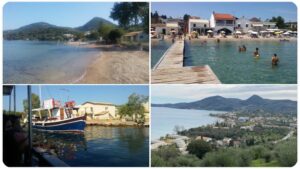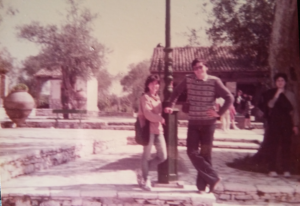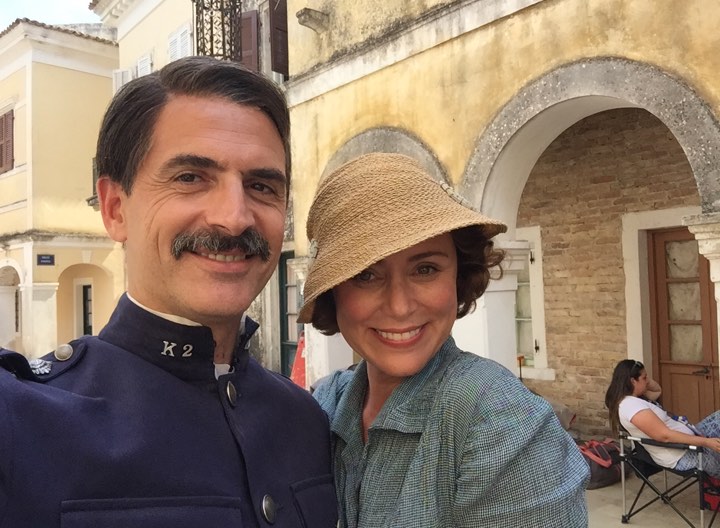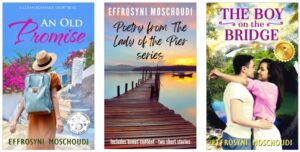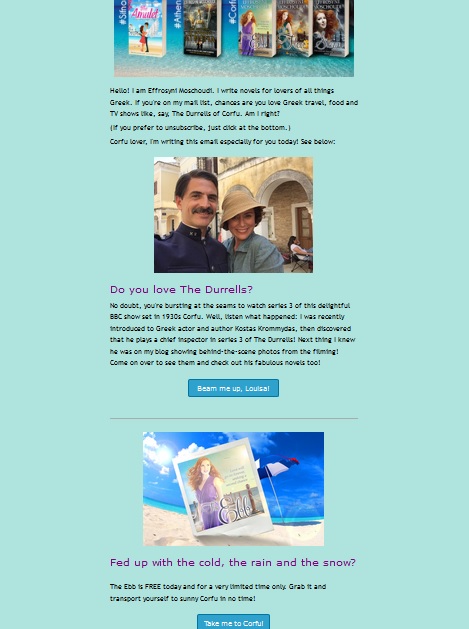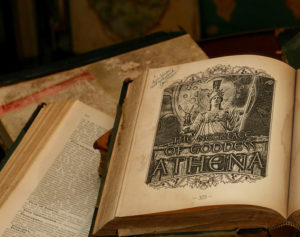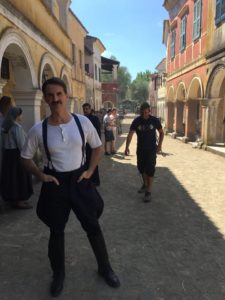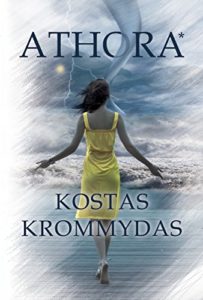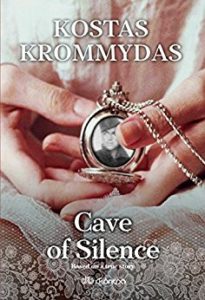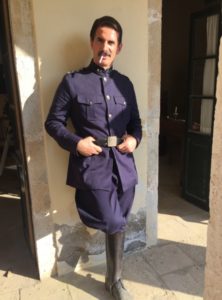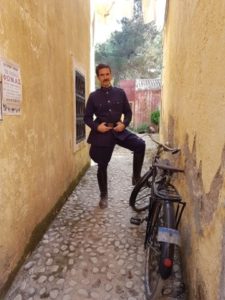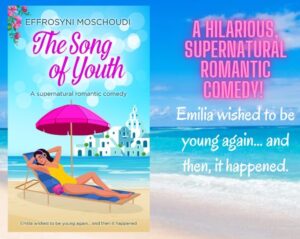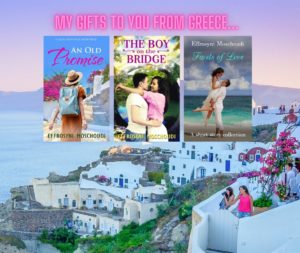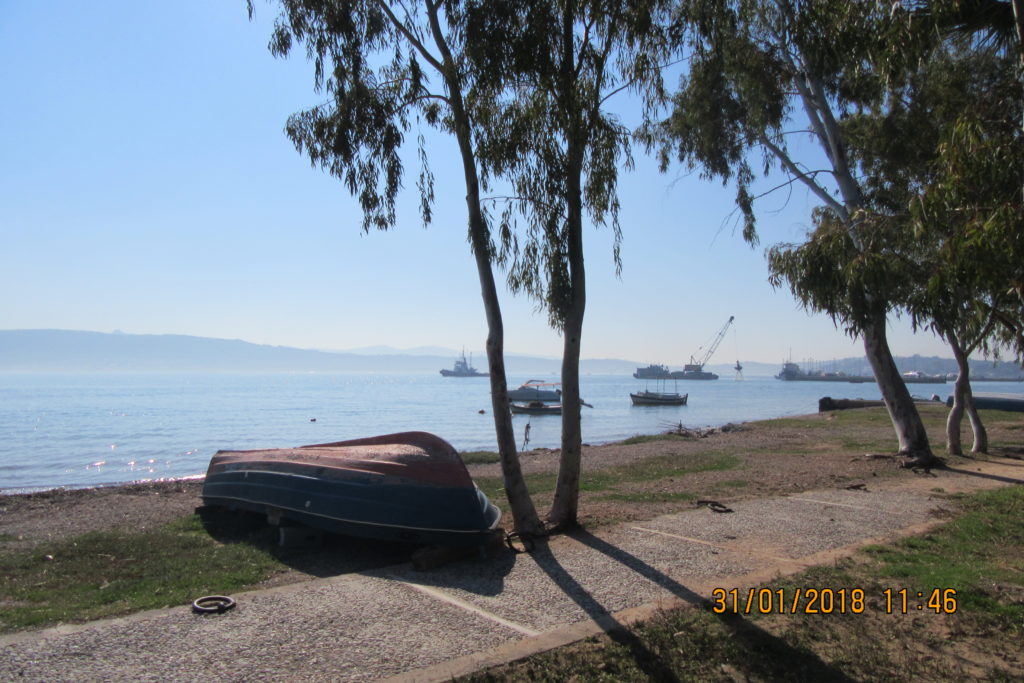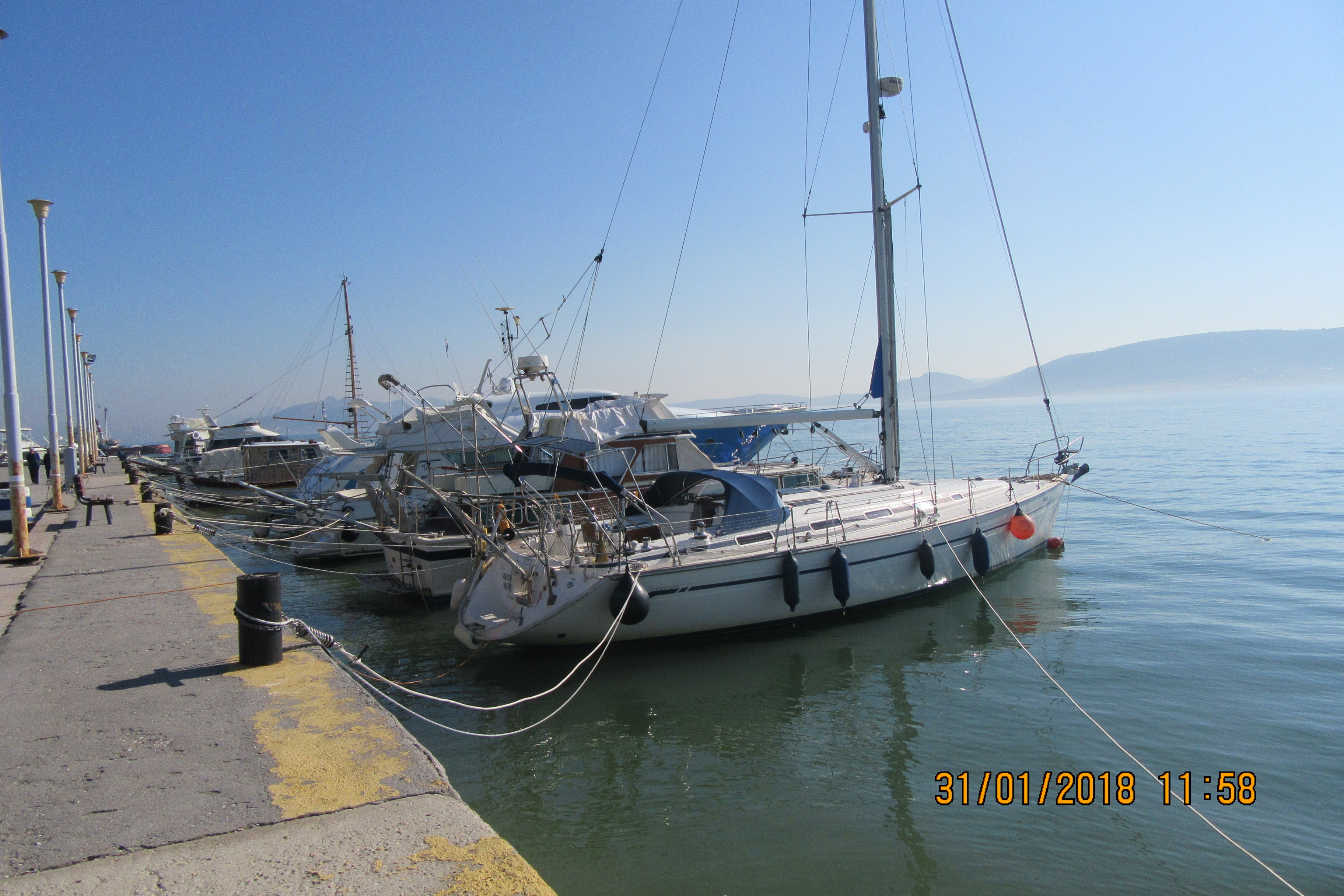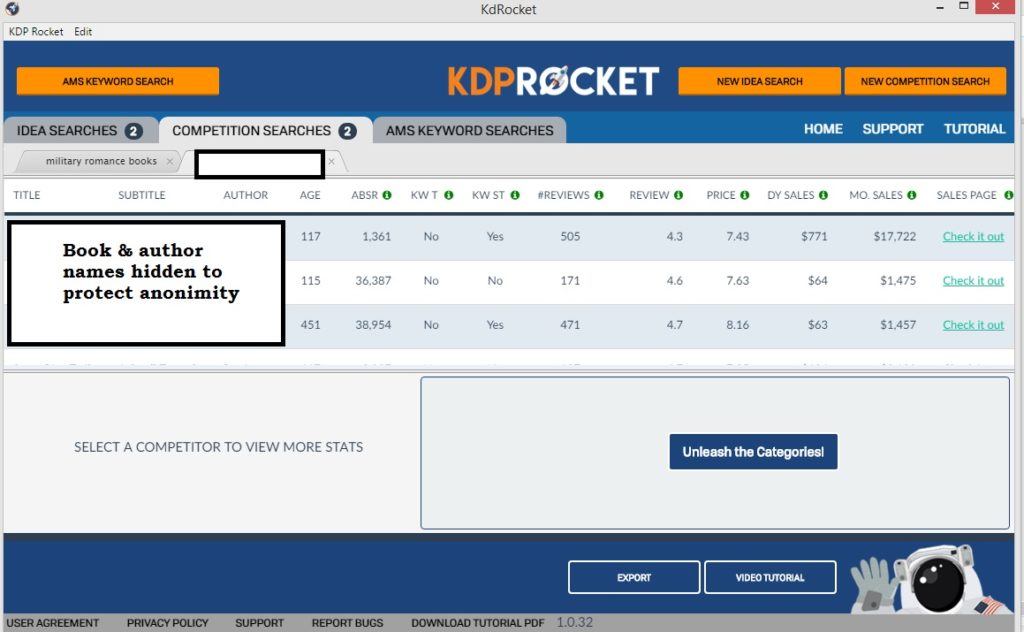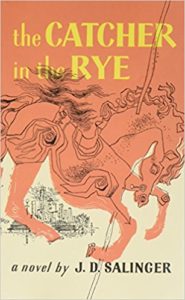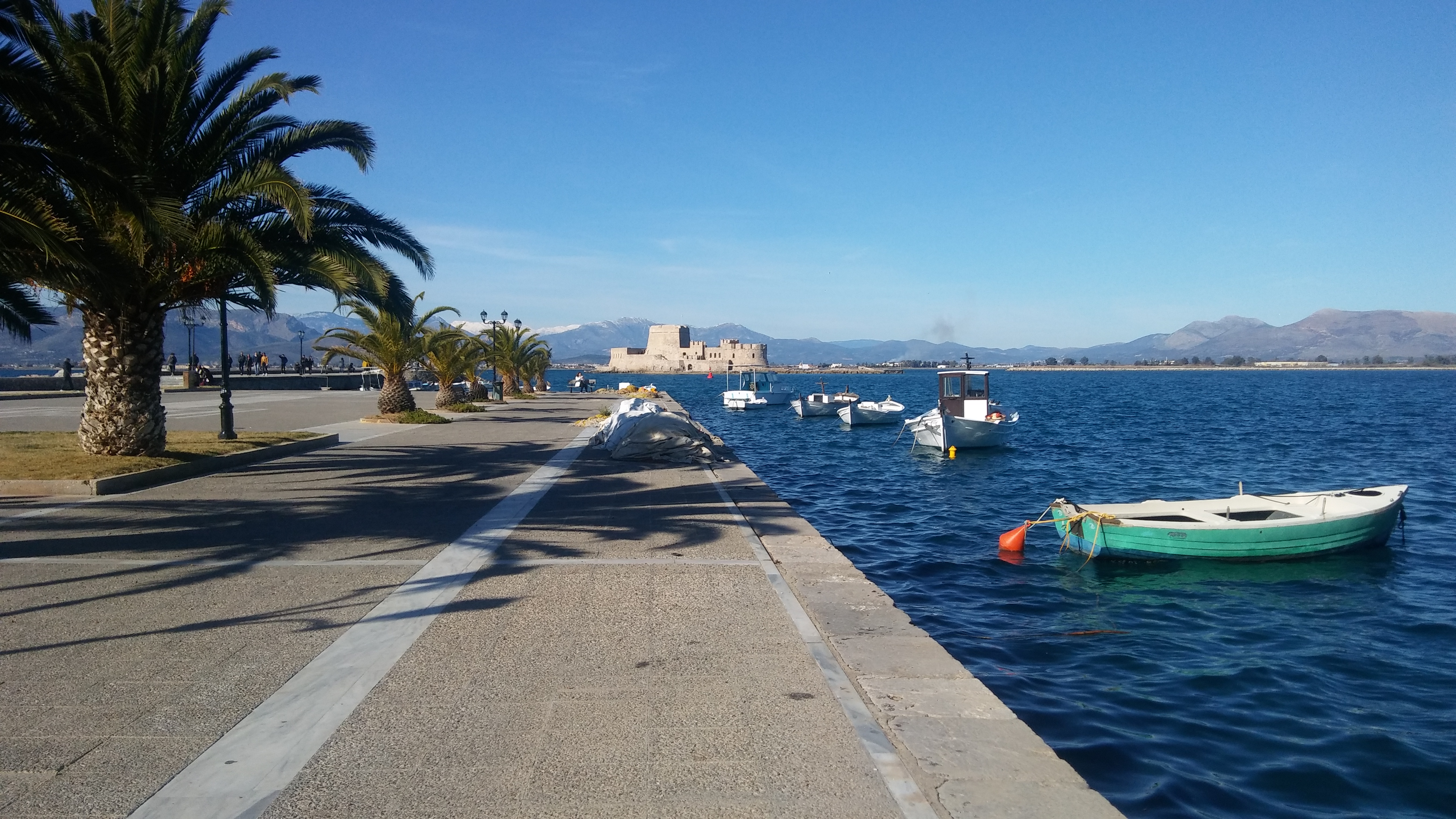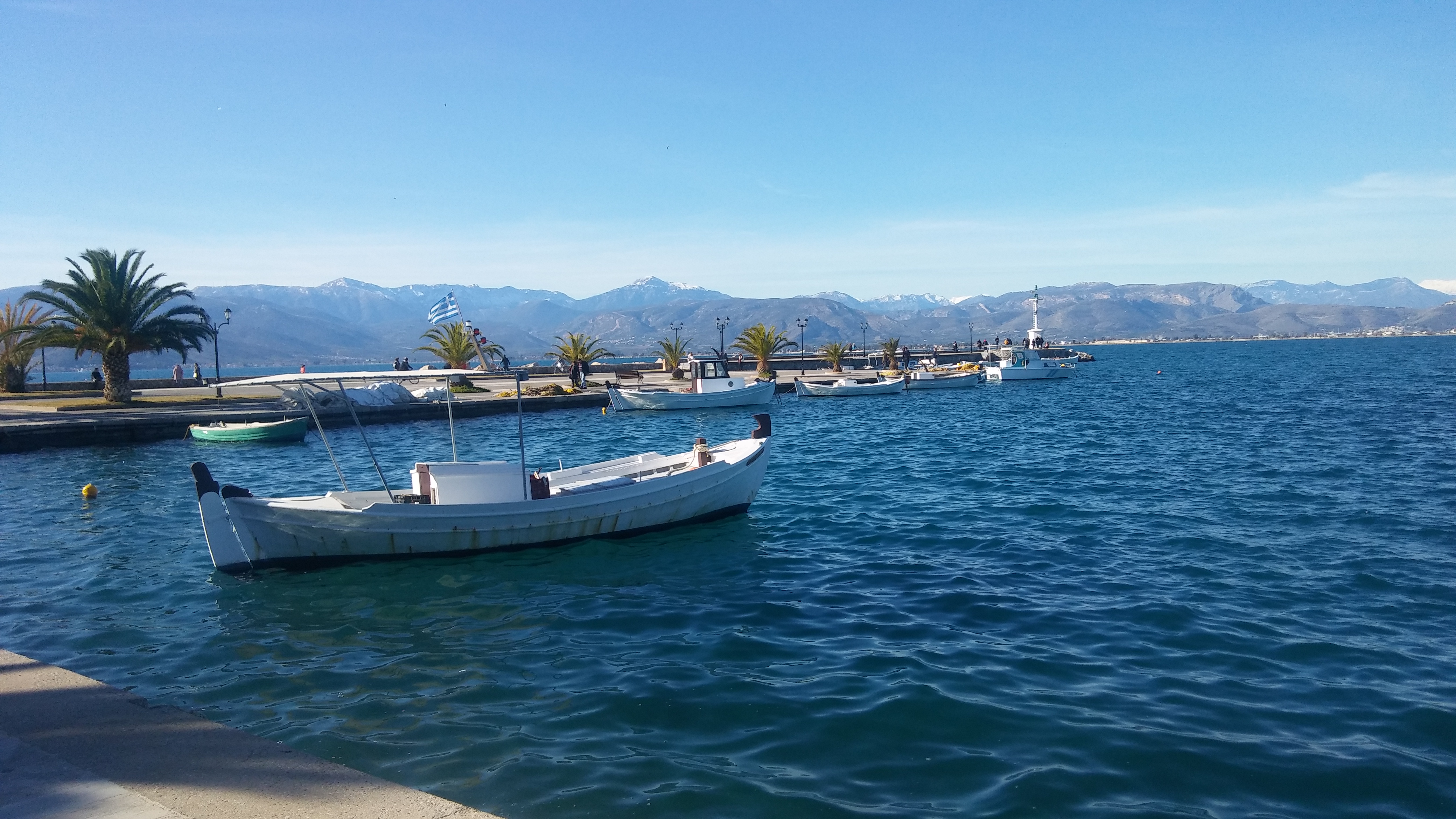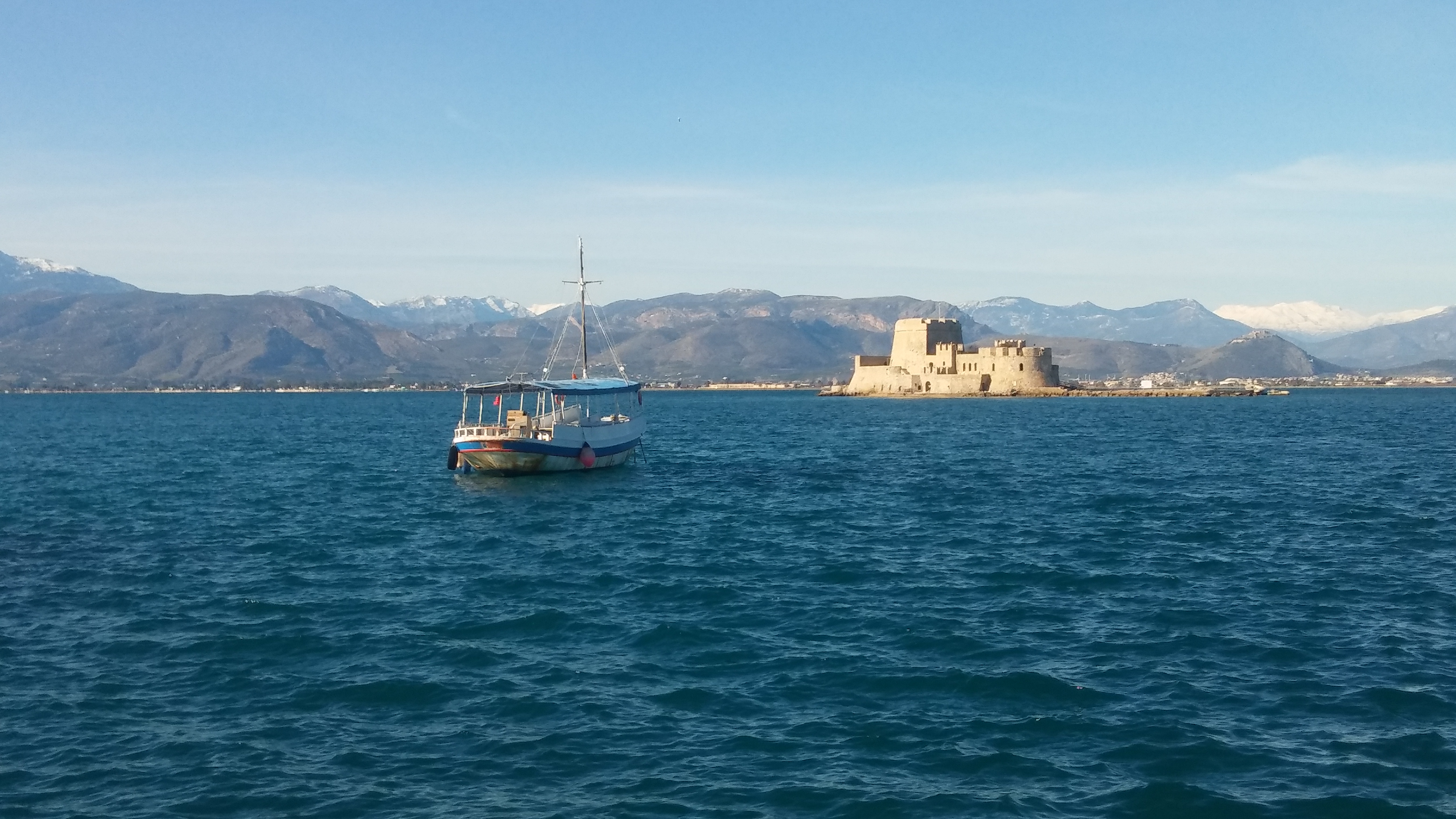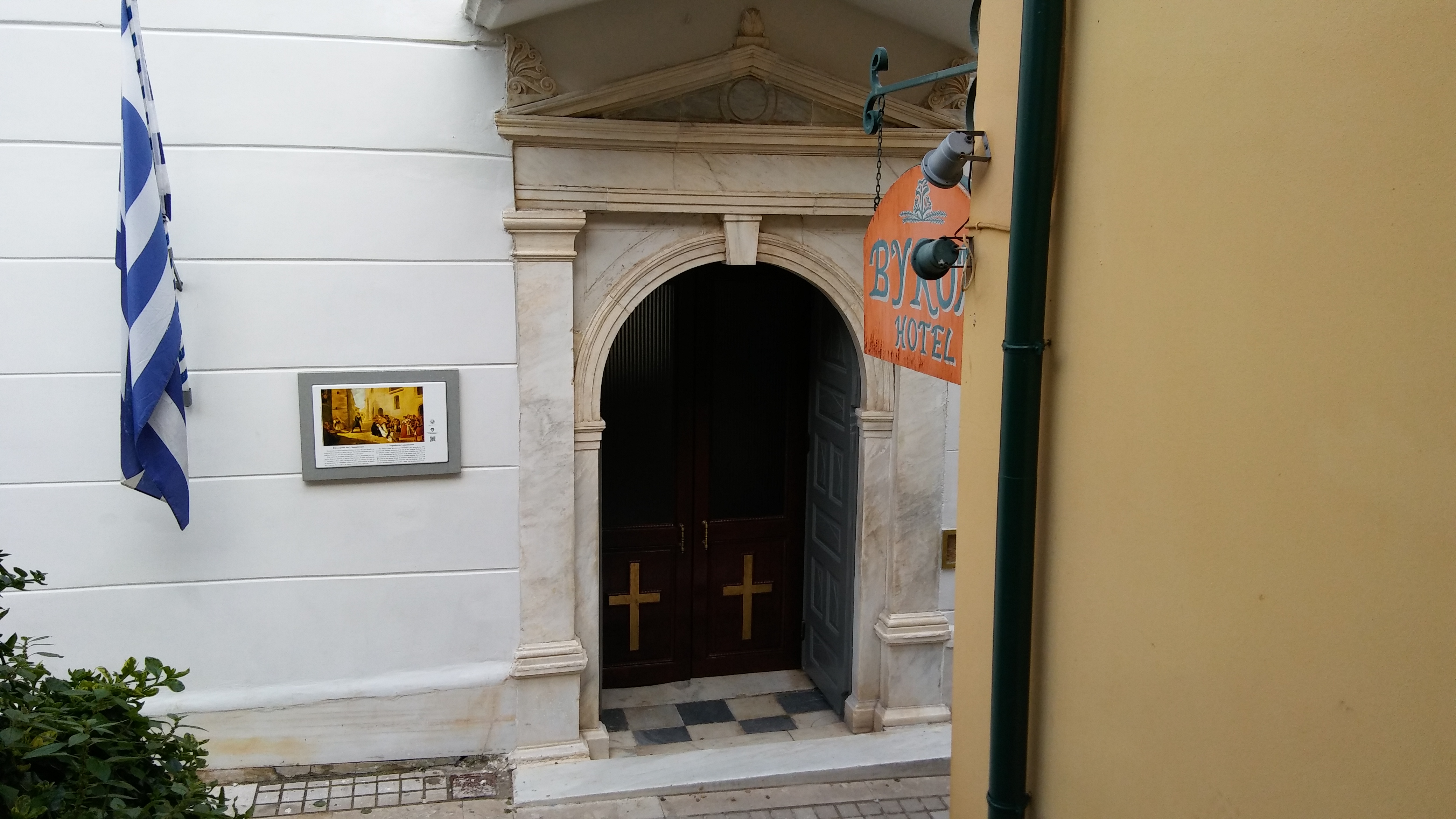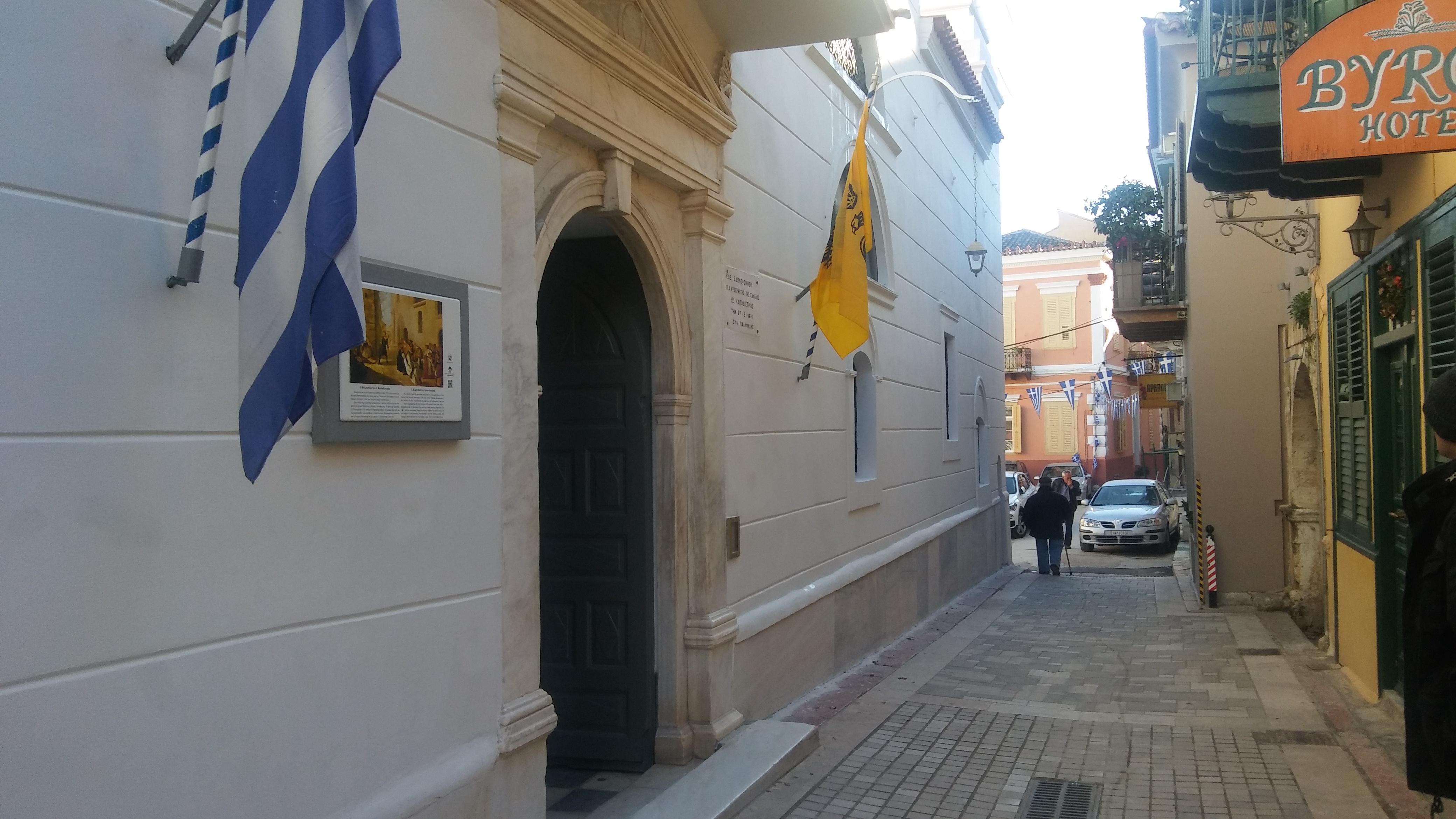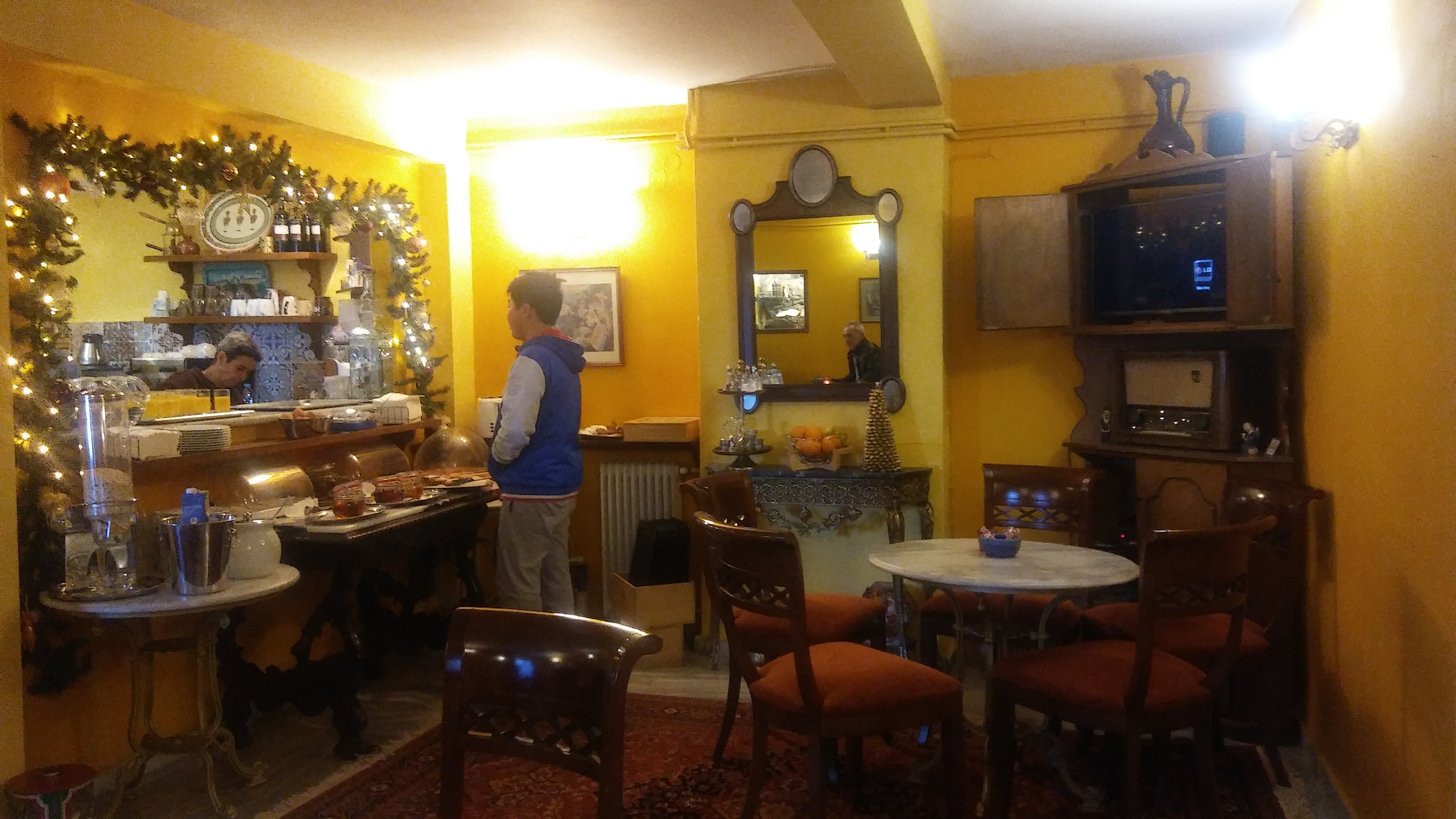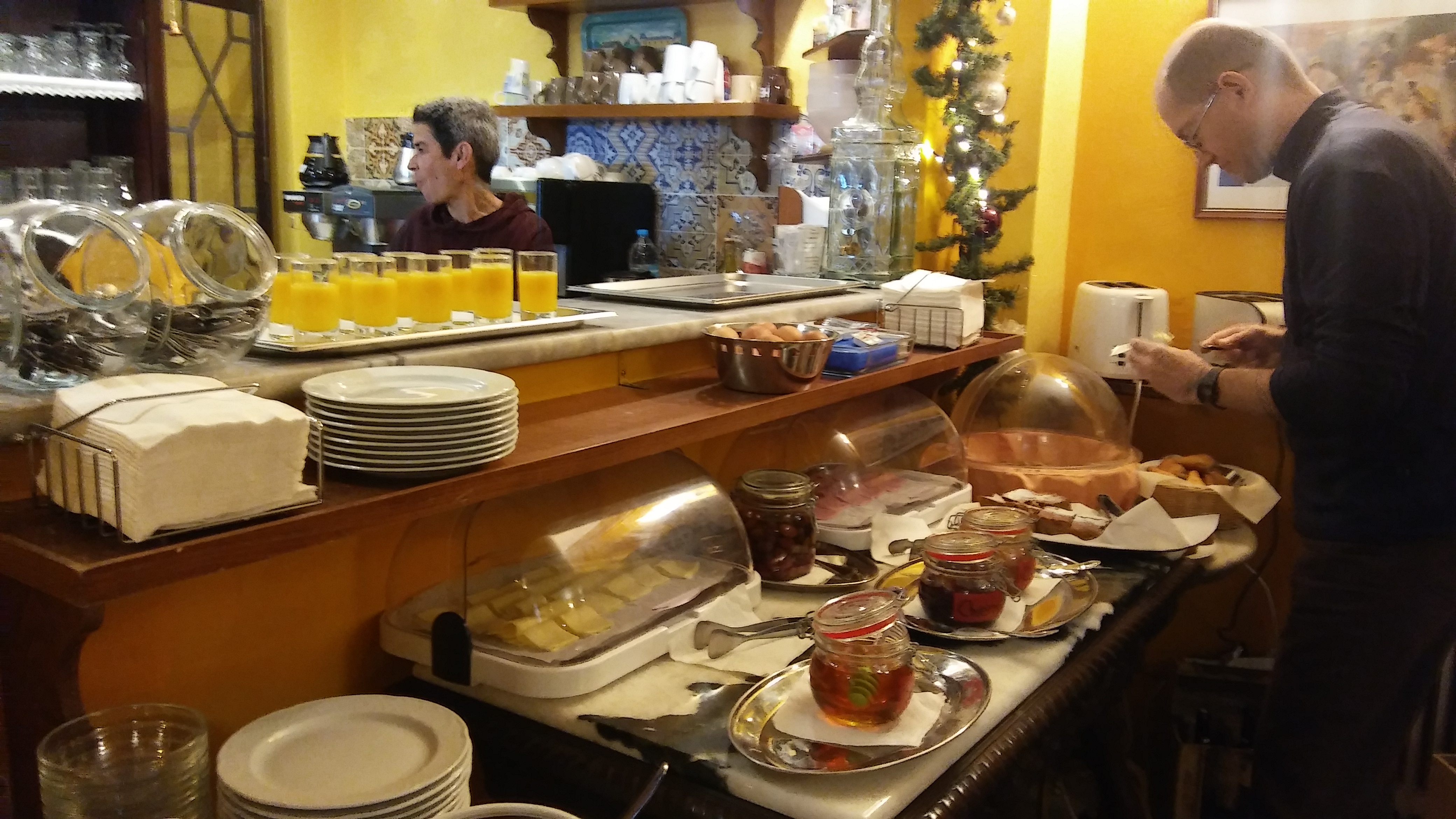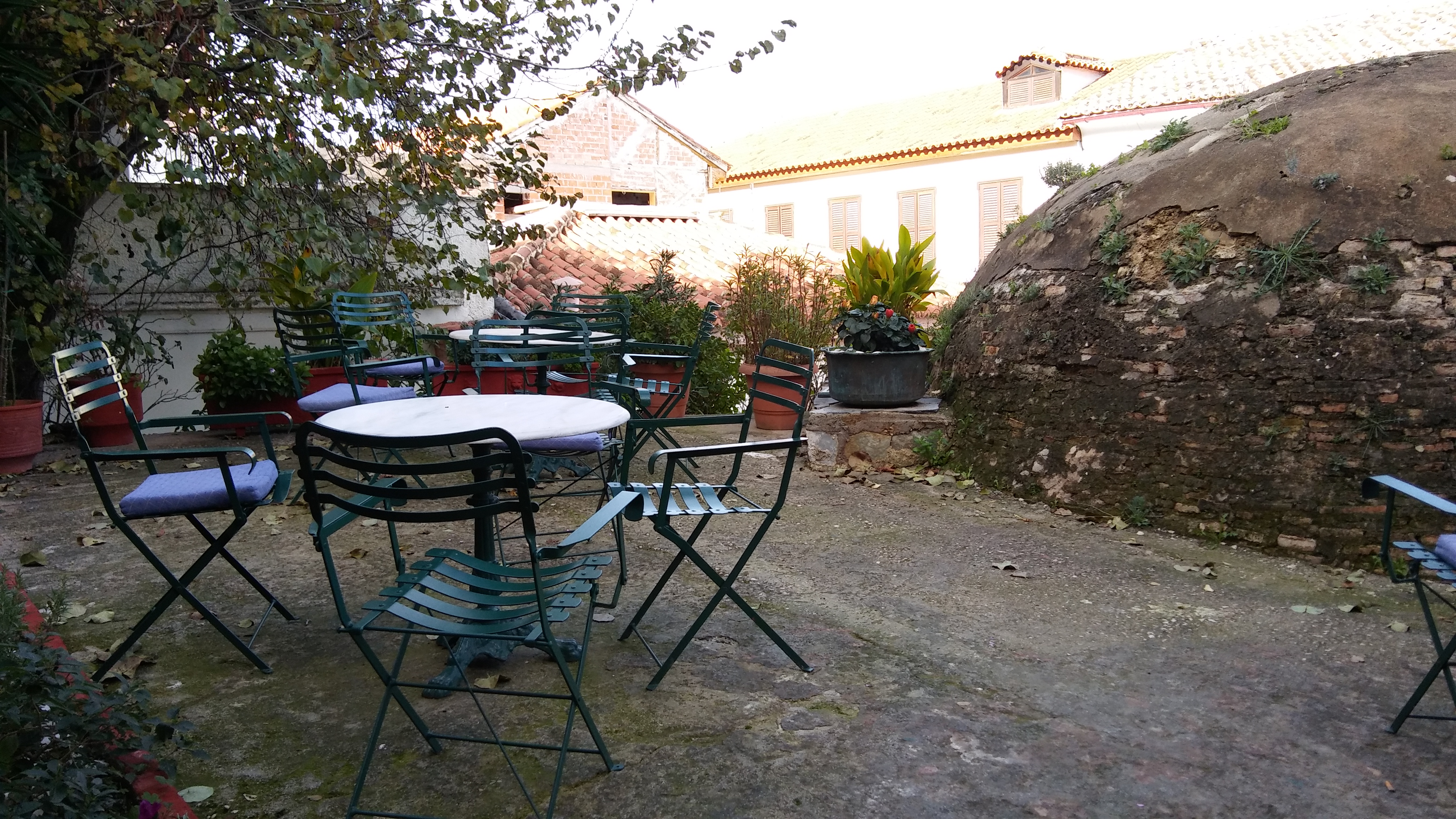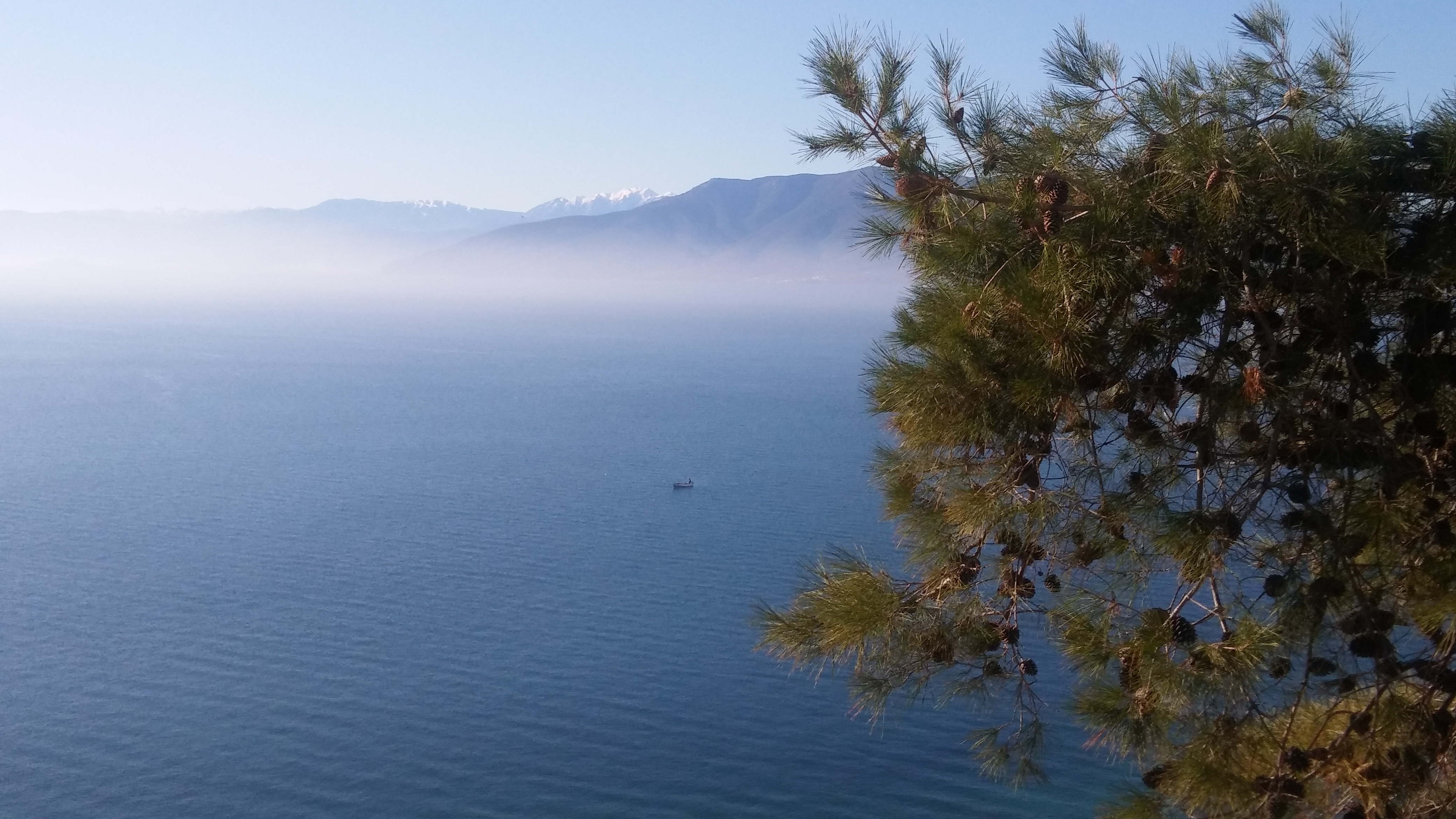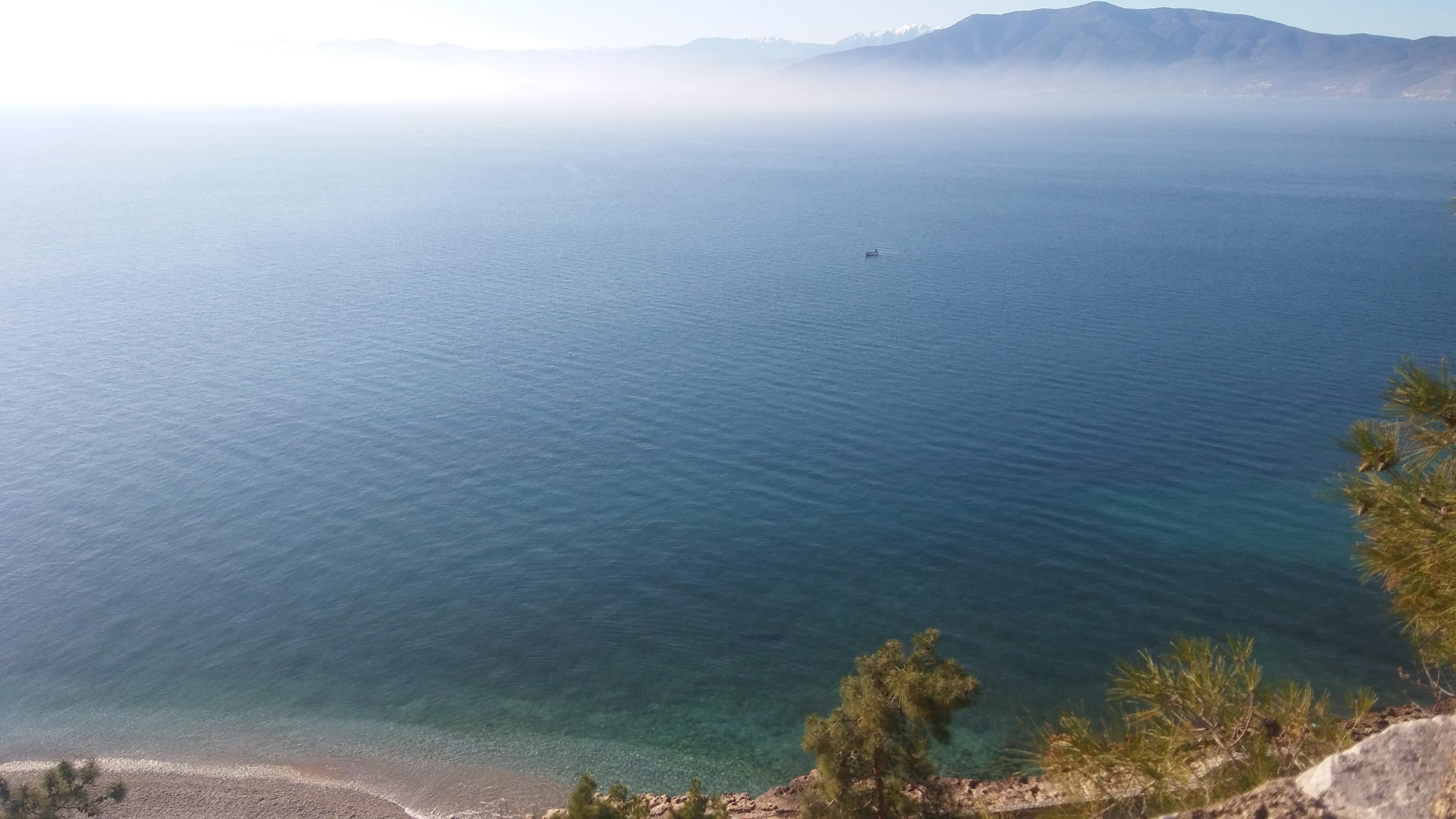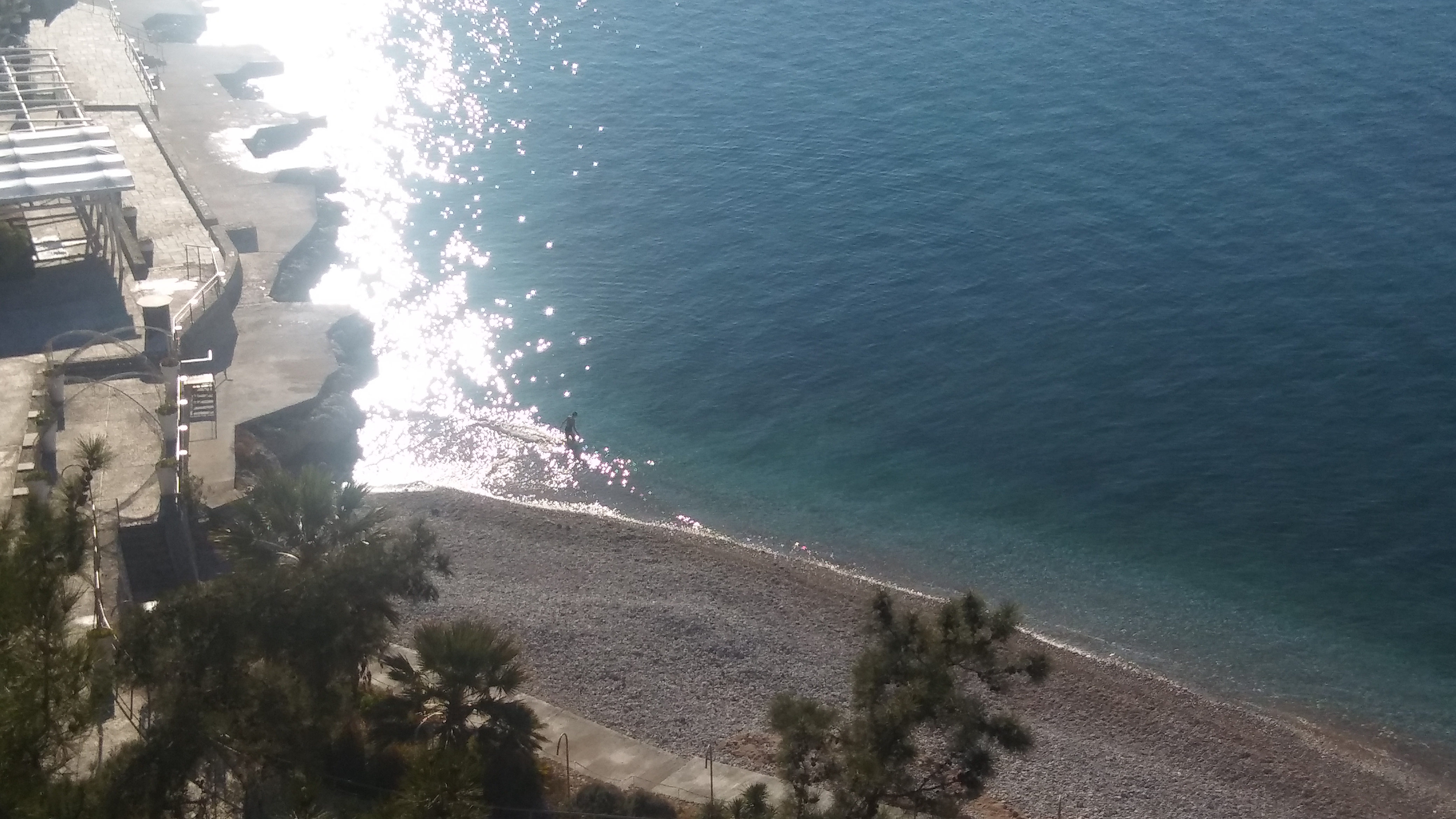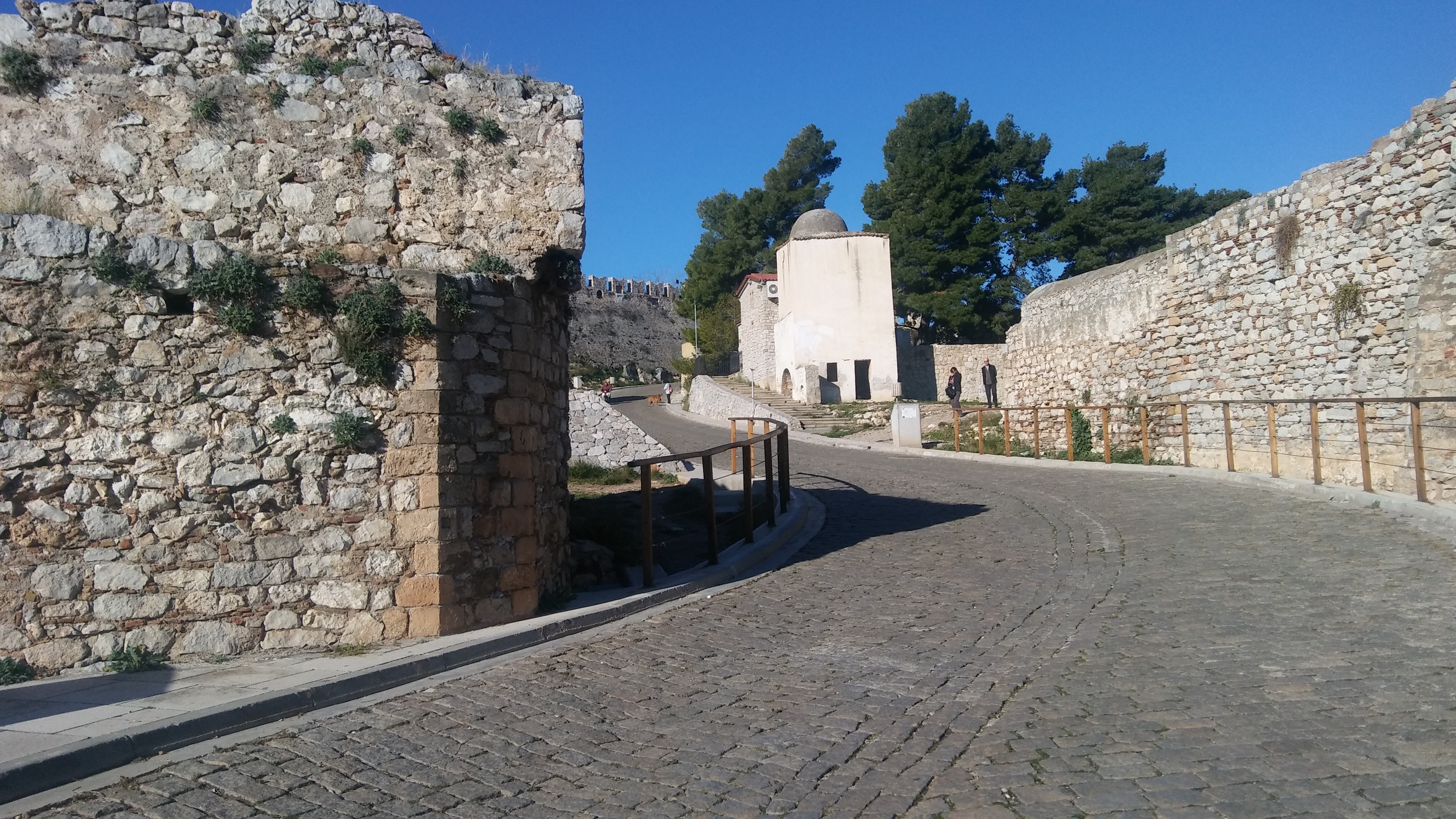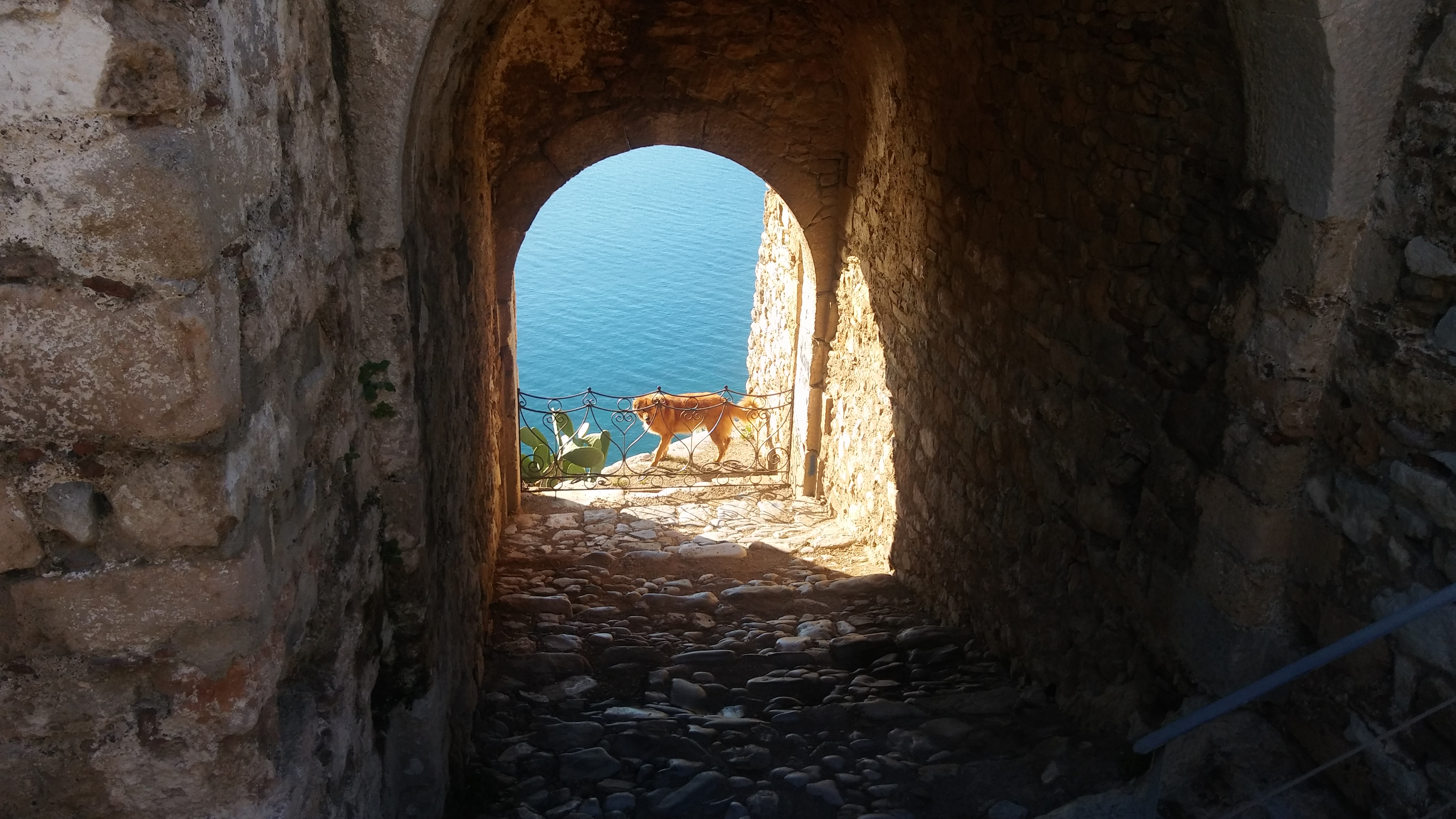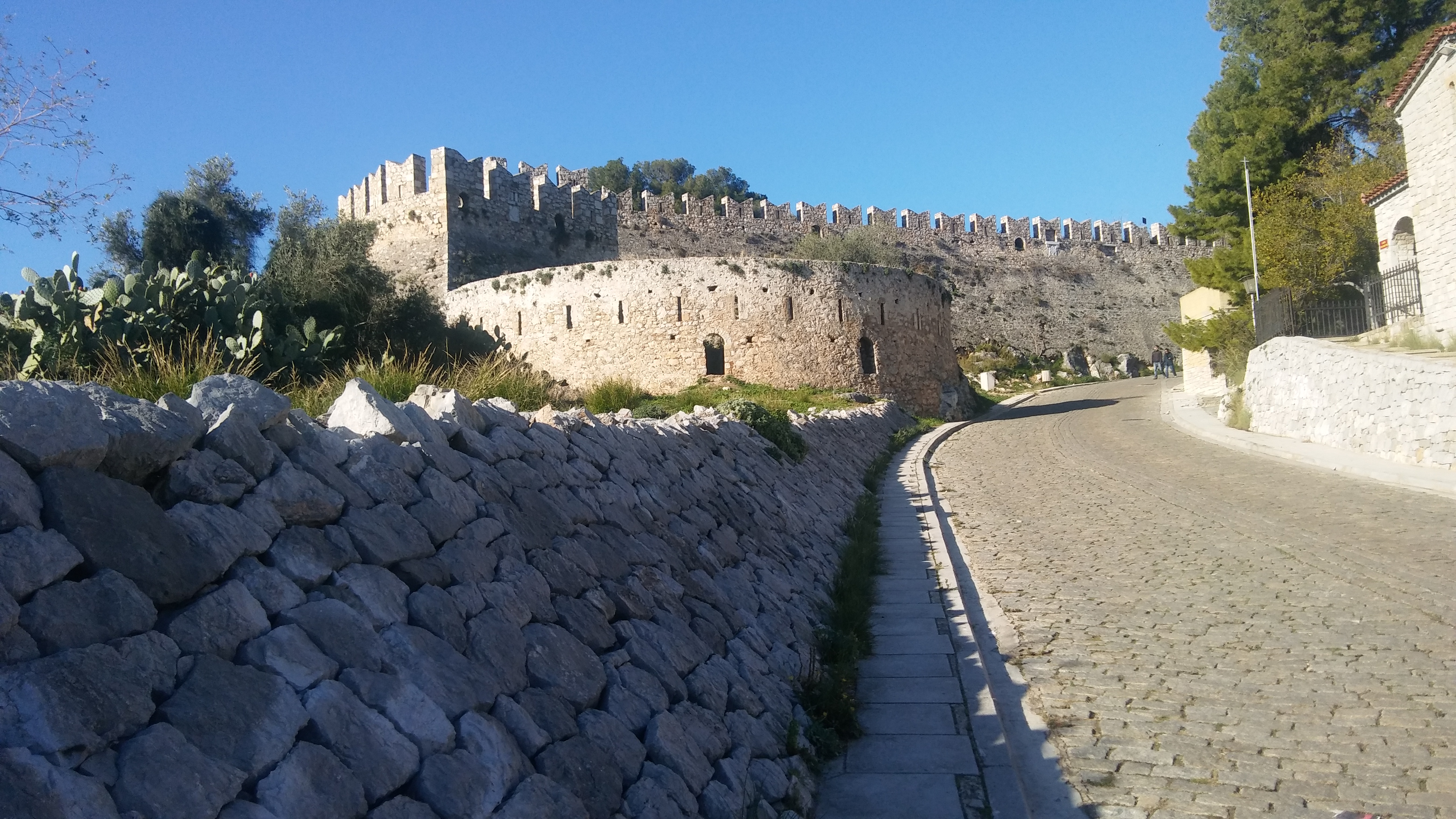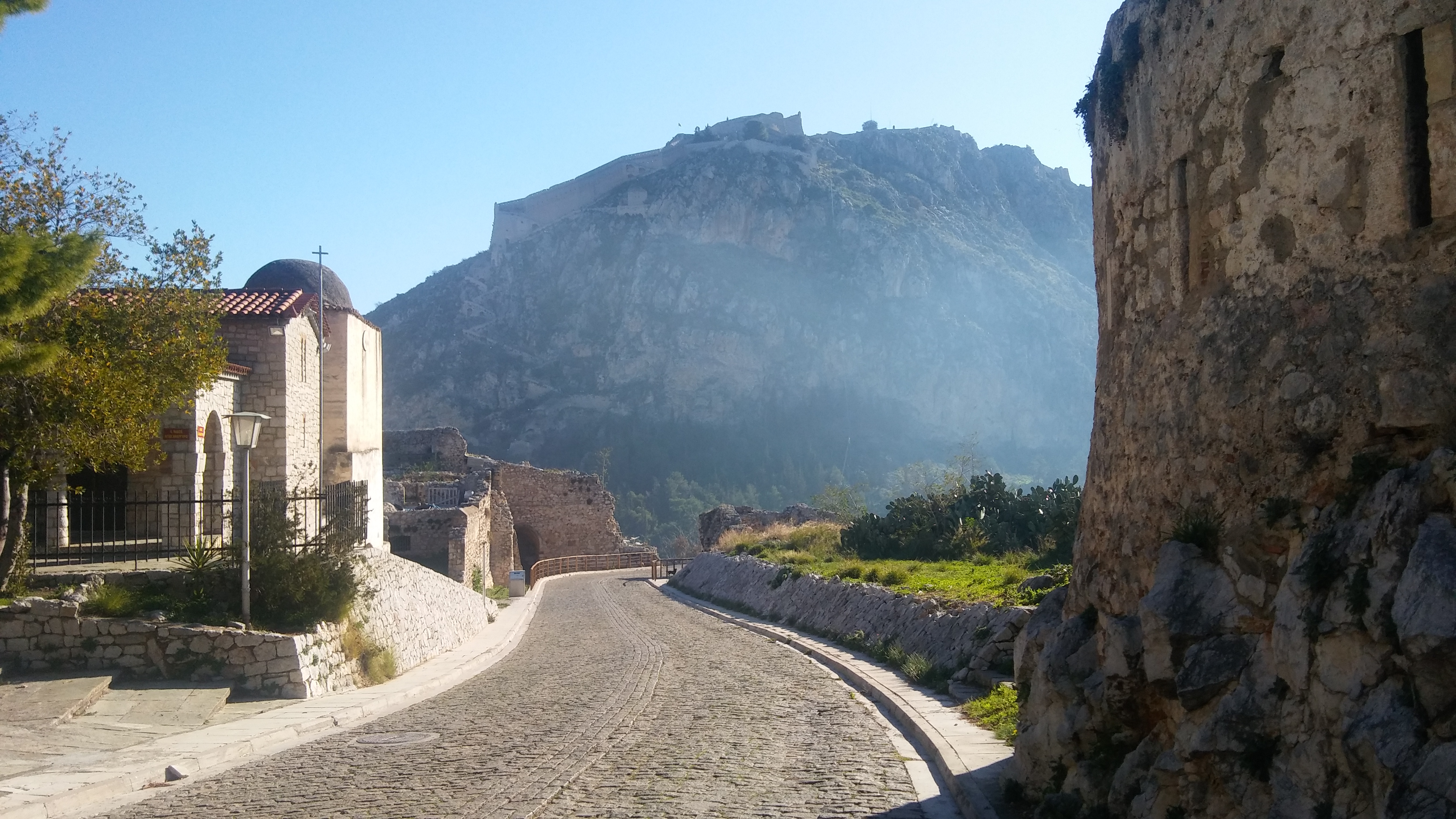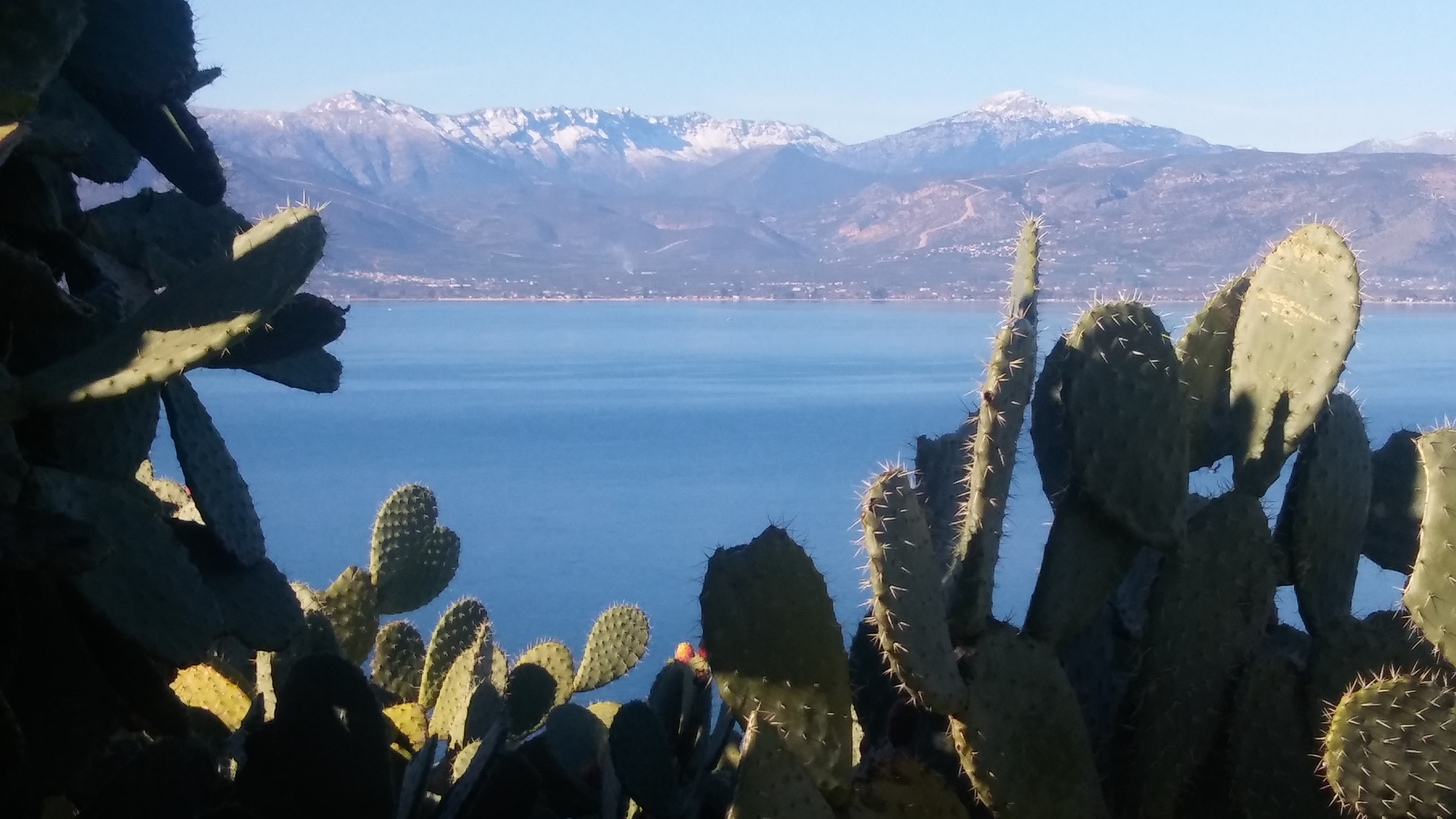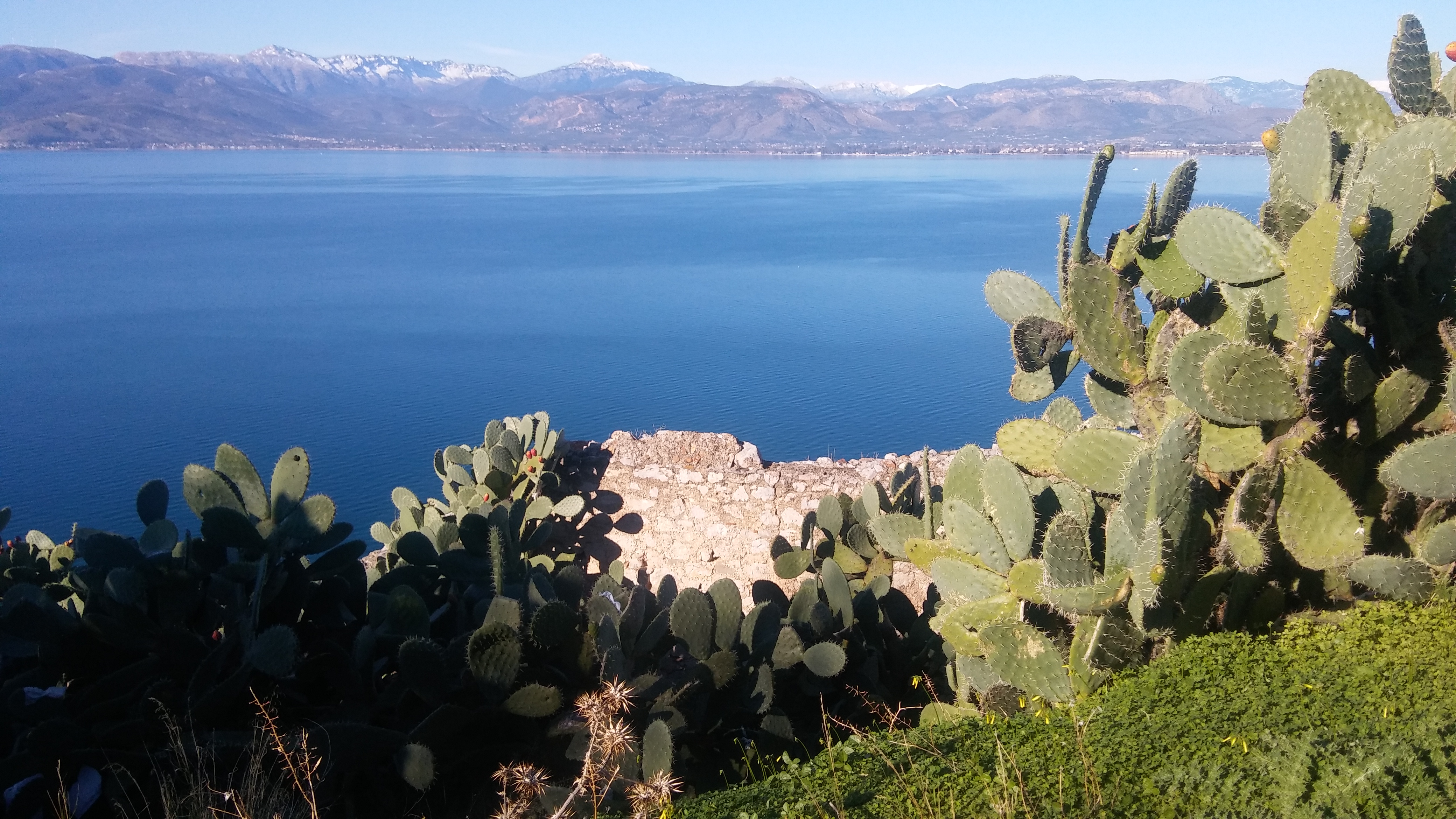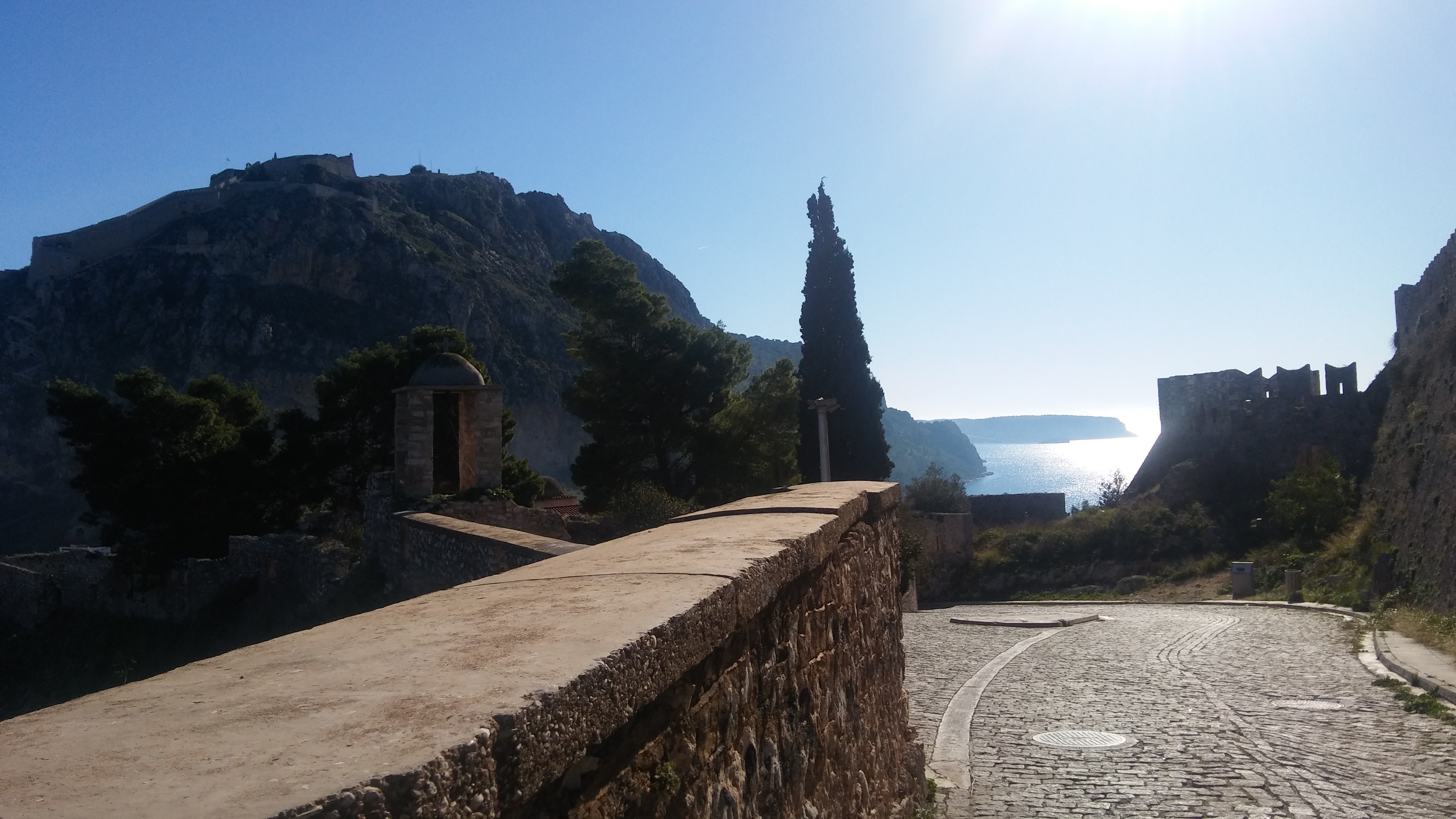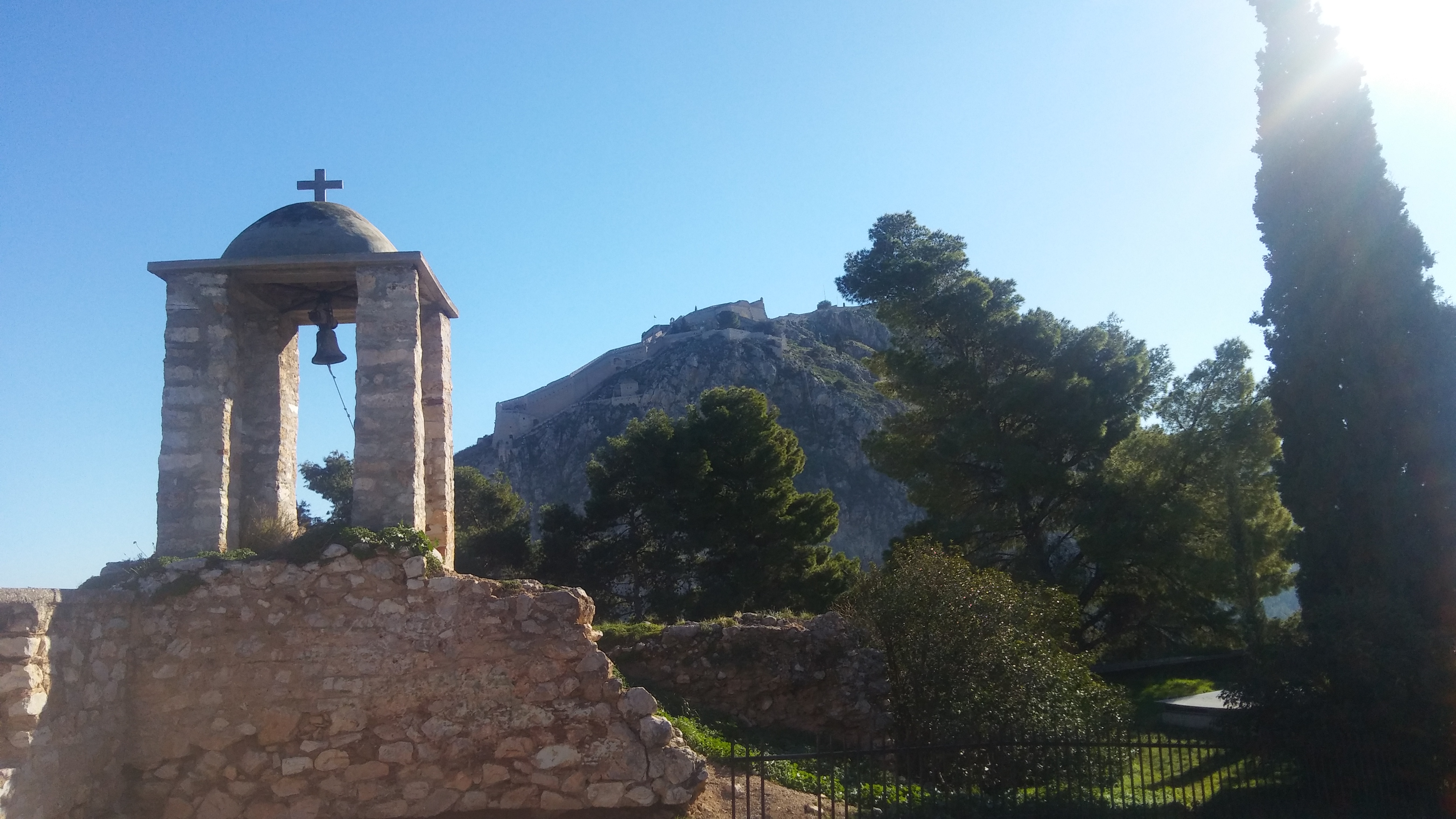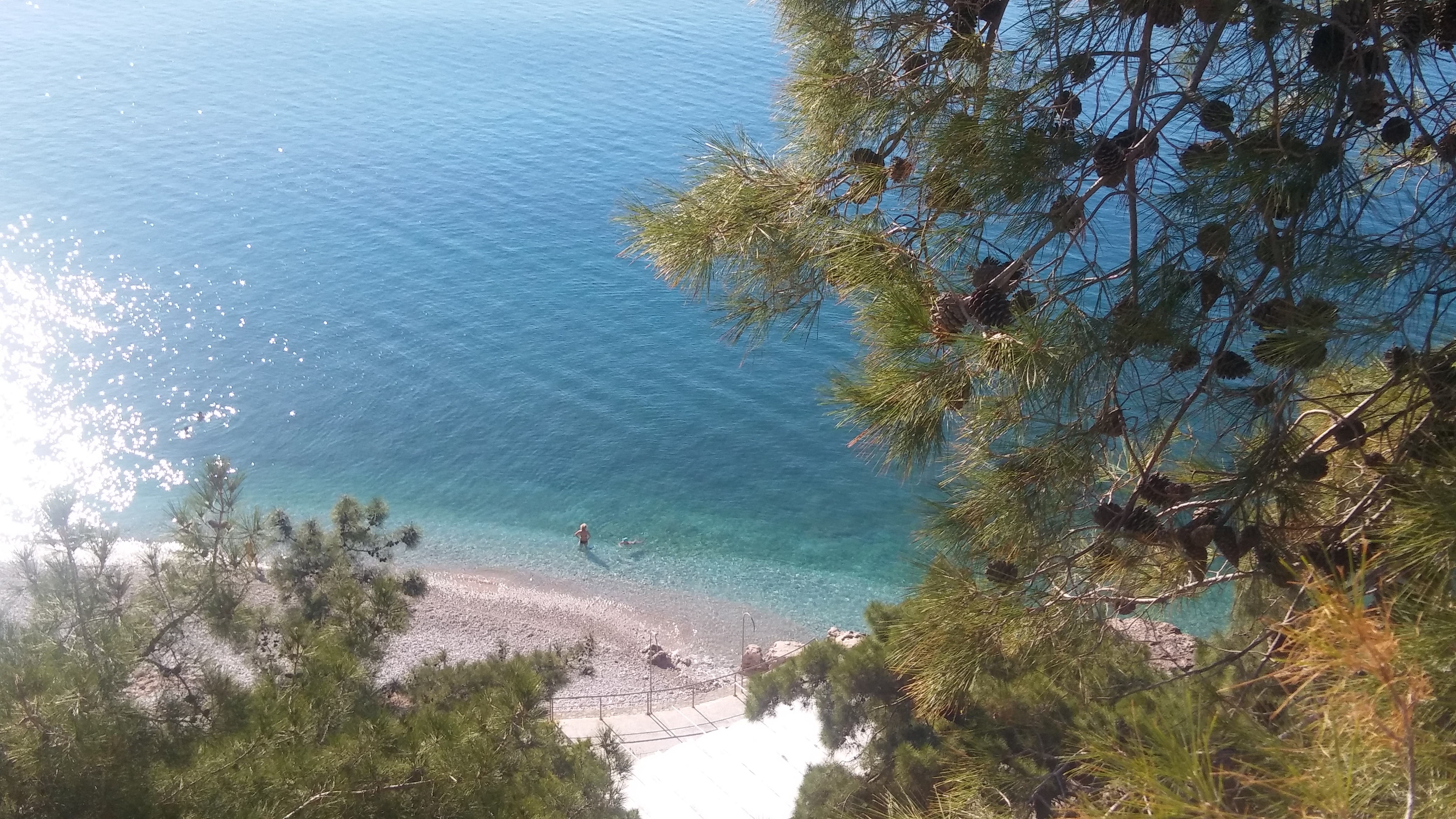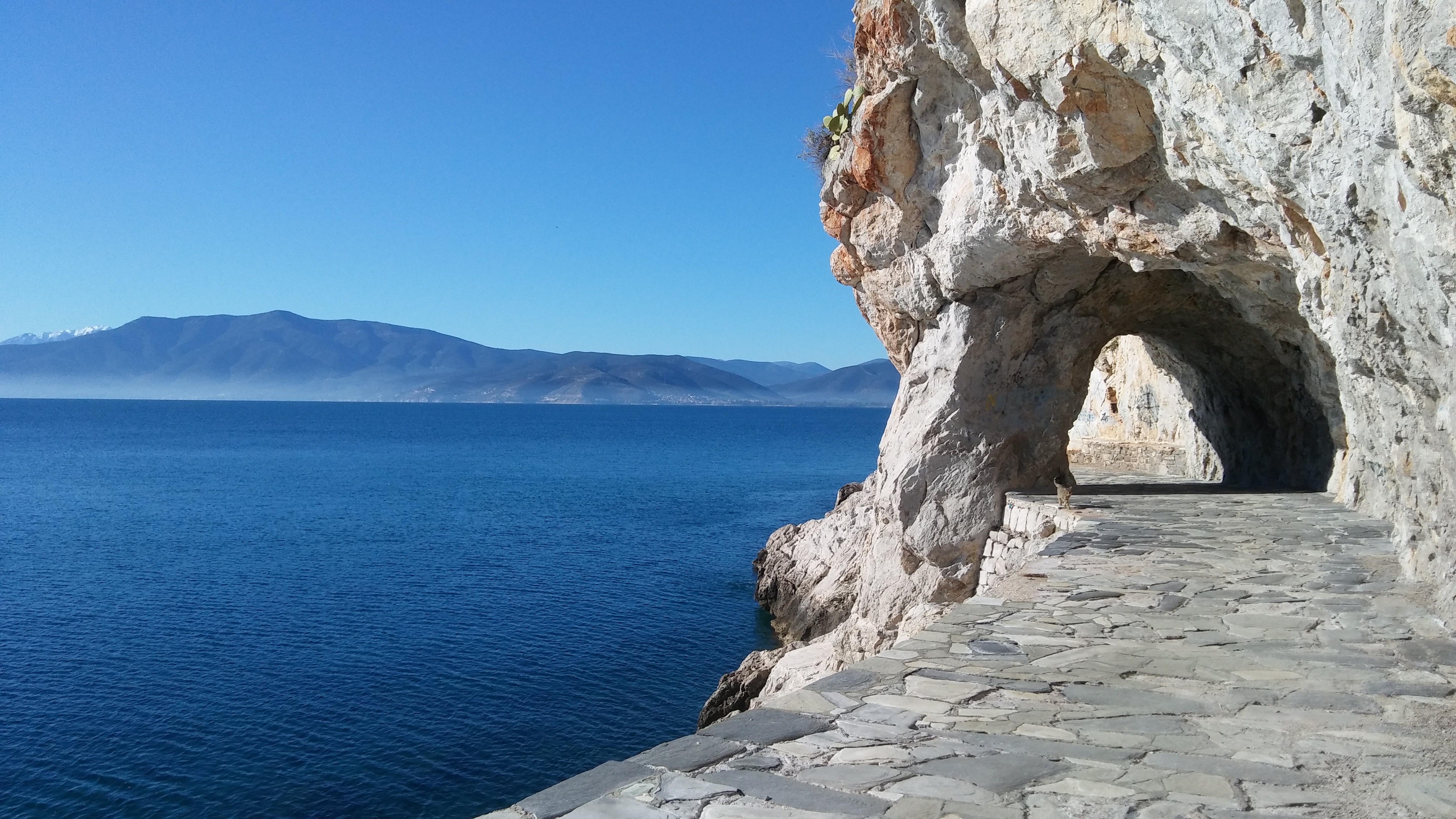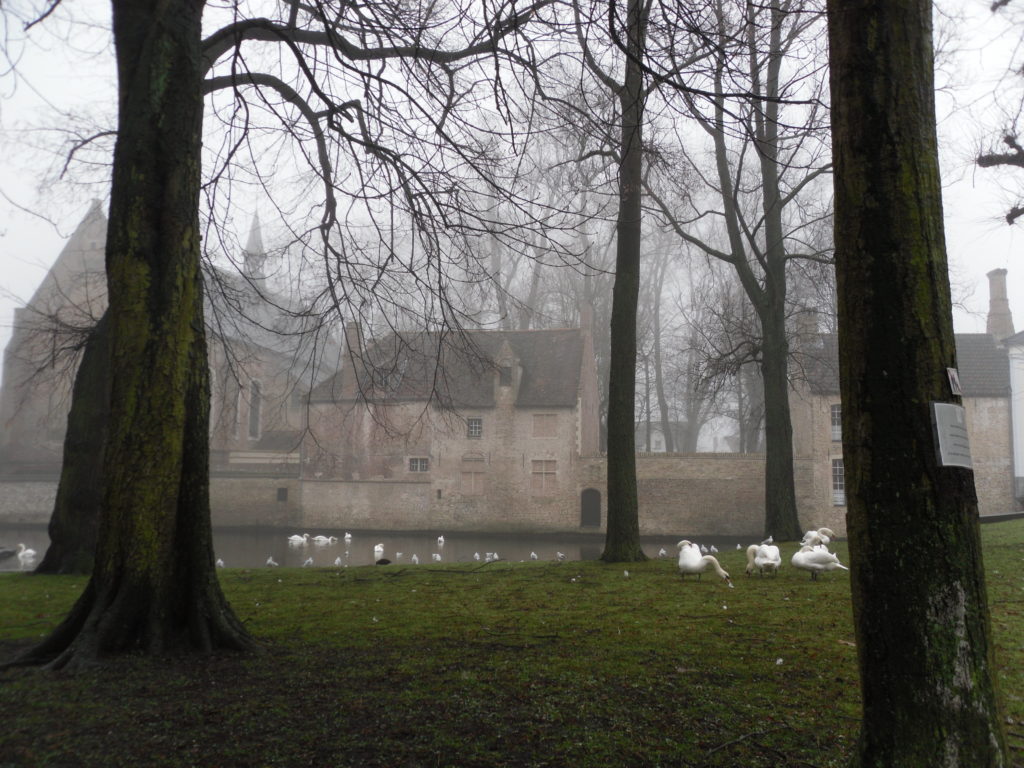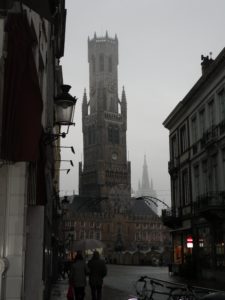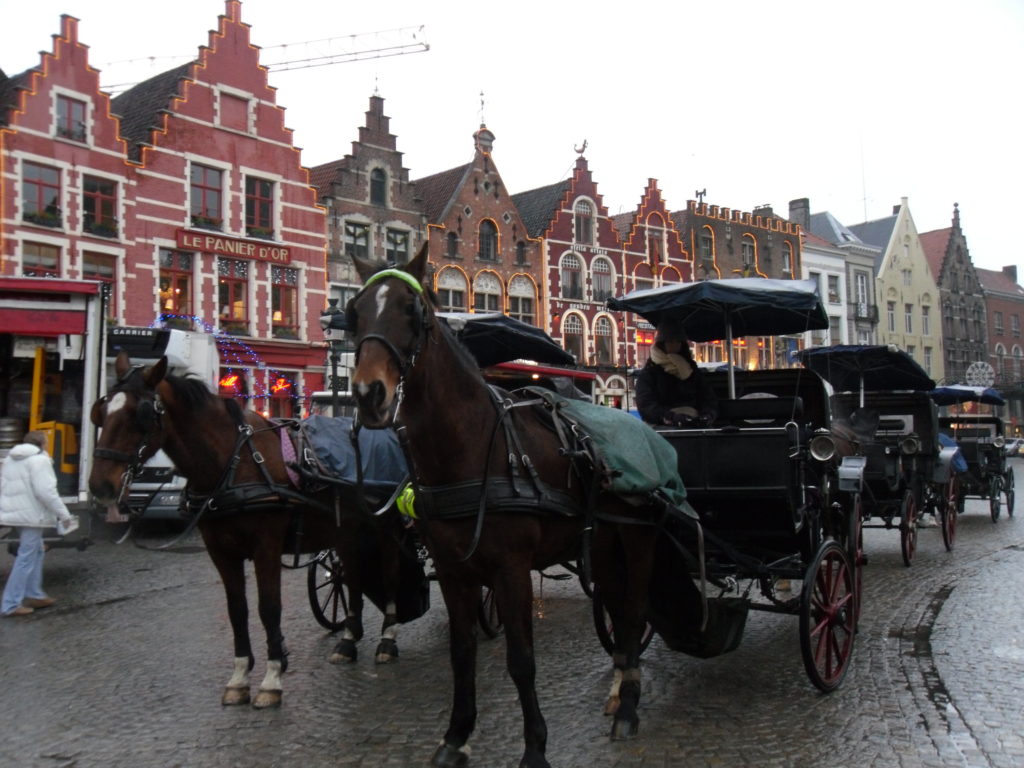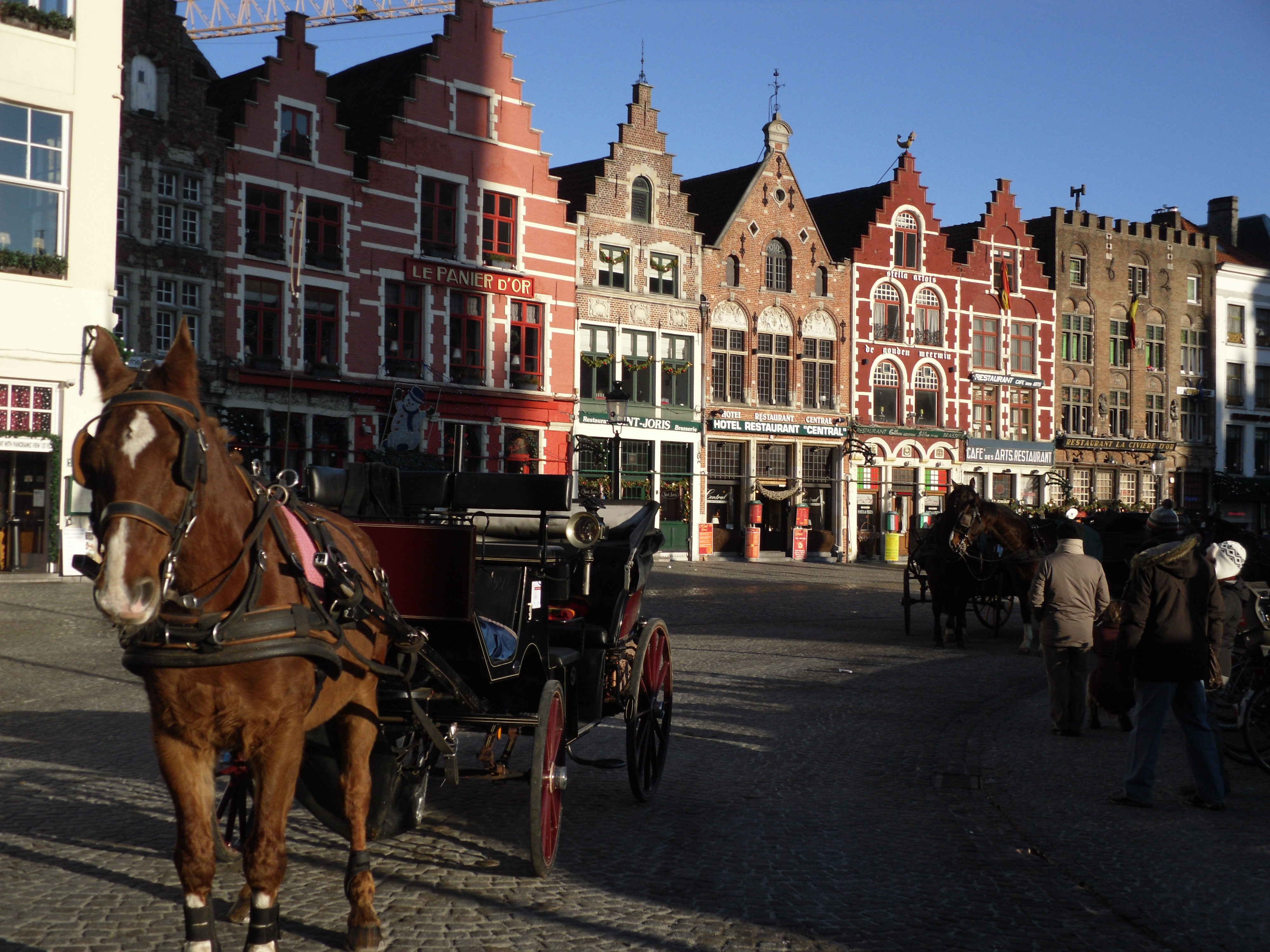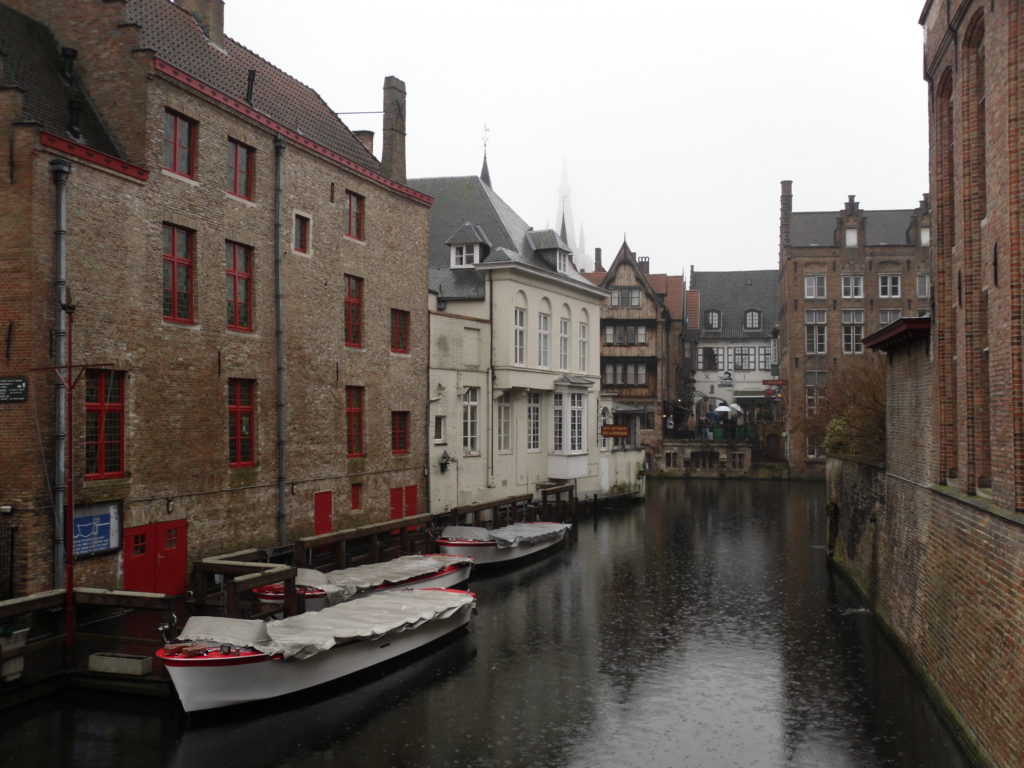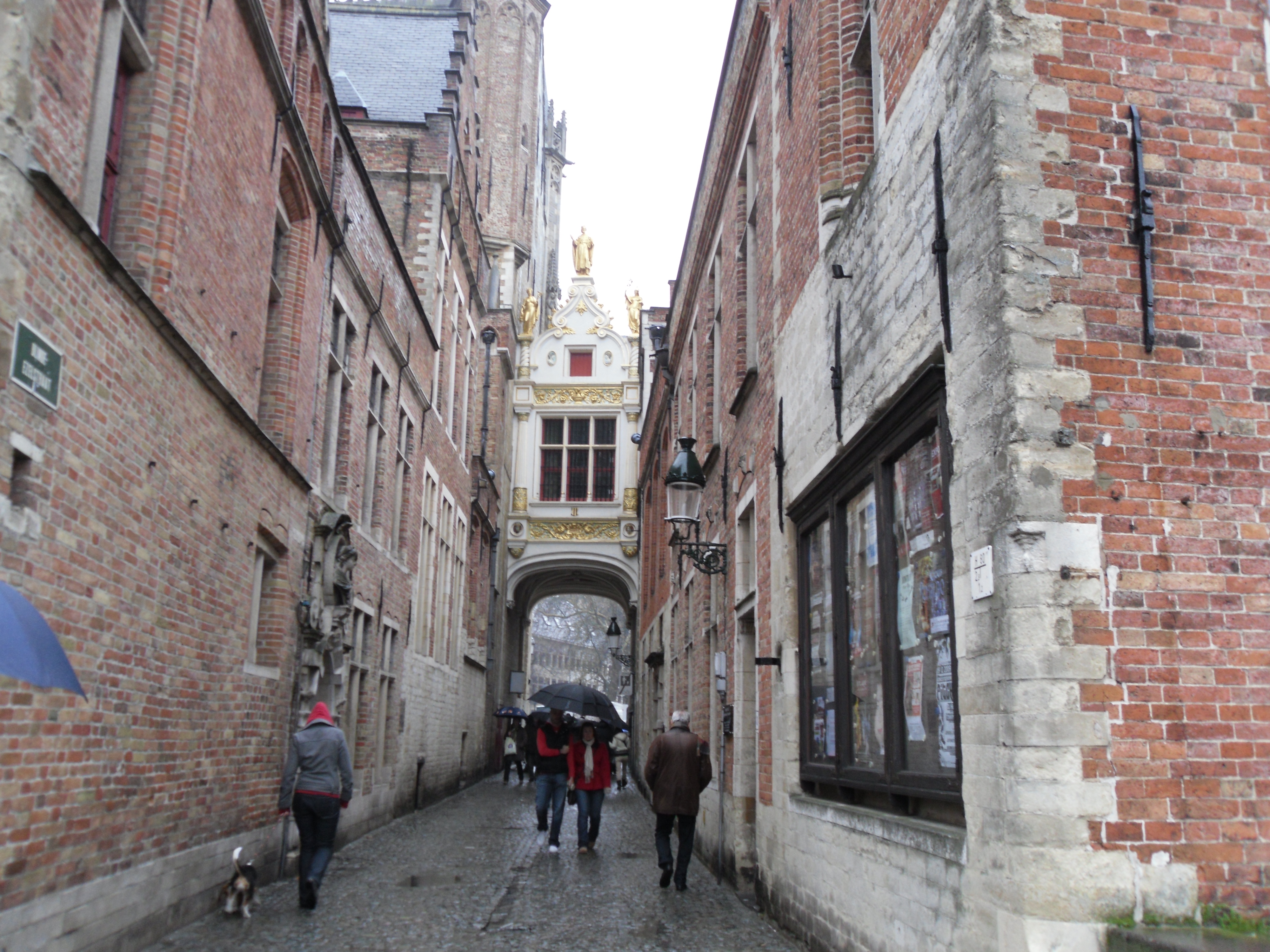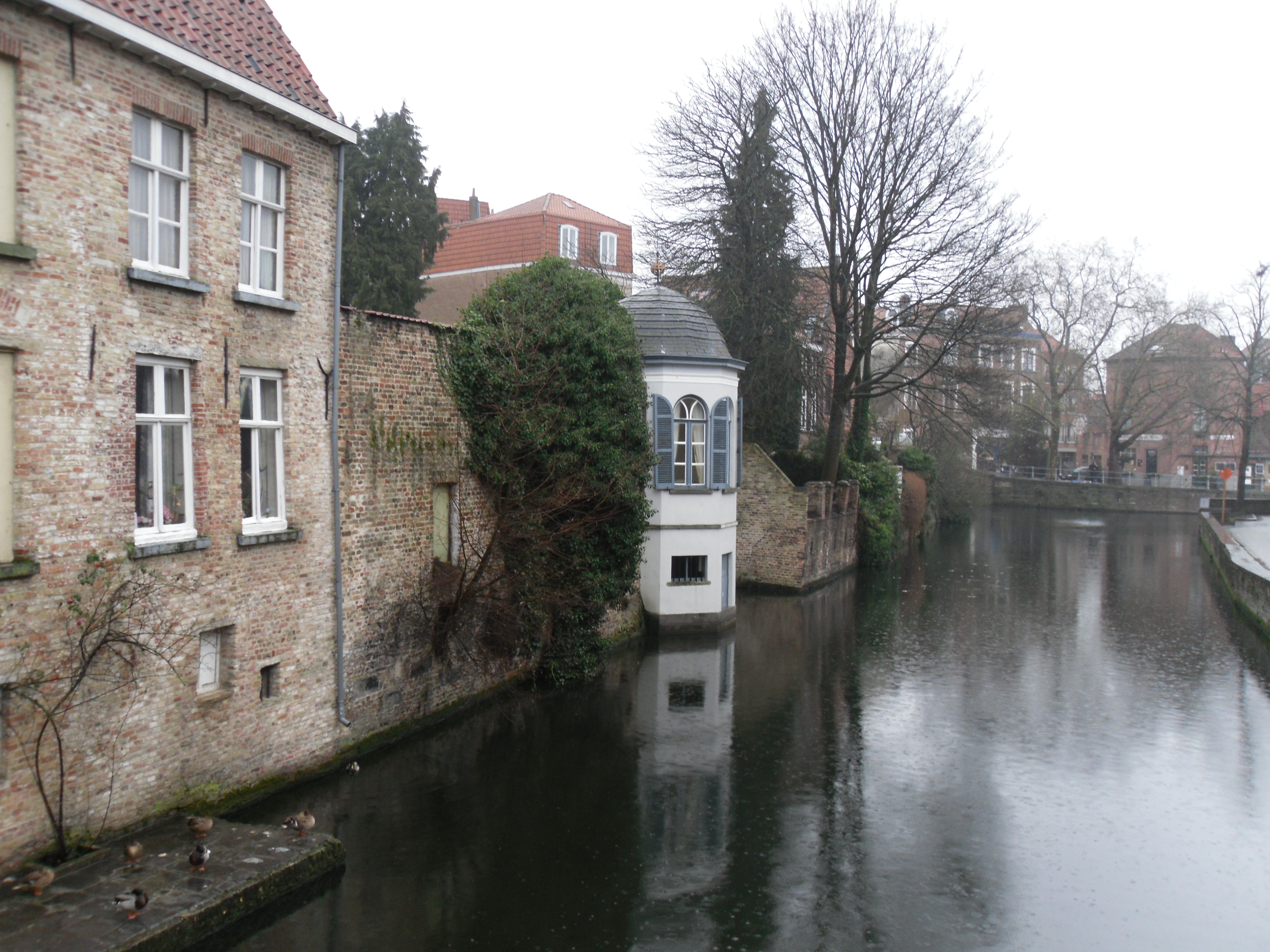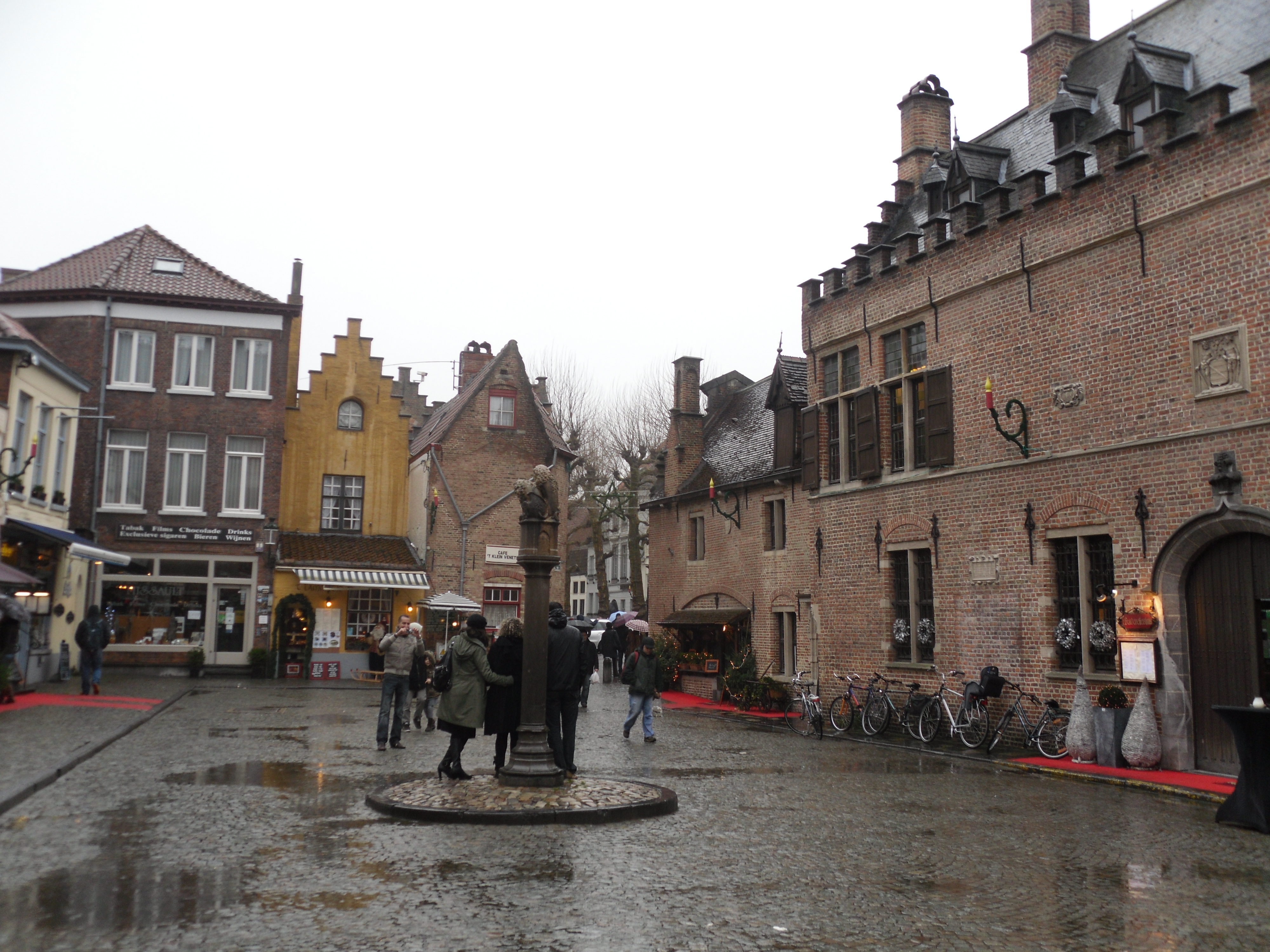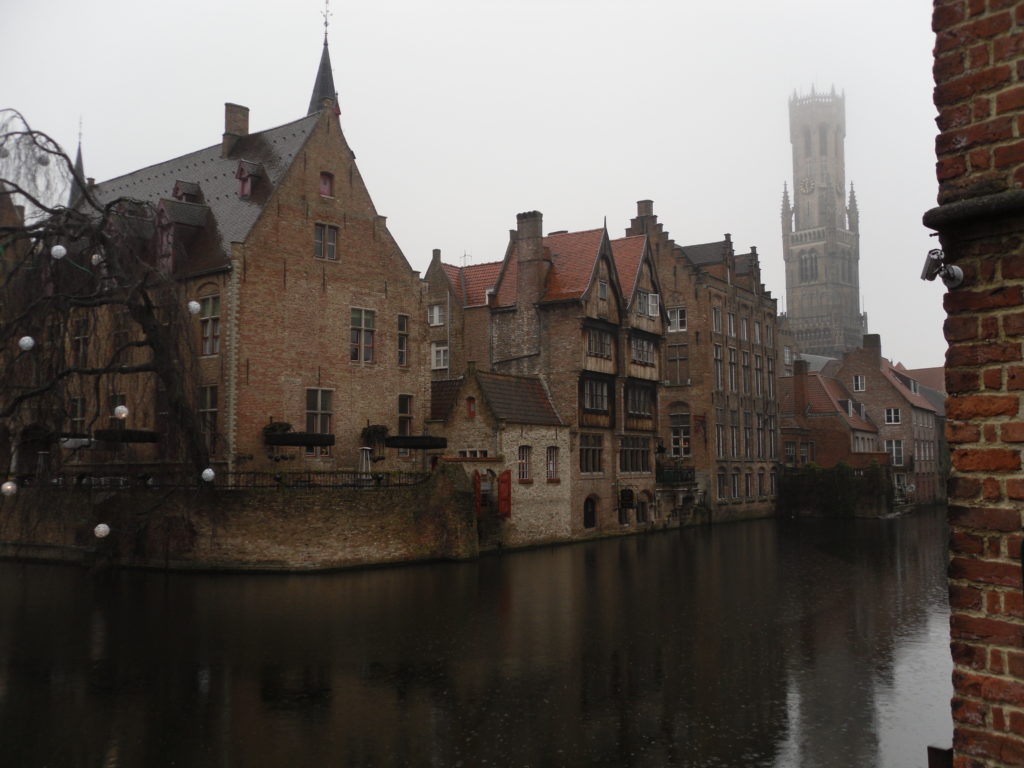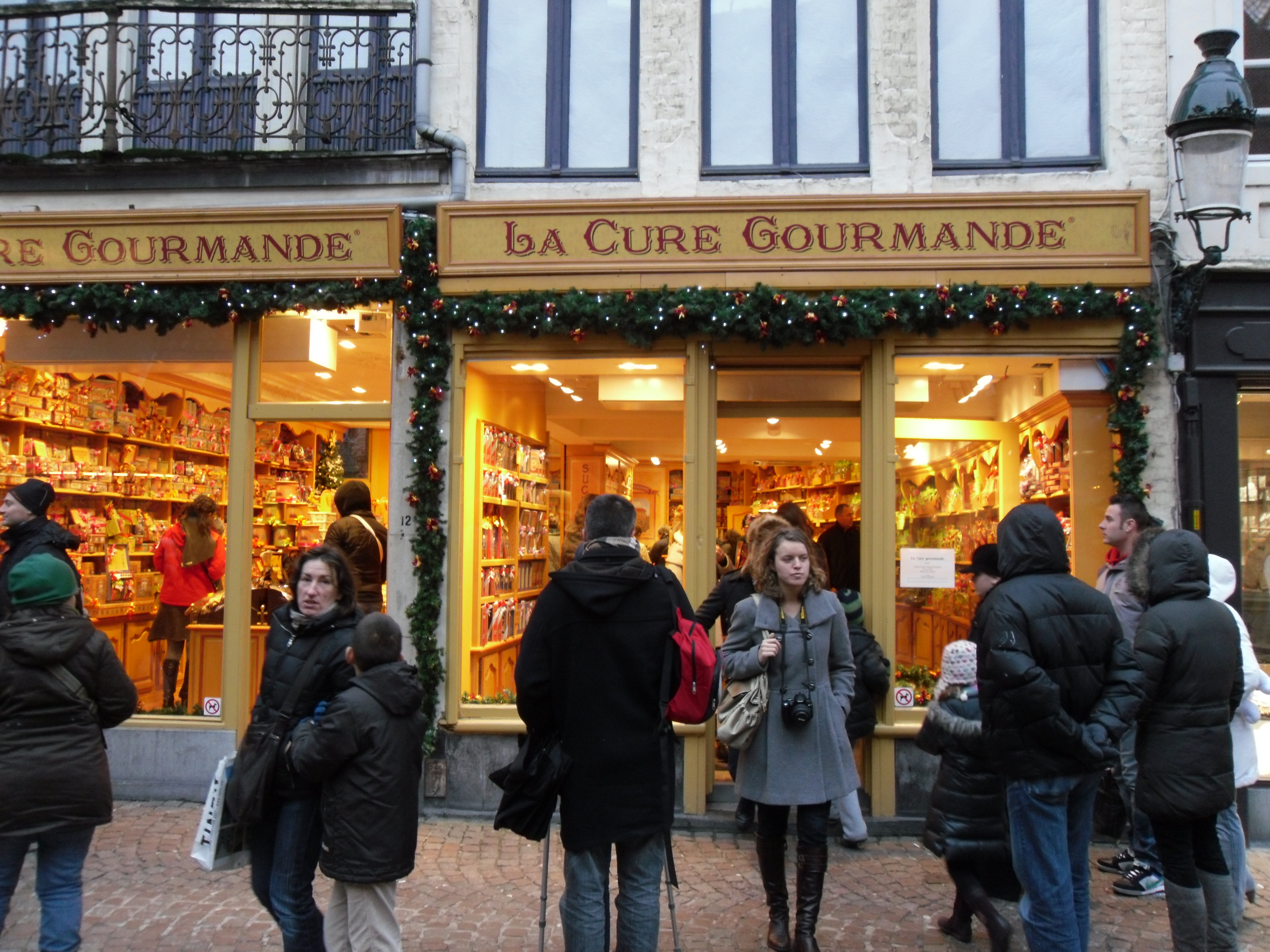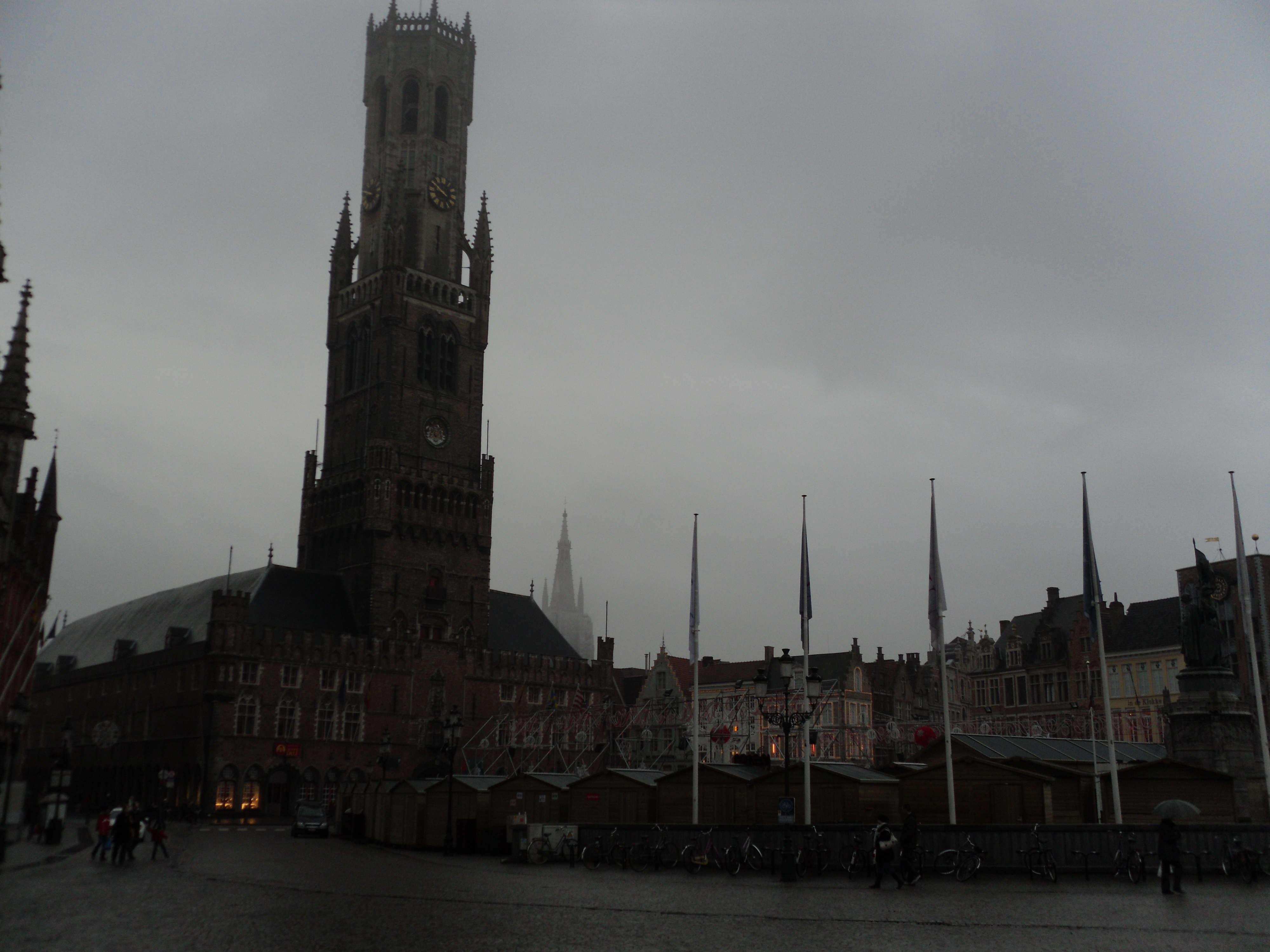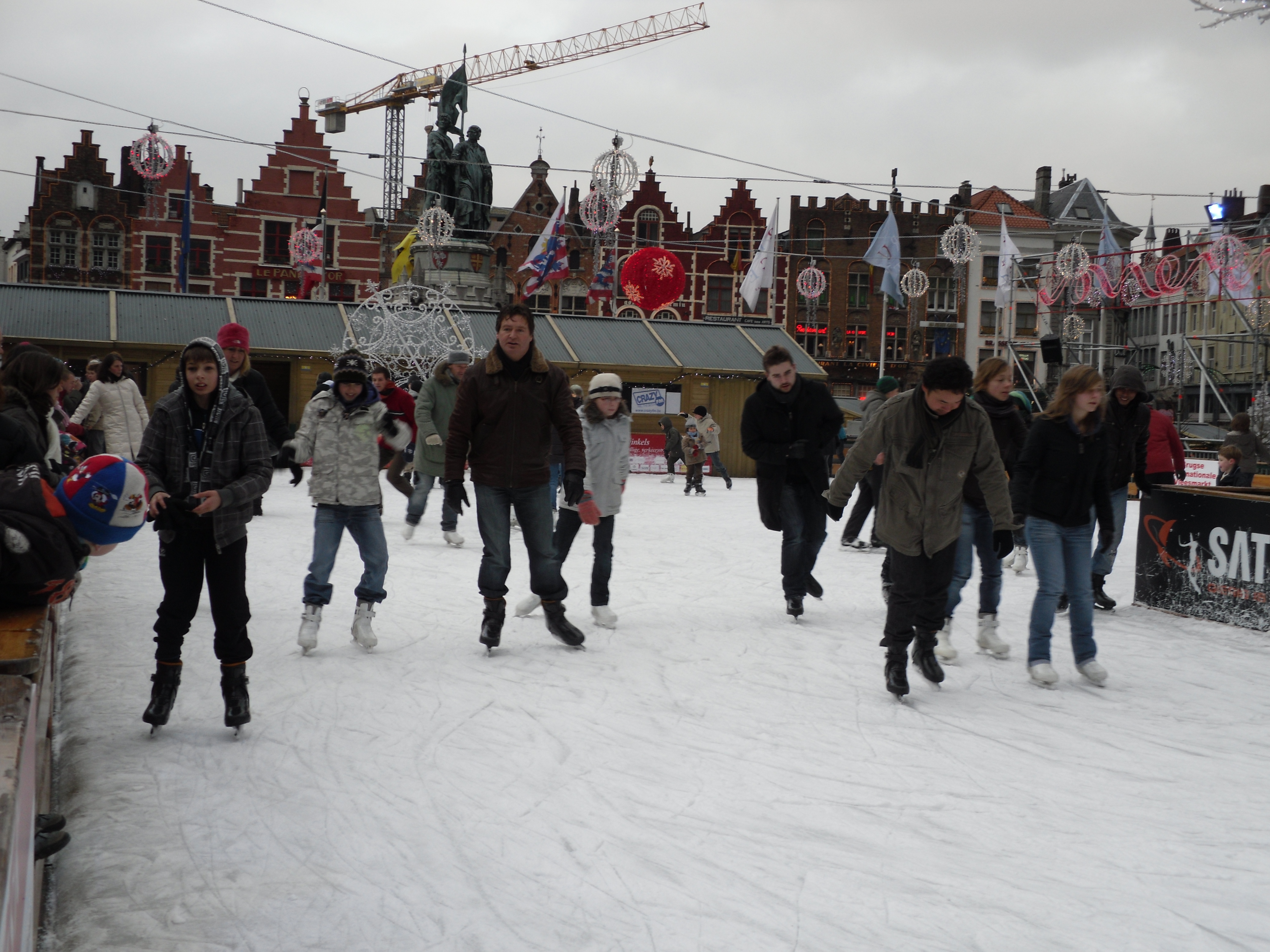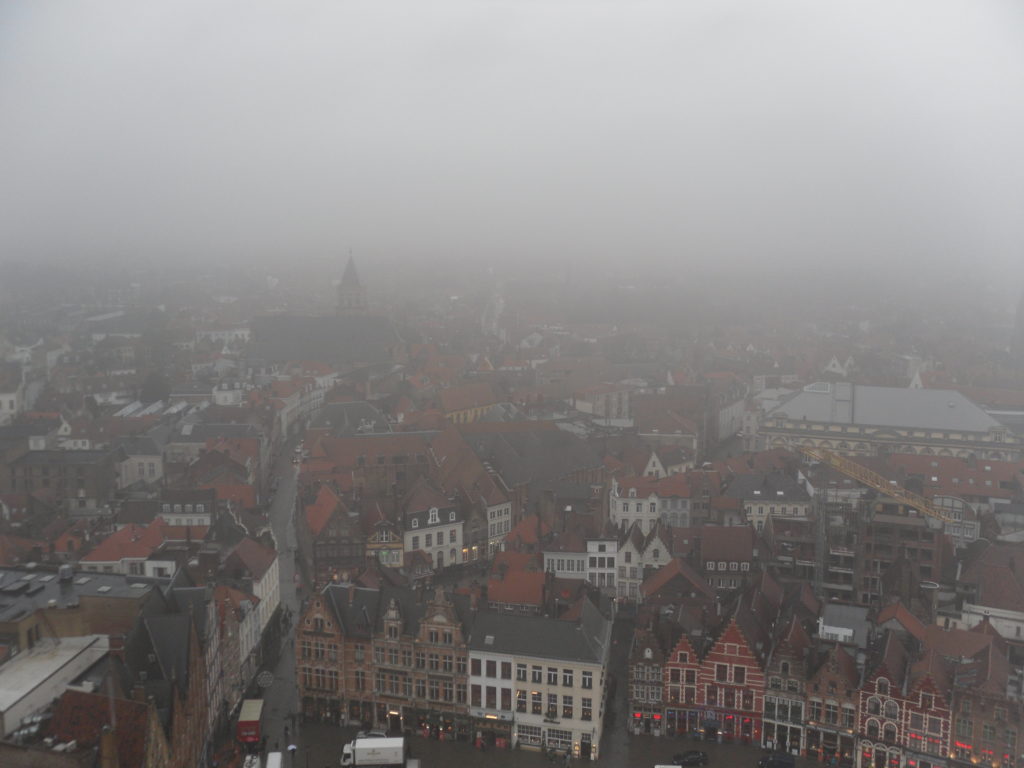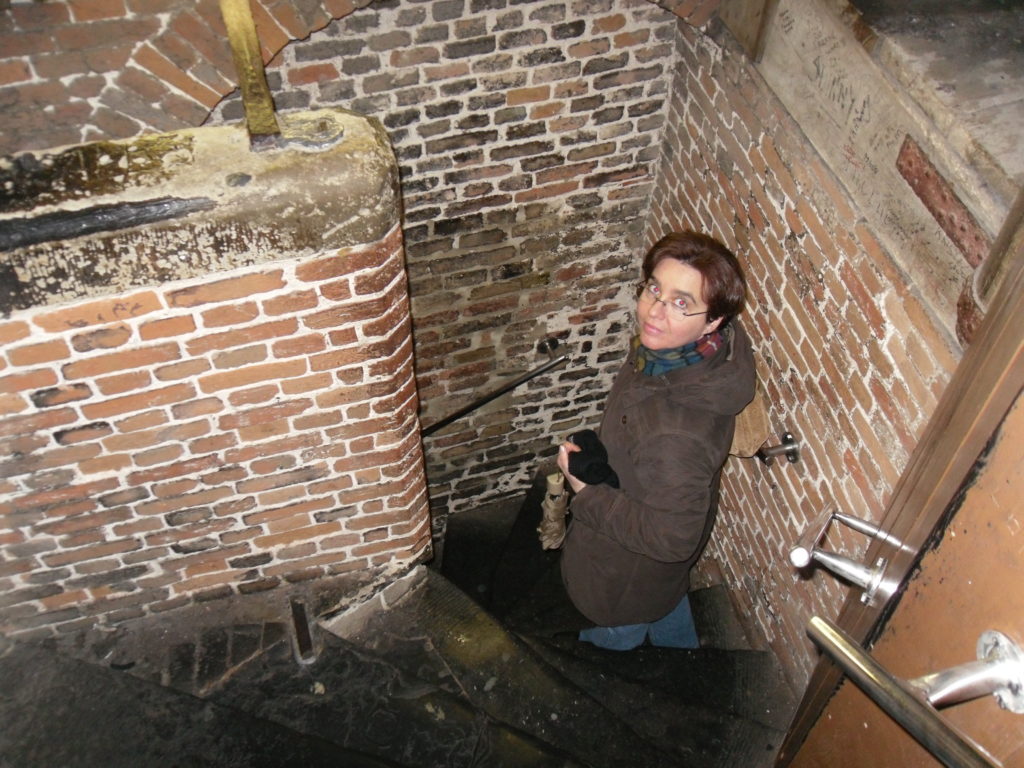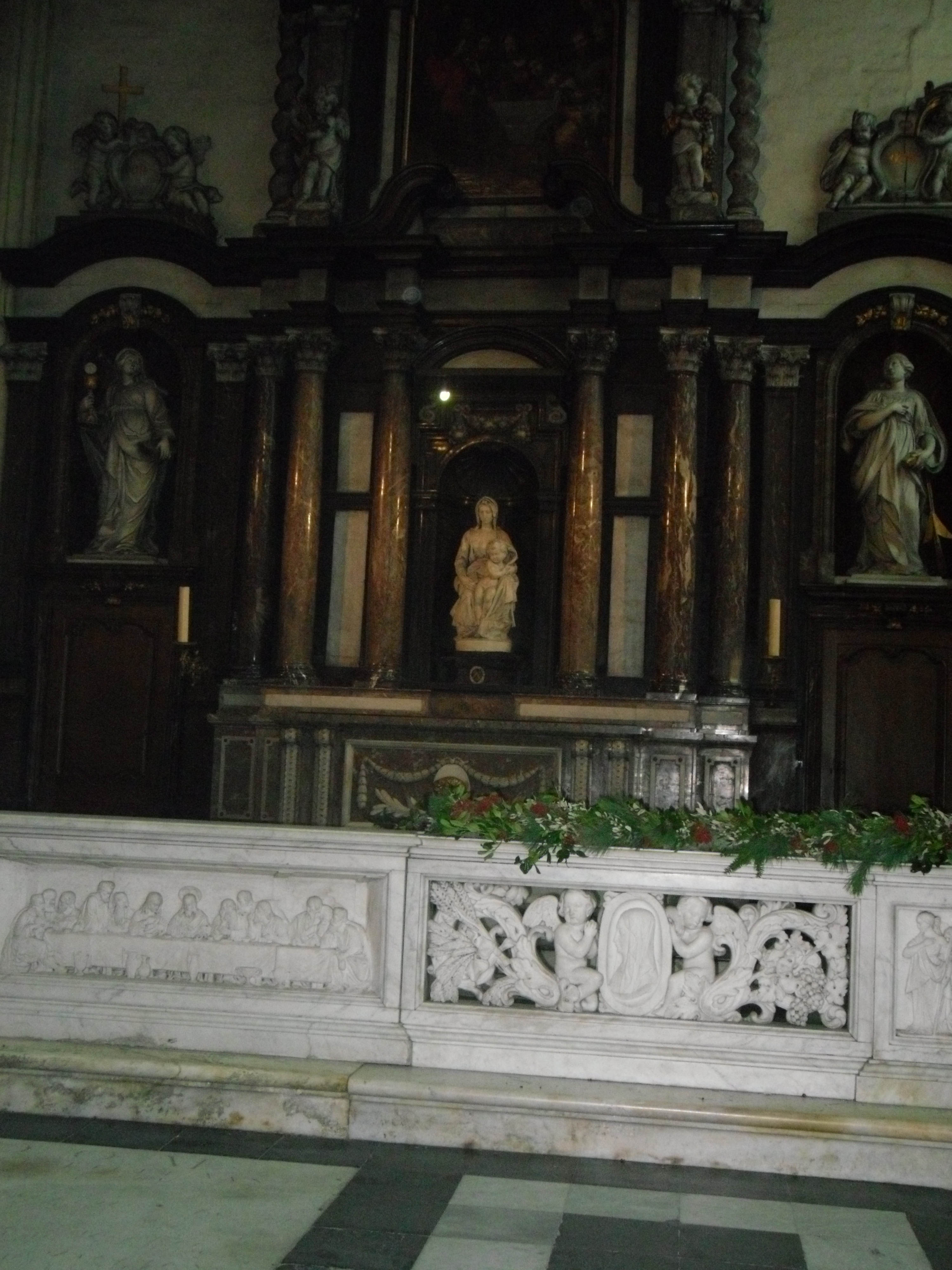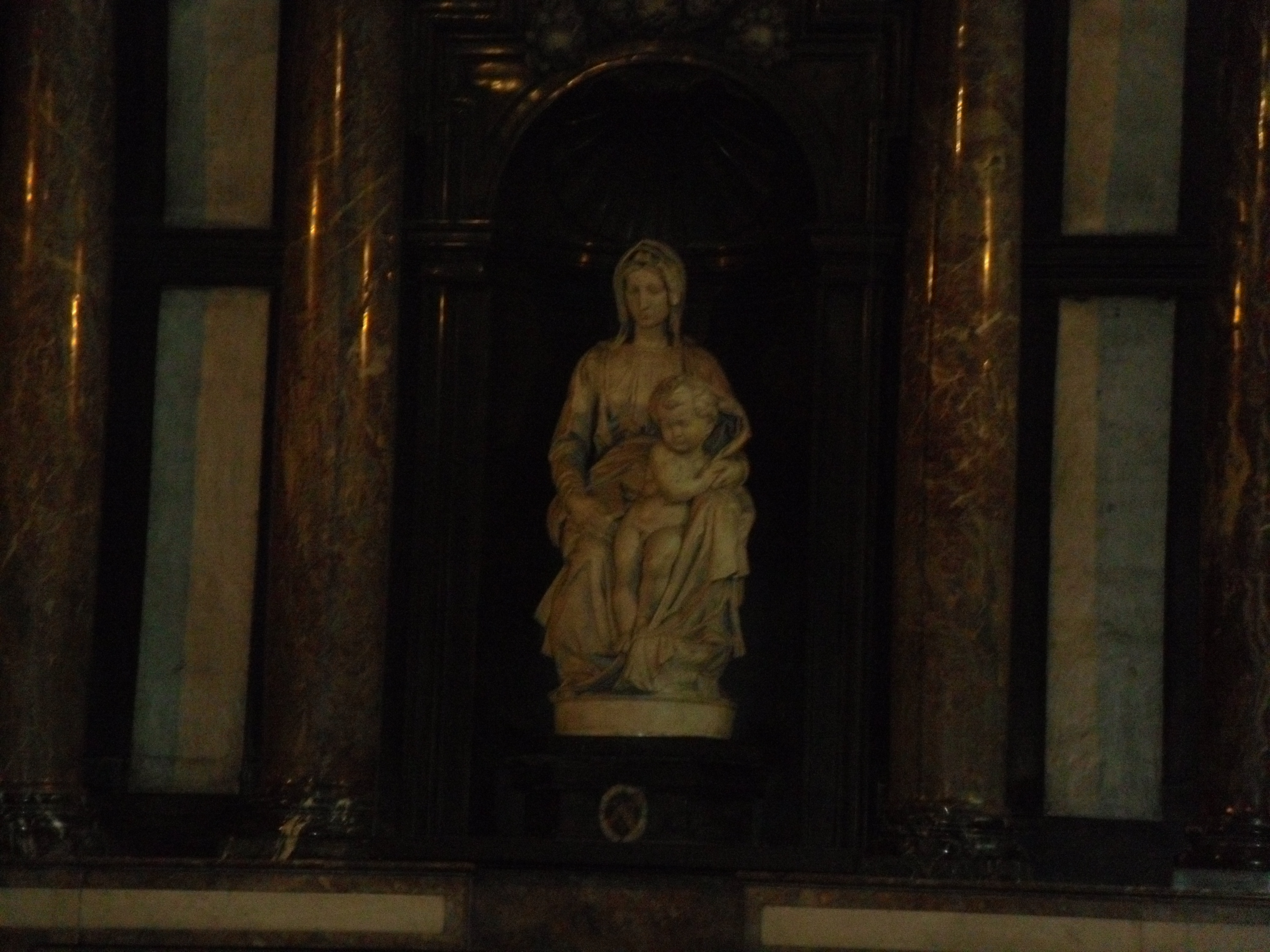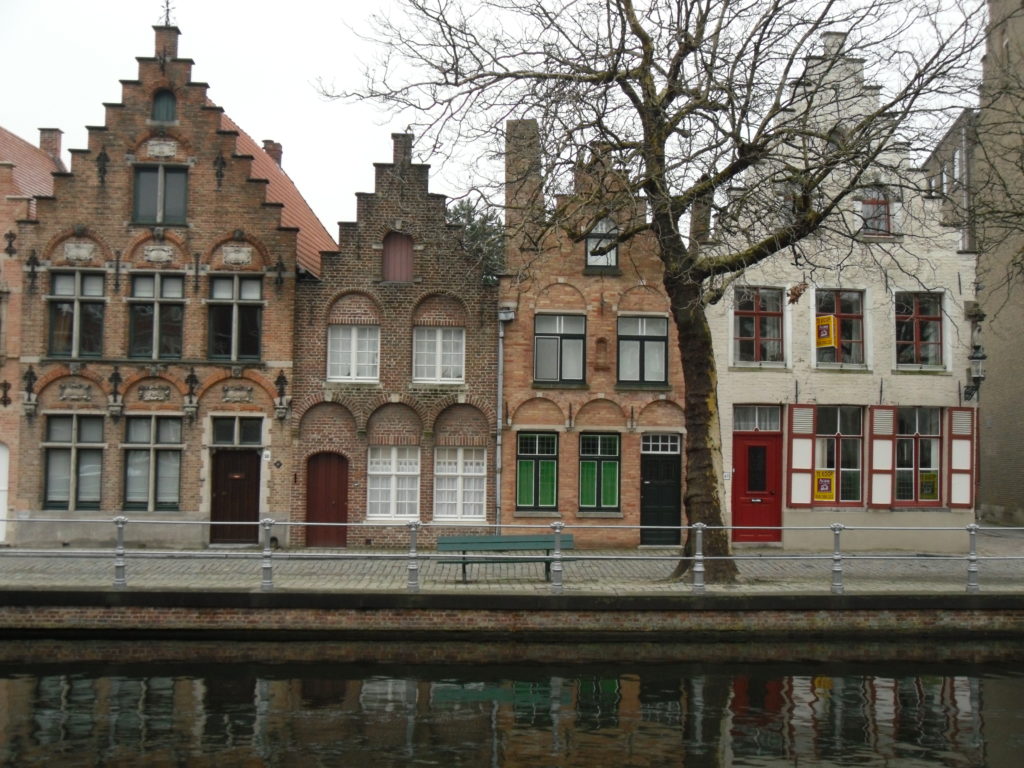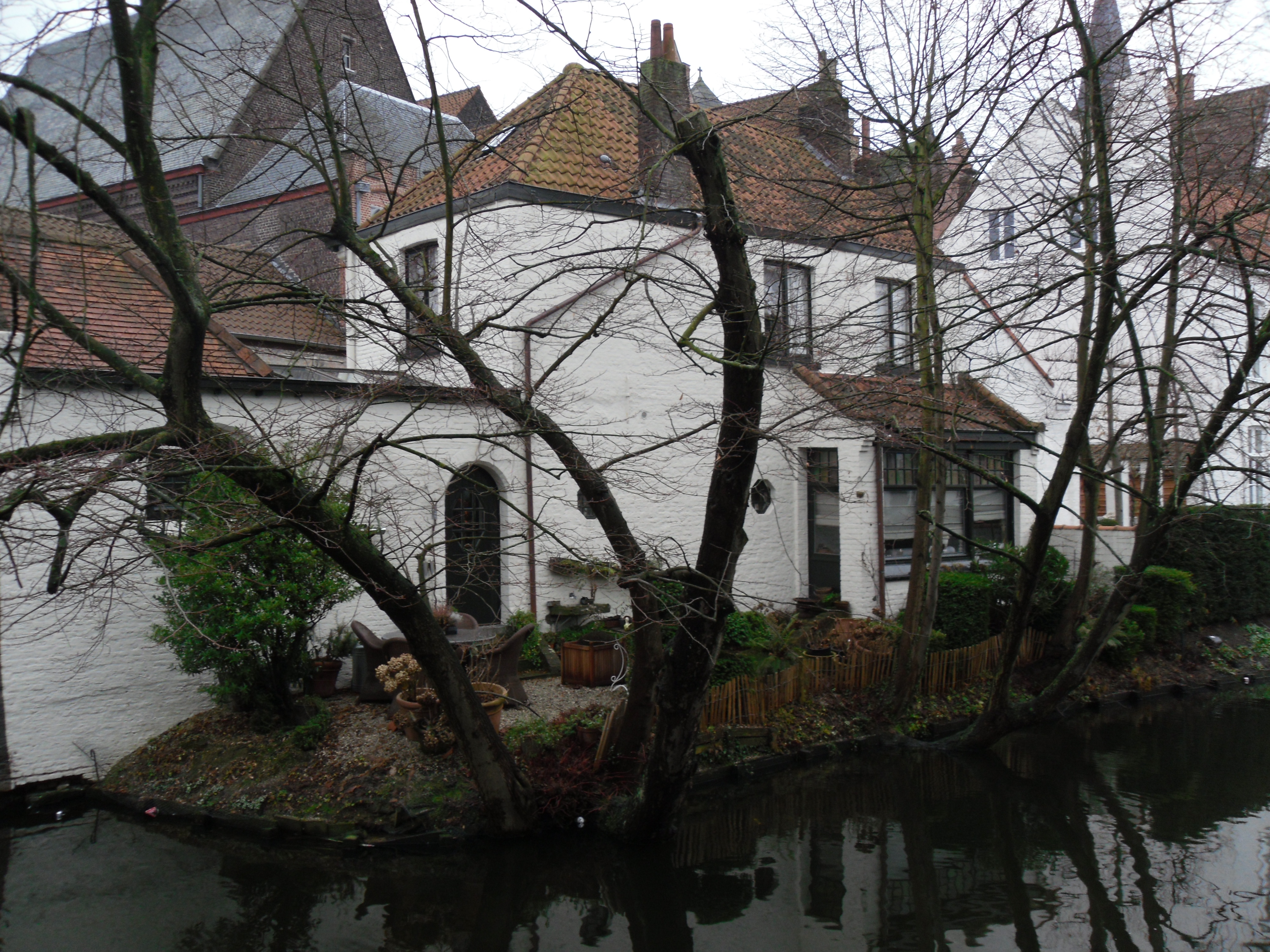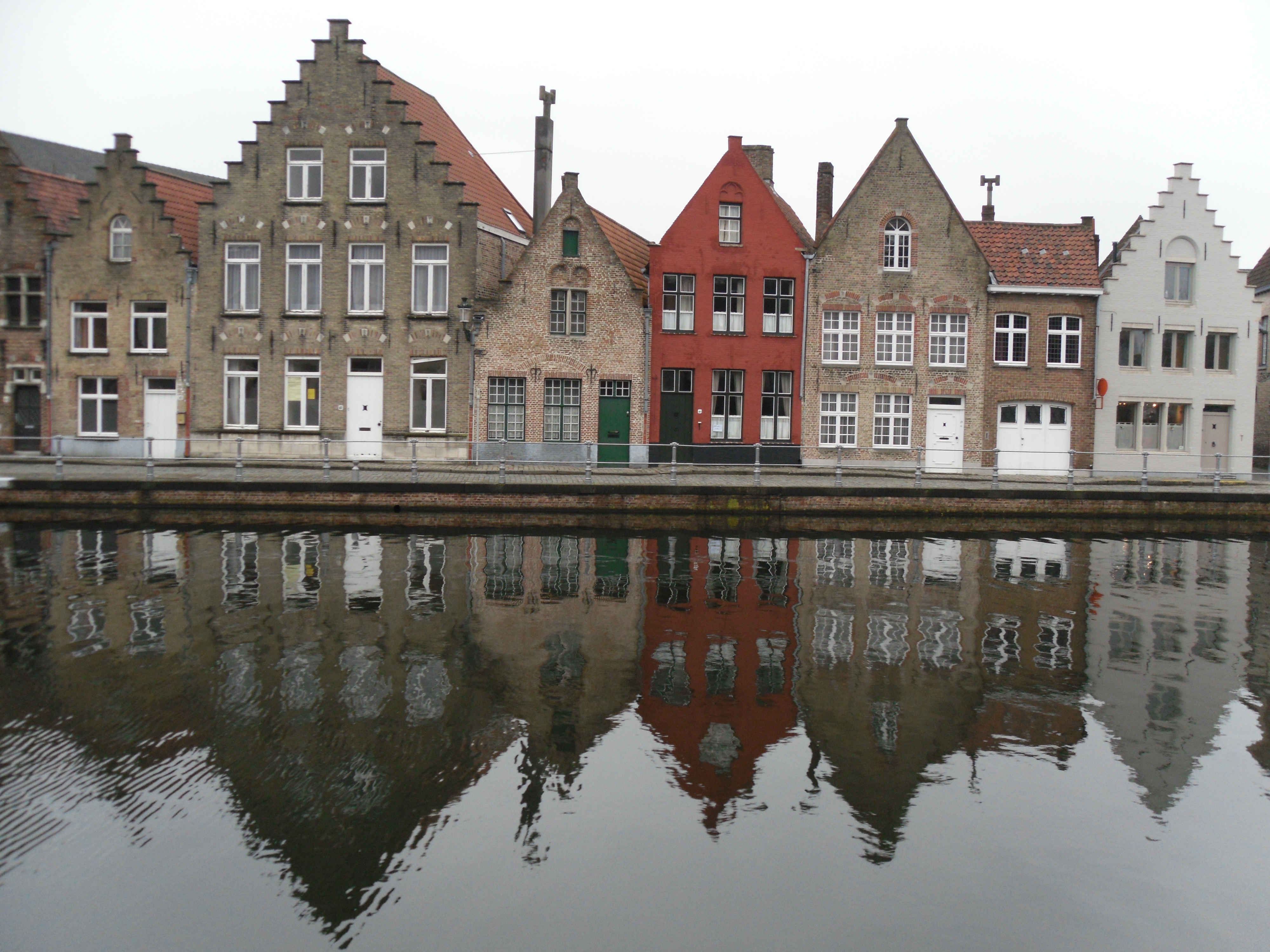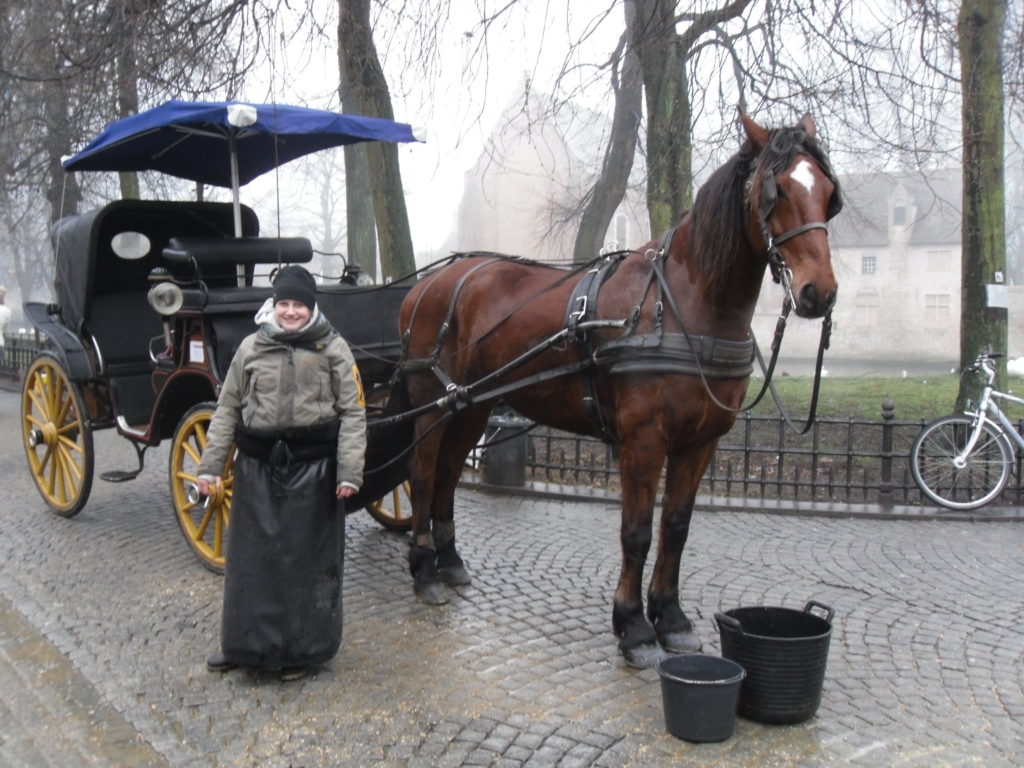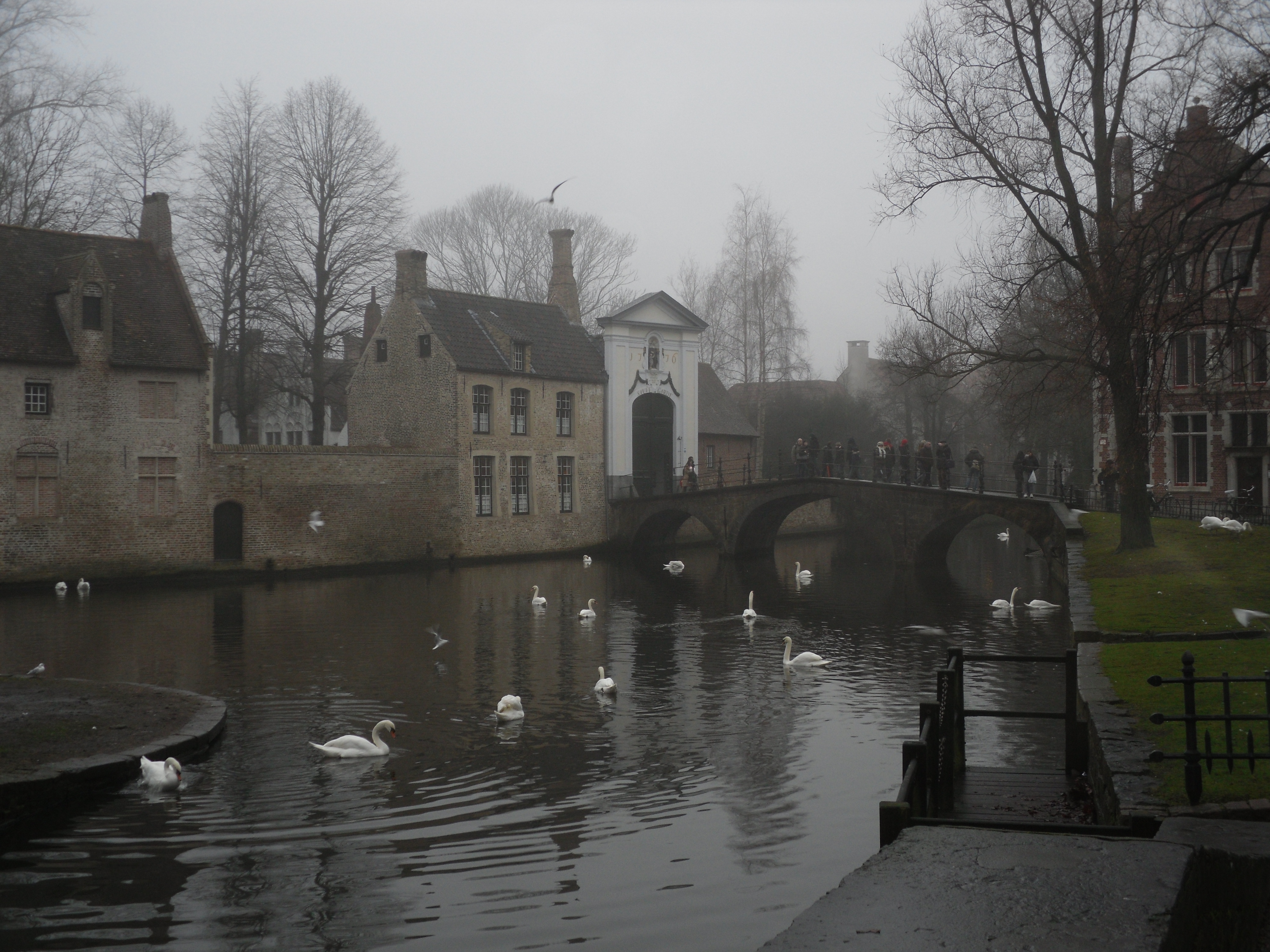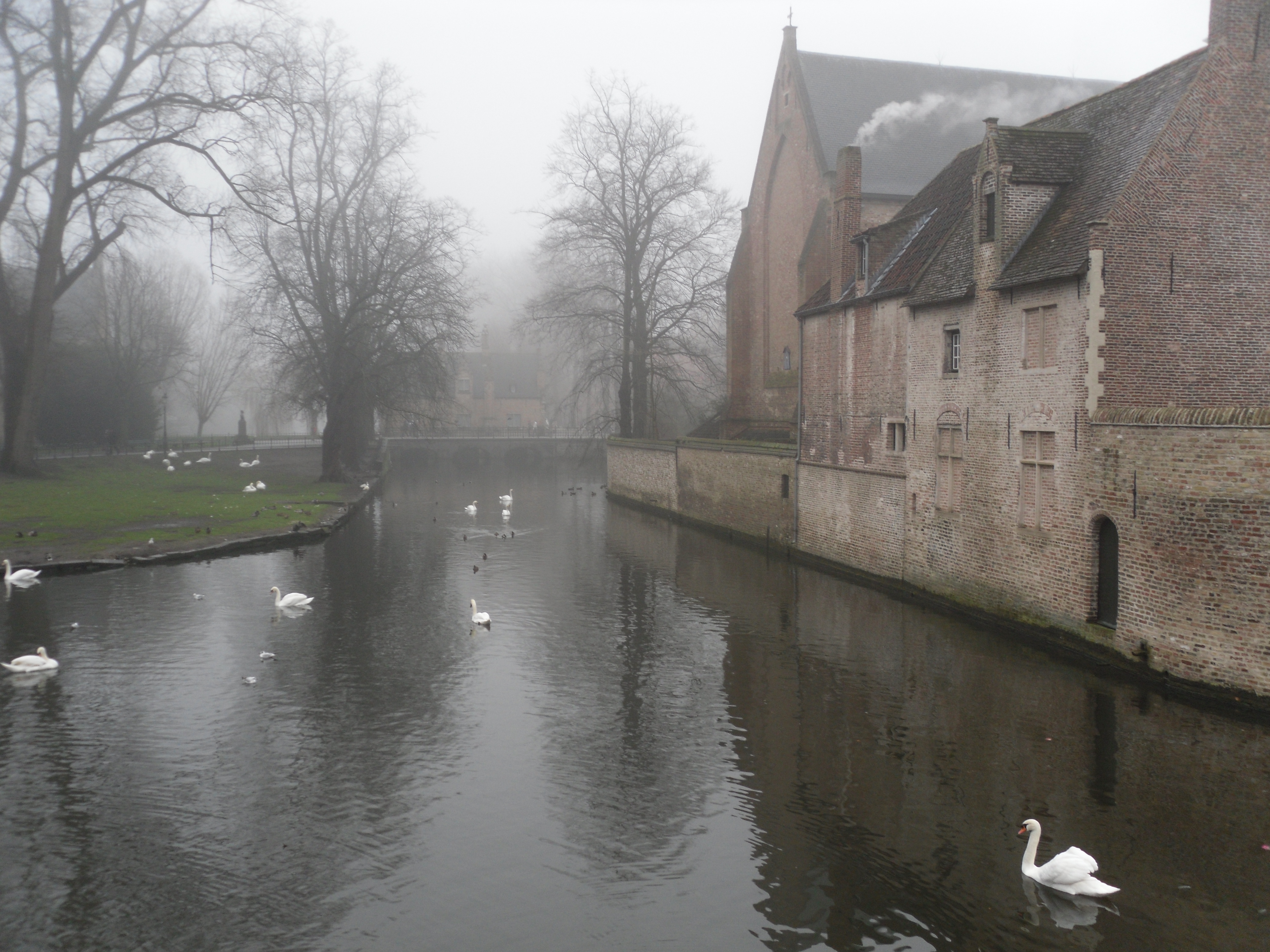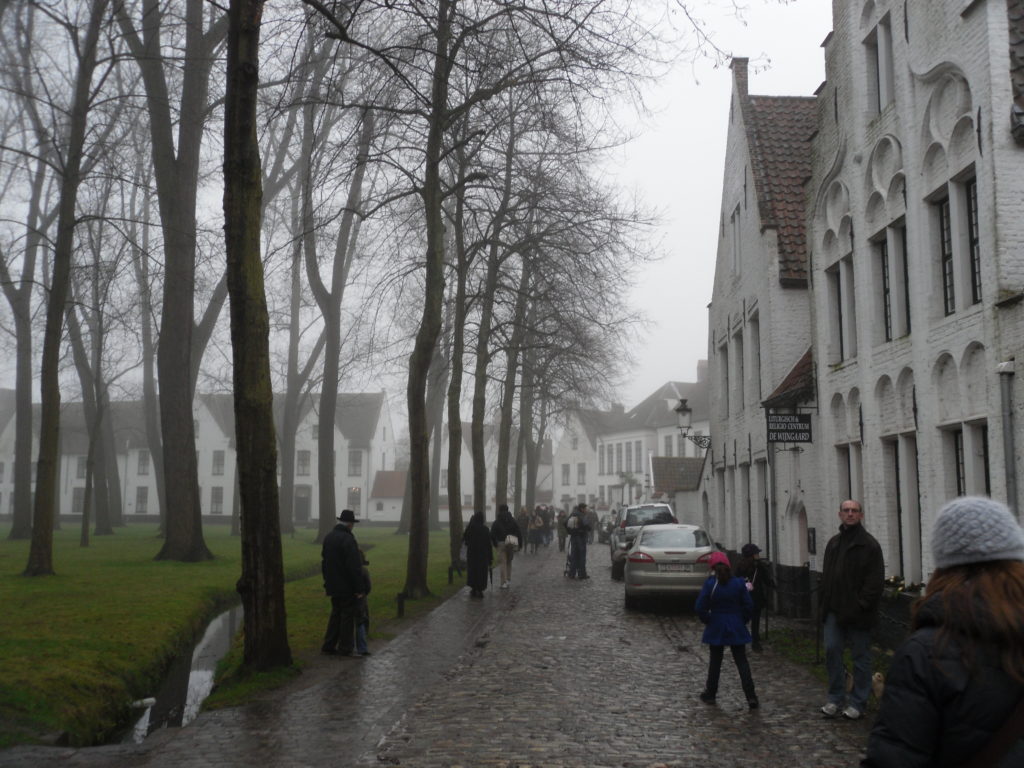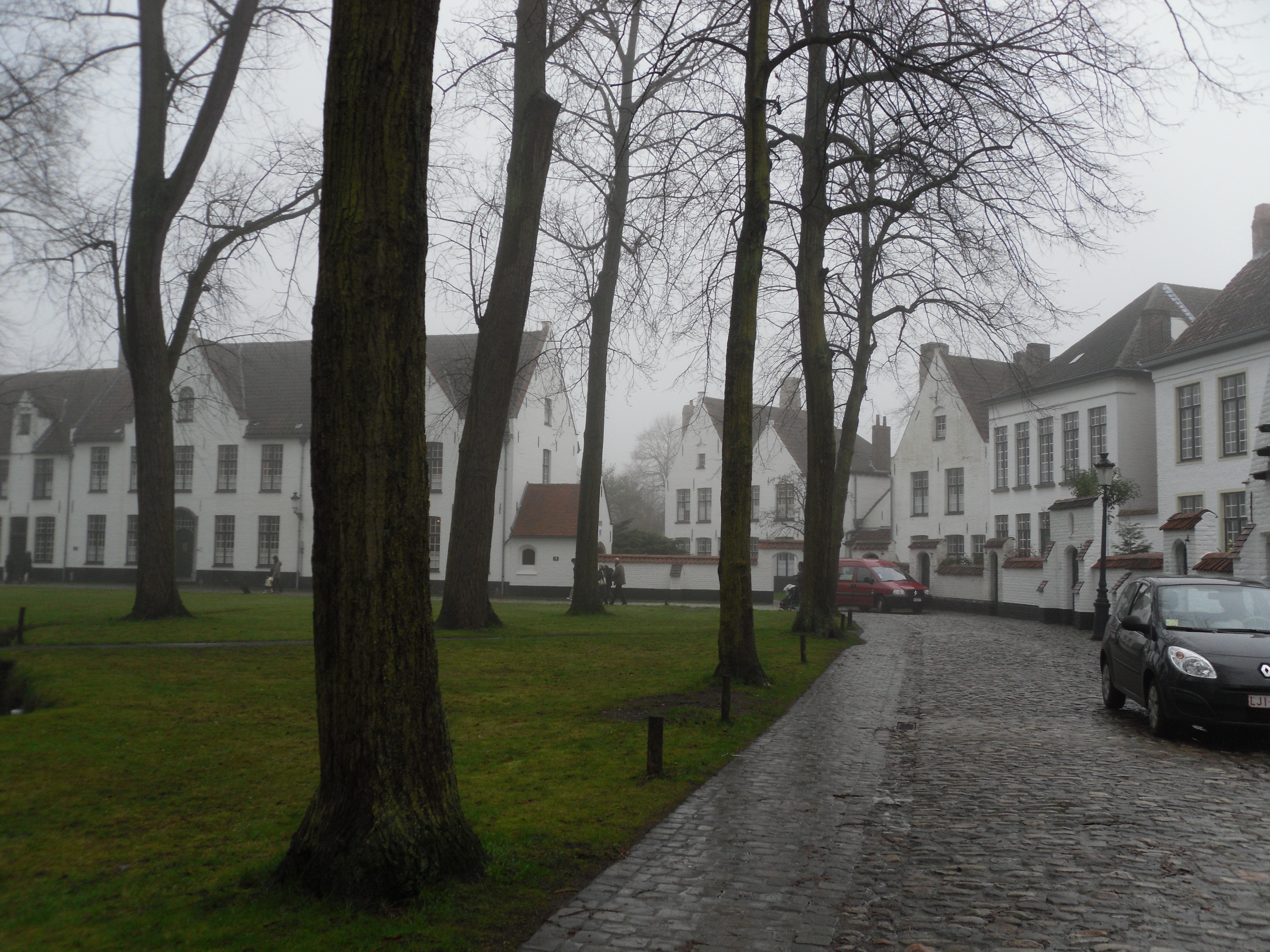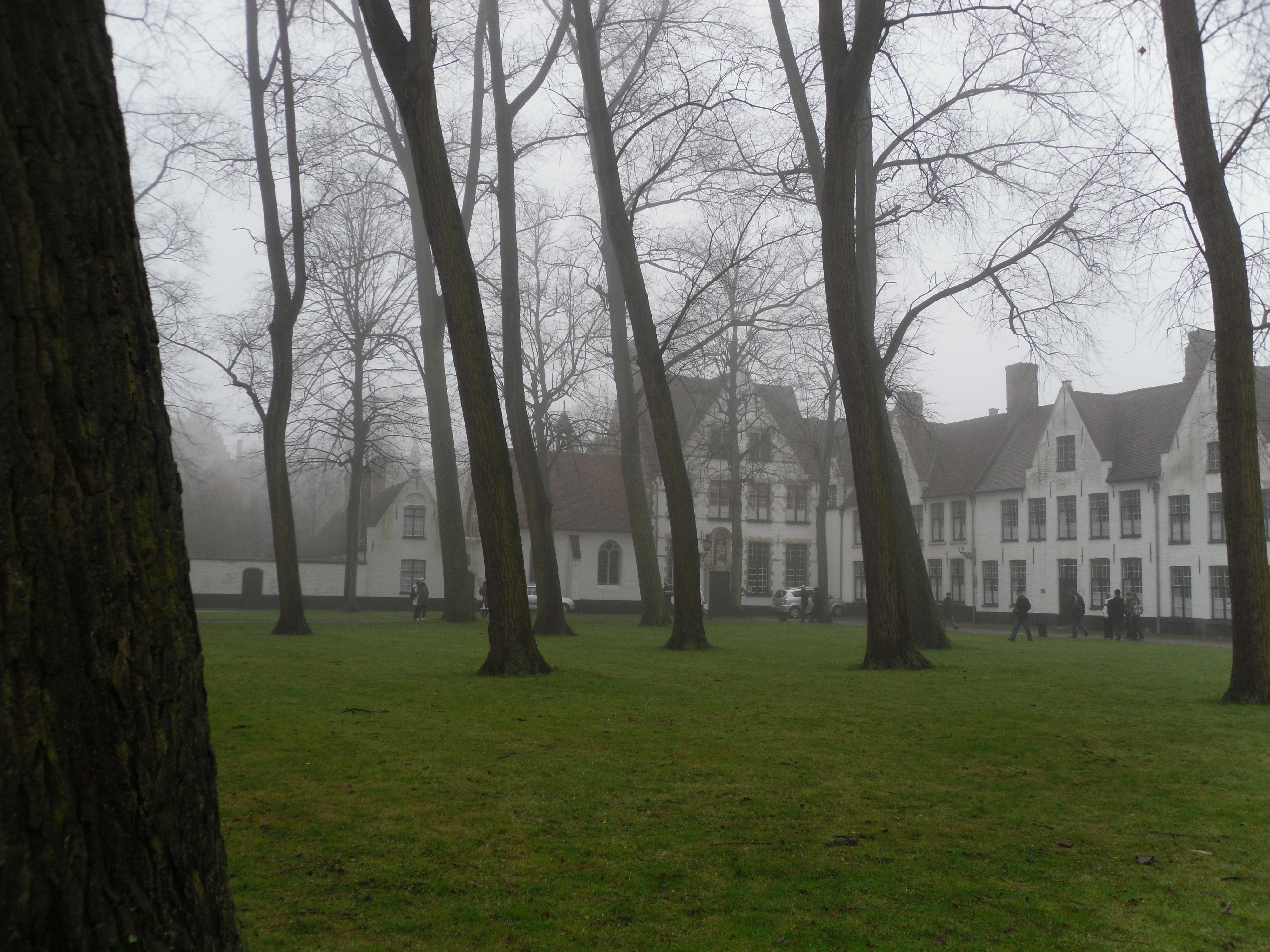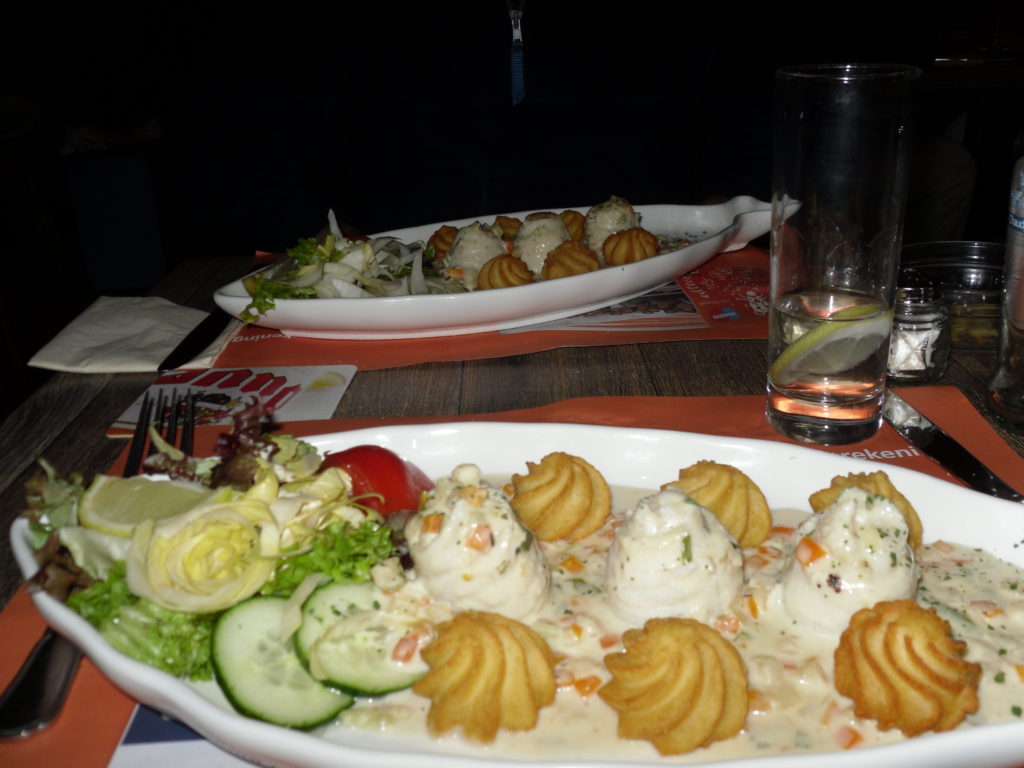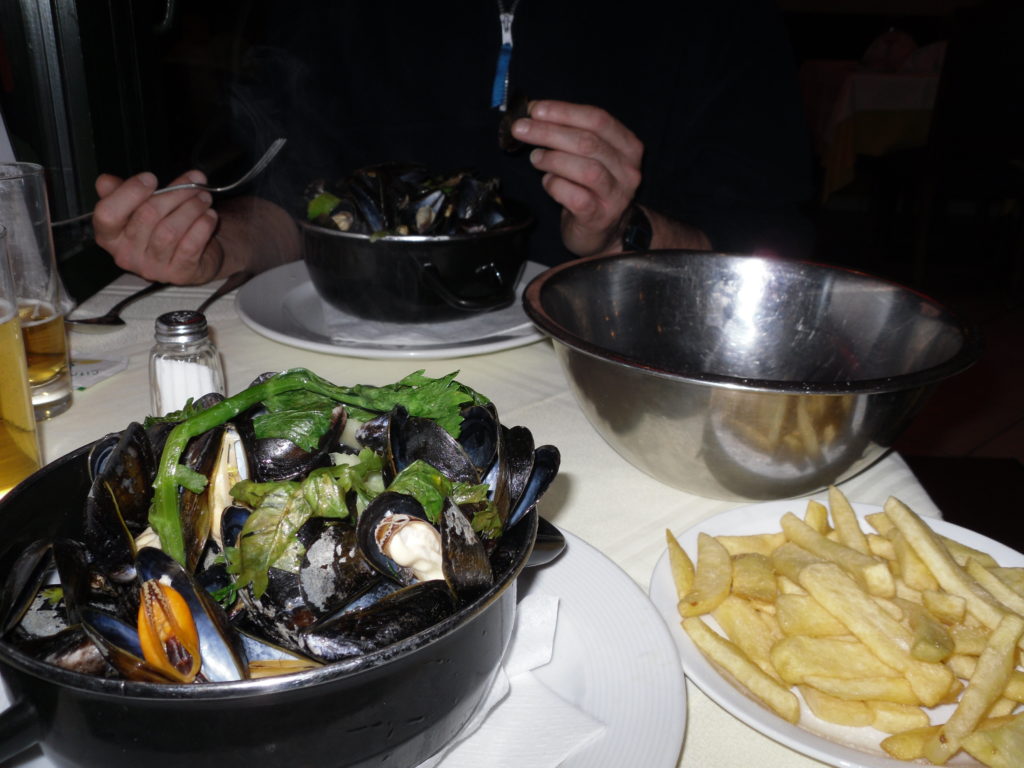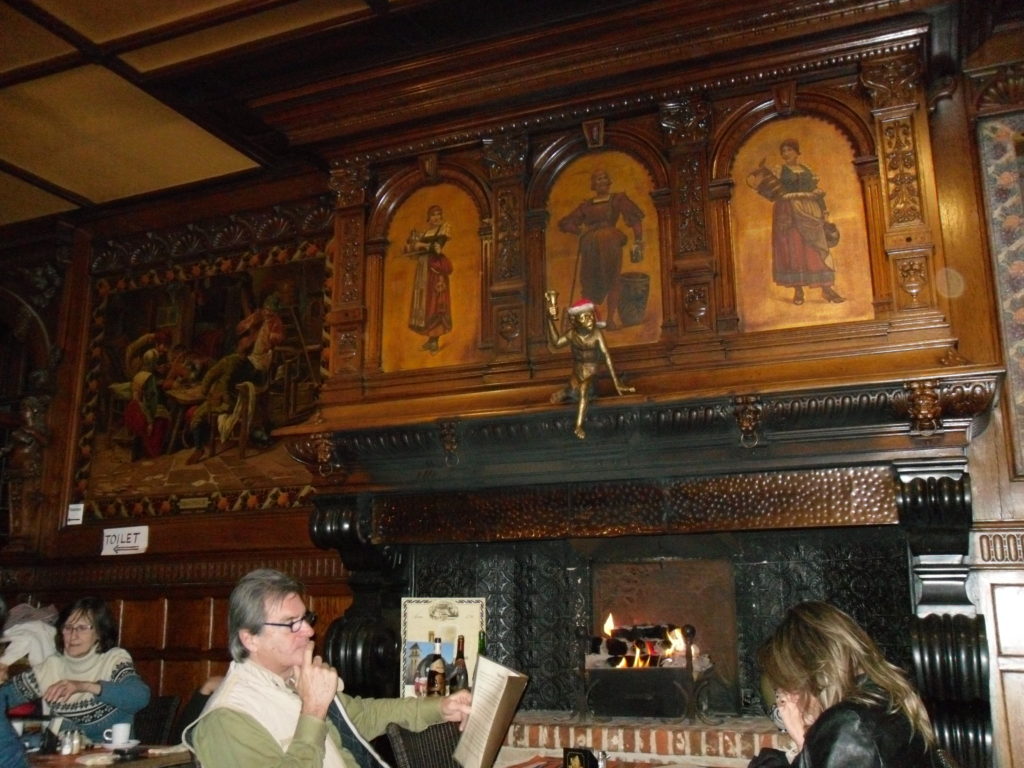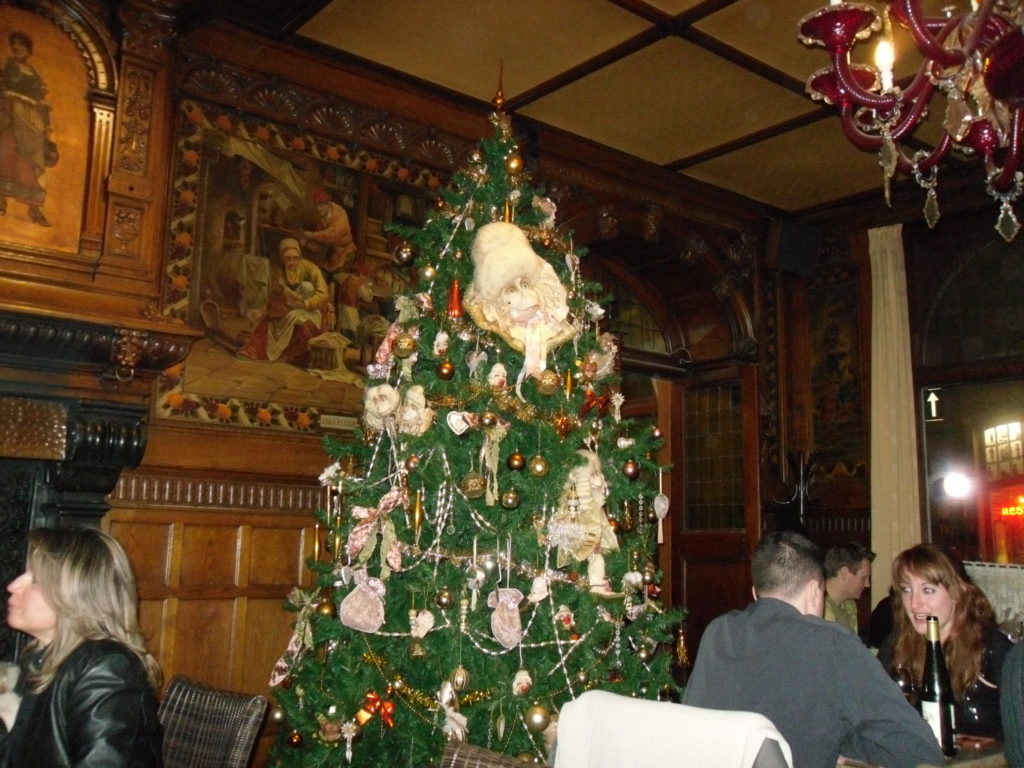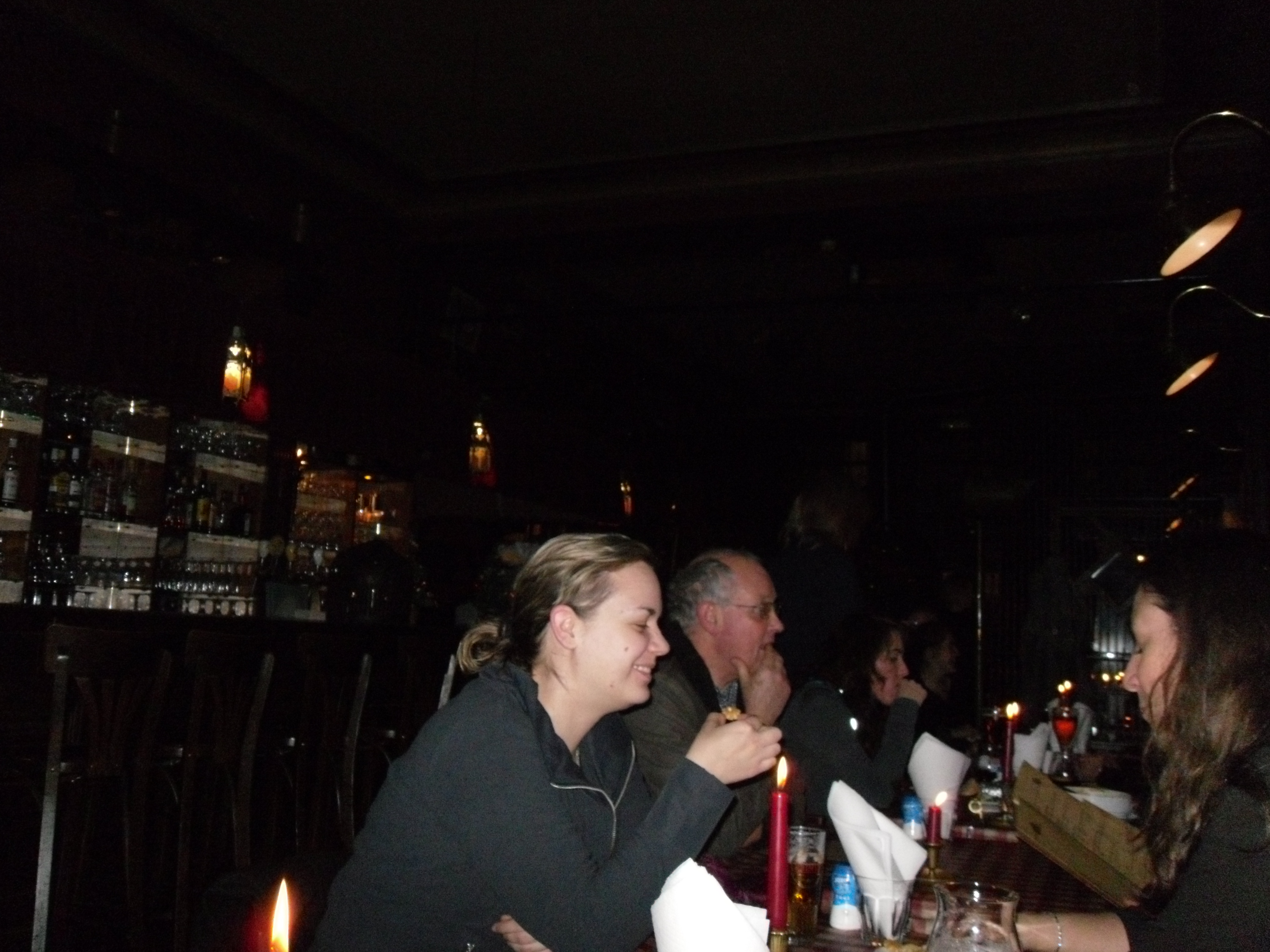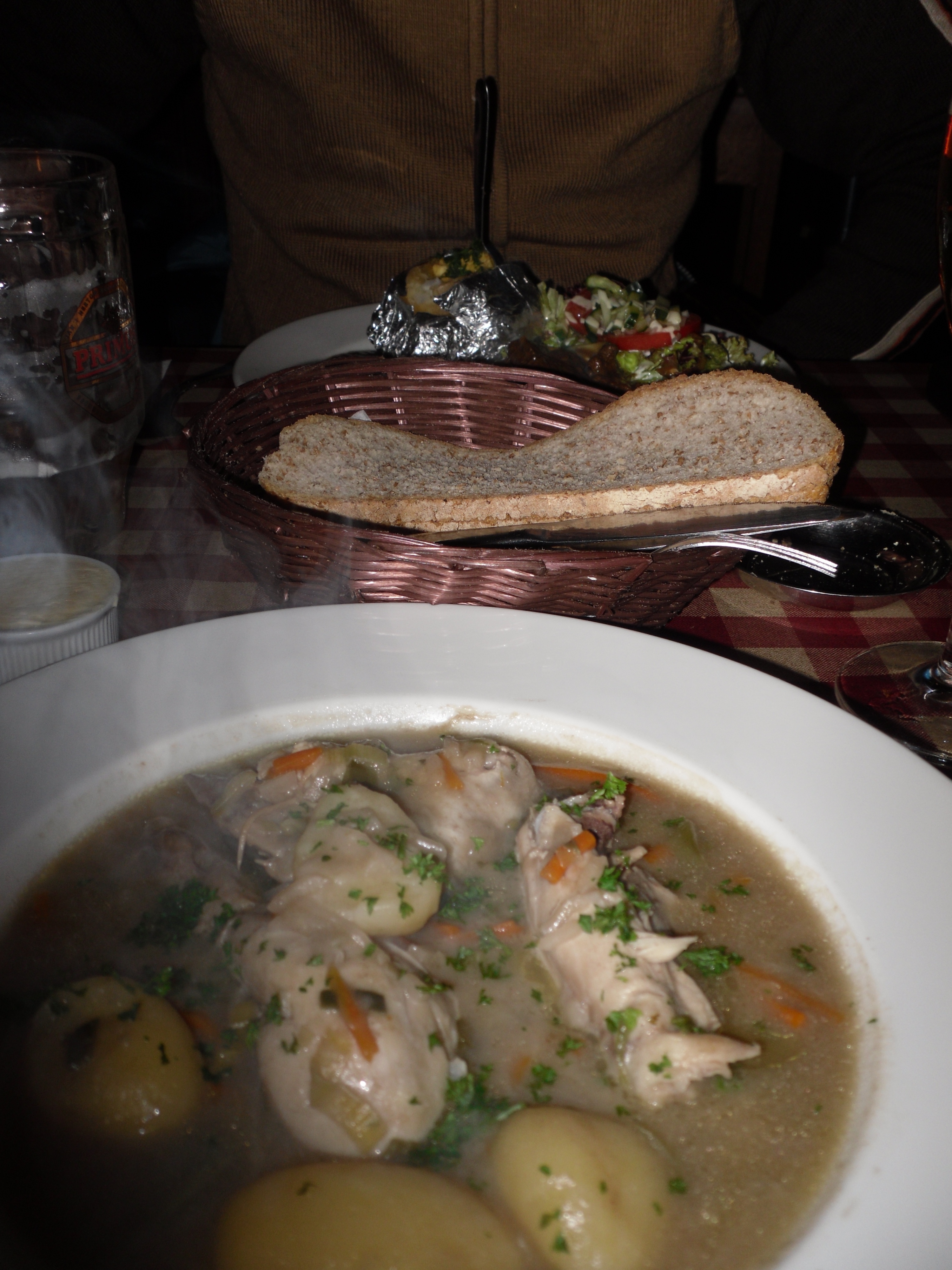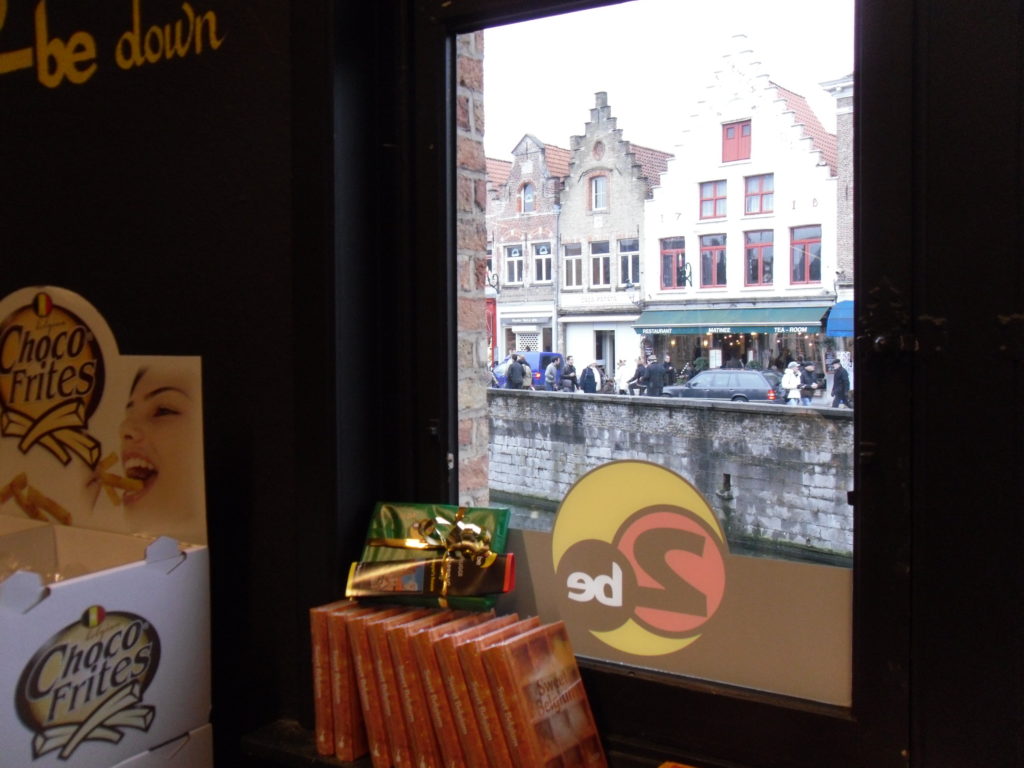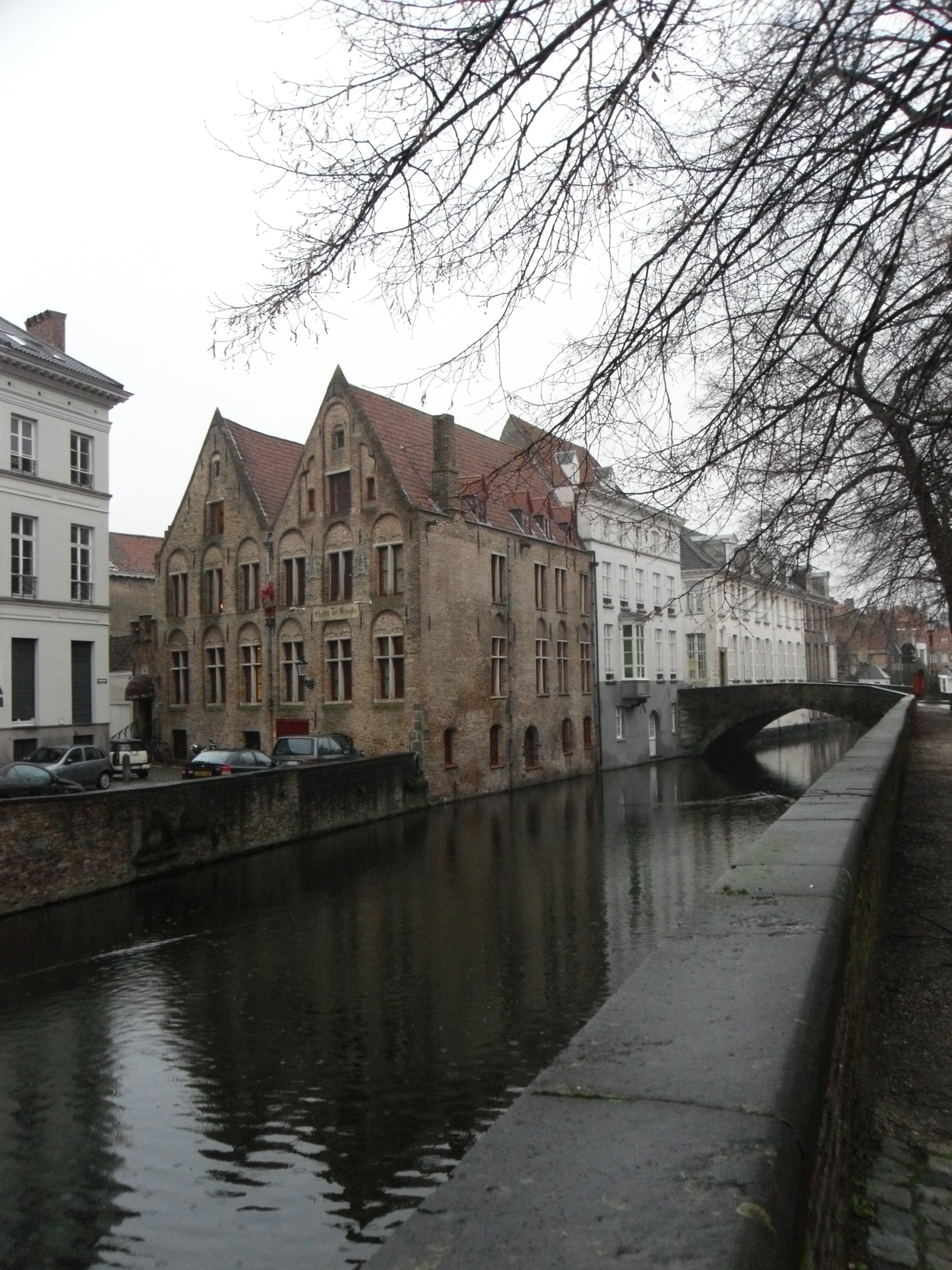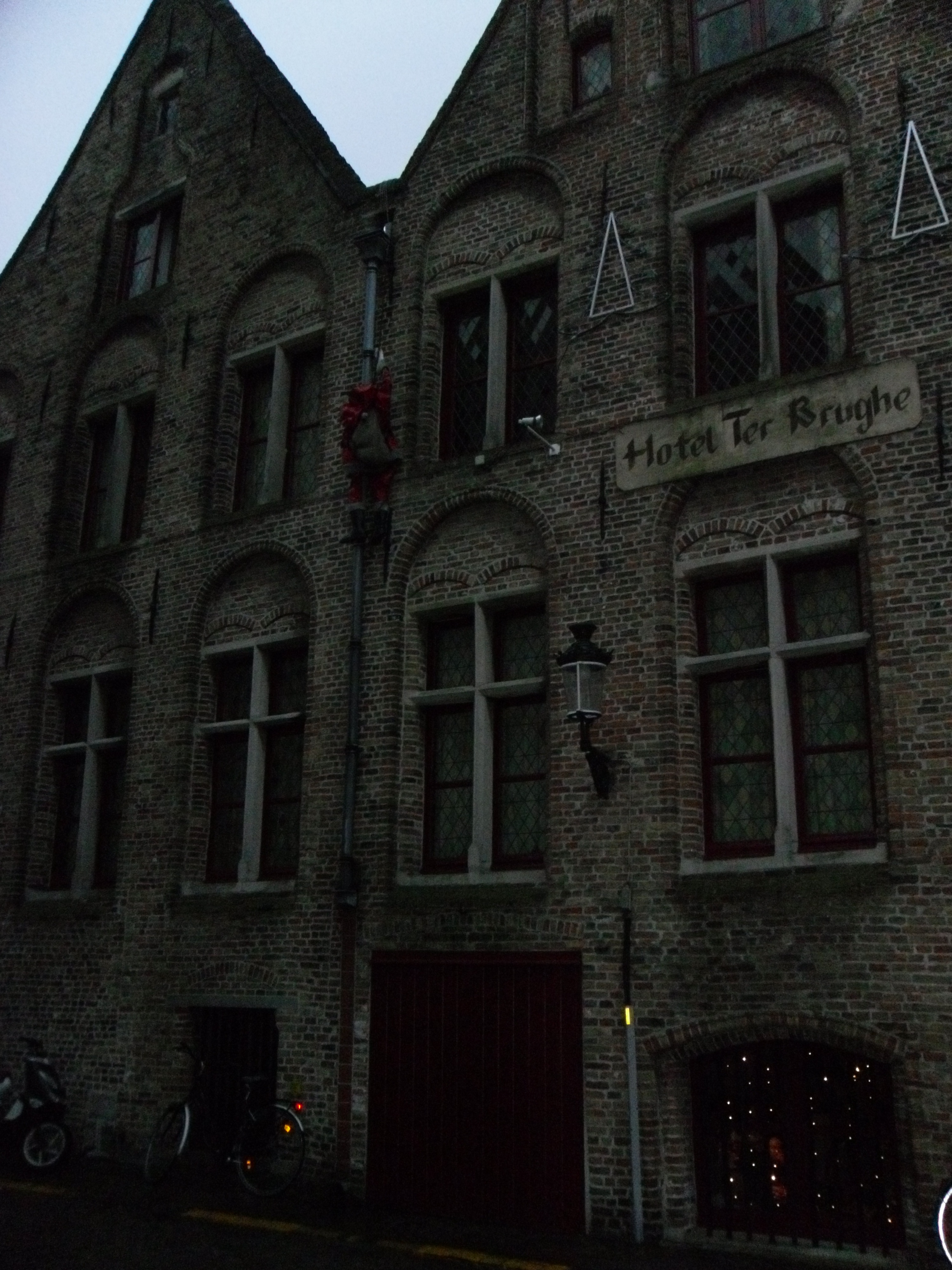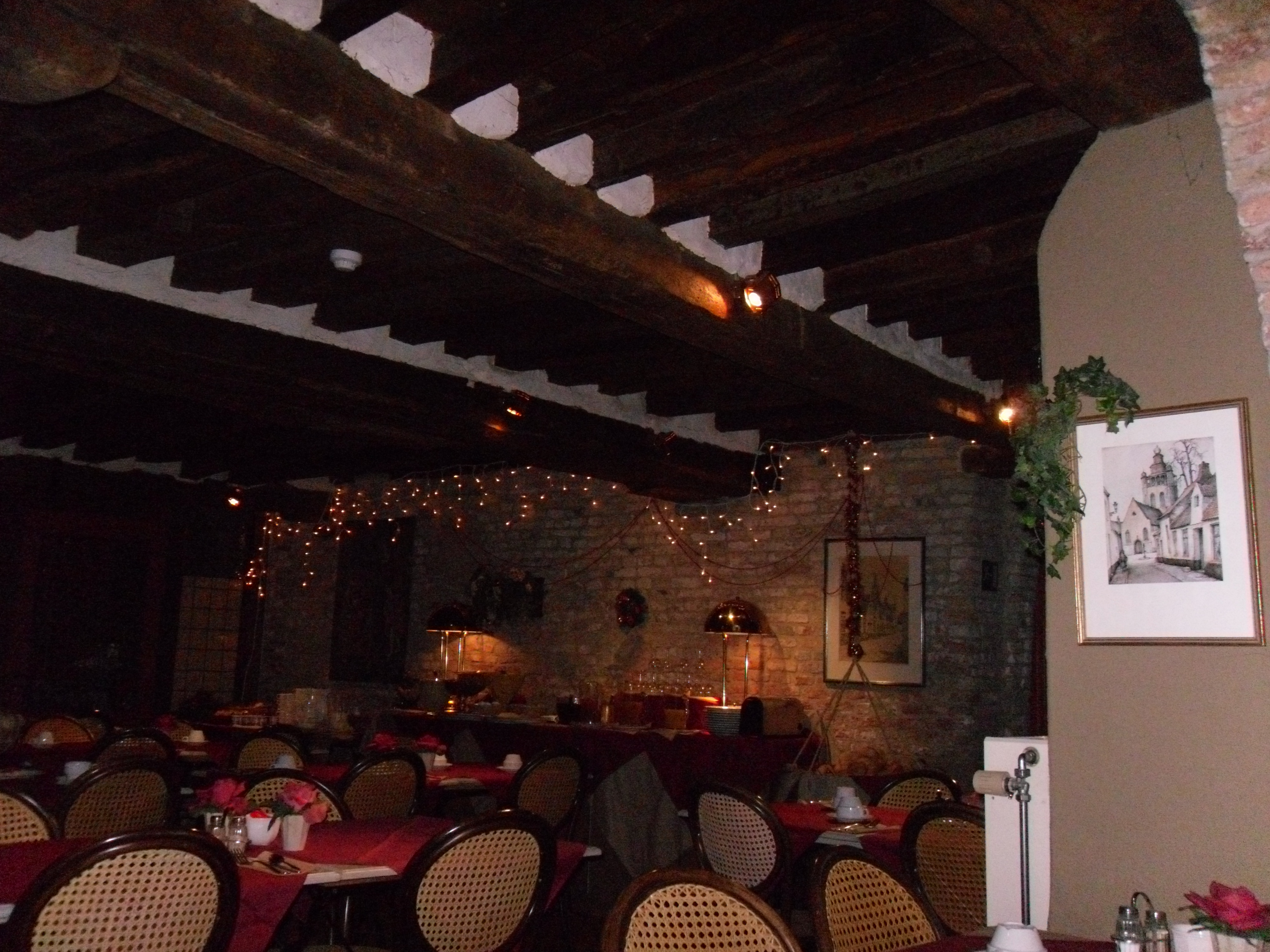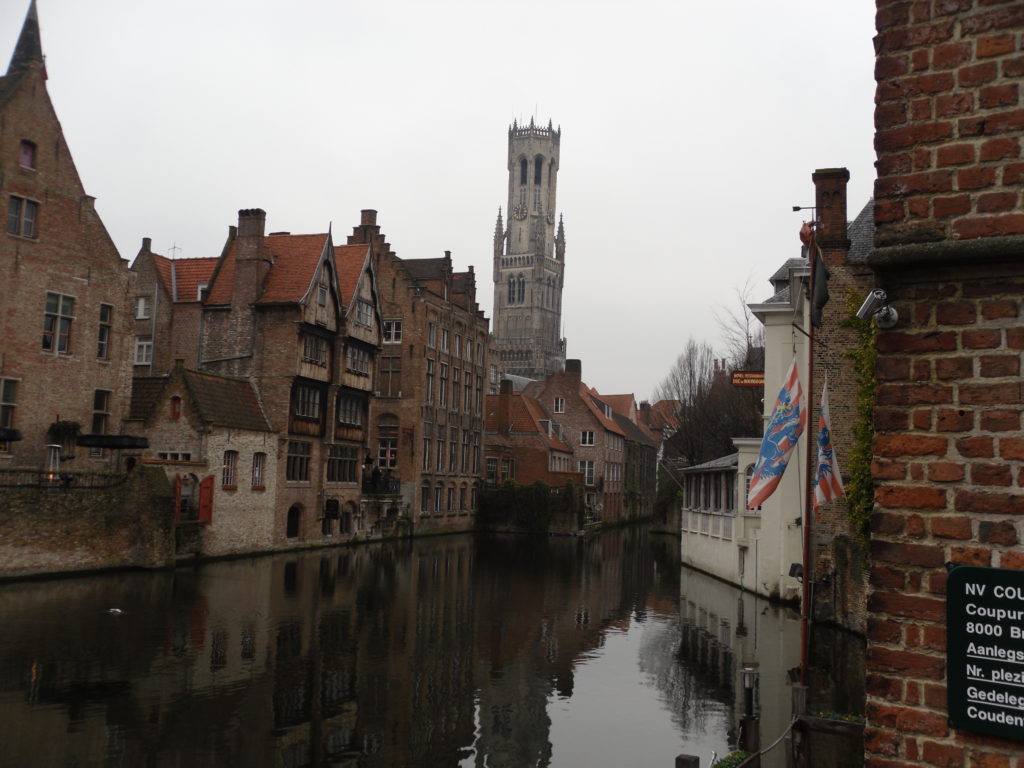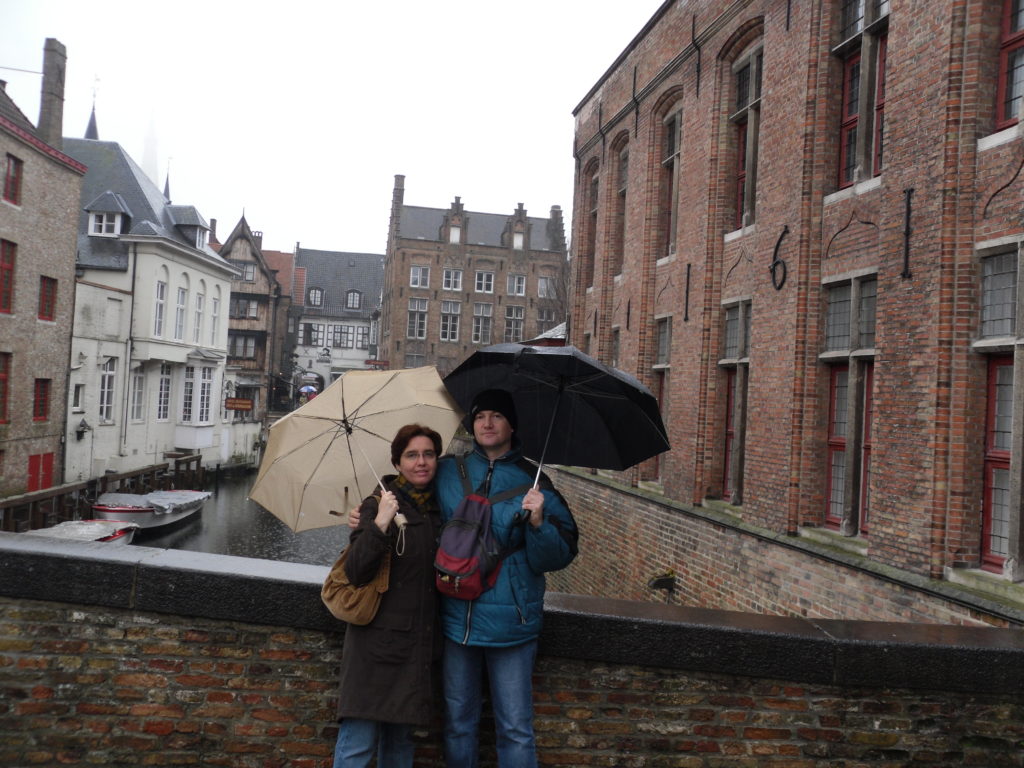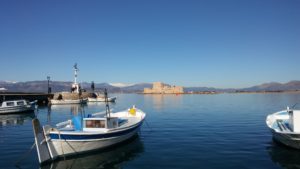
Today I am delighted to present to you the historical town of Nafplio (Nafplion) in the Peloponnese.
In 1821, the Greeks declared the Greek War of Independence against the Ottoman Empire that plagued the country for 400 years. Eight years later, Nafplio became the first capital of Greece and remains to this day a town steeped in history. The old quarter, situated near the promenade, has retained both its feel and look from the 1800’s. This is largely owed to Nafplio’s antiquated buildings as well as the three Venetian forts that surround it: Bourtzi, Palamidi and ‘Its Kale’.
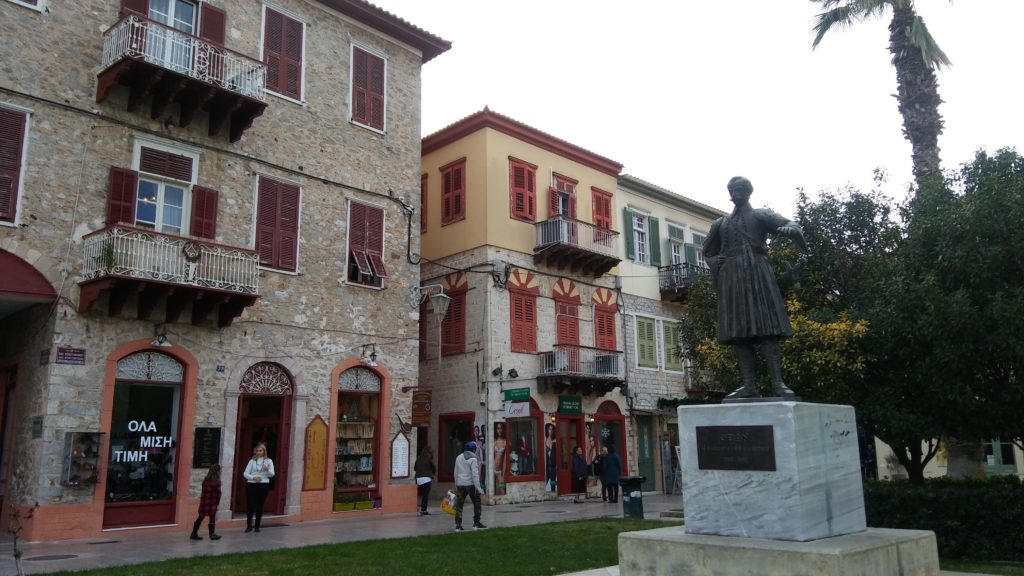
A statue of King Otto in Trion Navarchon square
As you discover the old quarter on foot, the monuments and statues placed everywhere are a constant reminder that you’re in a place once inhabited by war heroes, kings, and gifted leaders of the people. The thought brings chills down my spine every time, and I hope to share that feeling of awe with you today.
So come with me, on this virtual tour of the town, and let’s revel together in Nafplio’s past and present glory. I promise you will be enchanted by its beauty and, if Greek history interests you, chances are you will hear something new 🙂
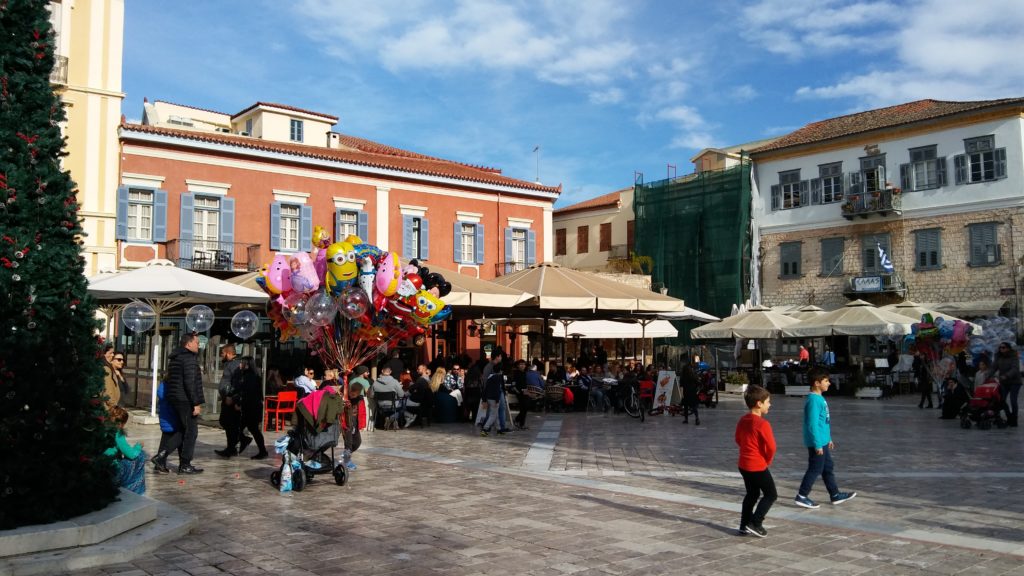
Syntagma (Constitution square)
Nafplio is a highly touristy town. As well as having a multitude of visitors from other countries, Greeks, mainly Athenians, descend in droves for weekend breaks throughout the year. Their favorite pastime here, it seems, is to sit at one of the bustling cafes, either on the promenade, or at the historical Syntagma (Constitution) Square.
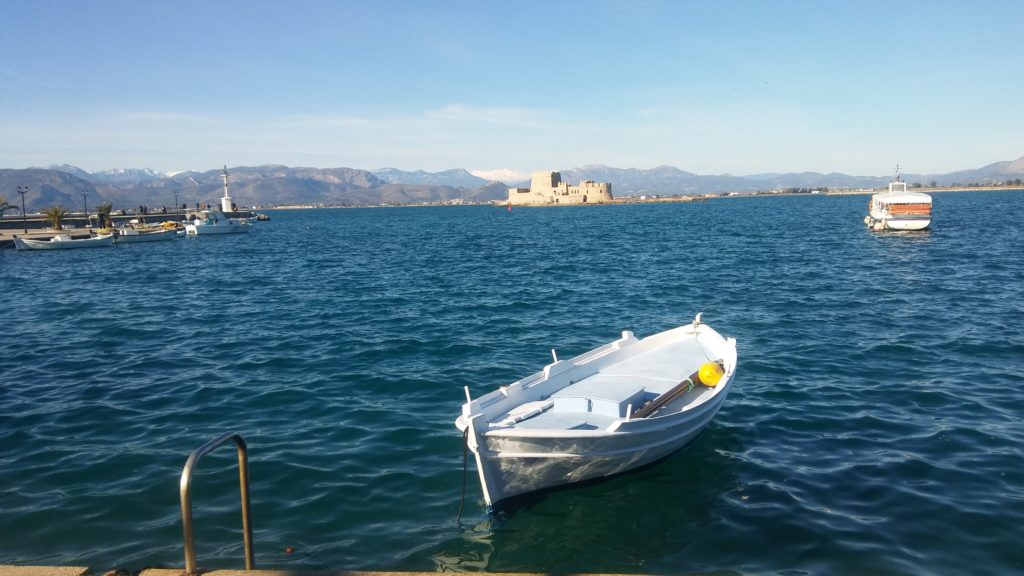
The view of Bourtzi from the promenade (the small lighthouse is visible on the left)
No matter where you are in the old quarter of Nafplio, you will sooner or later wind up in the promenade. Akti Miaouli Street is lined with cafes, all of them offering a picturesque view to the Venetian fort of Bourtzi that stands isolated from town in the middle of the water. Back in the day, a chain connected it to Akronafplia so that unwanted ships could not approach the city. Much later in time, Bourtzi became a prison (the war hero Kolokotronis was jailed here too), then a hotel (19230s – 1960s), and now it’s a popular point of interest for the tourists. Throughout the year, caiques ferry visitors back and forth to it from the promenade. I visited it years ago and took some wonderful pictures, which I plan to share on a separate article. When I do, I will make sure to link up to it from here.
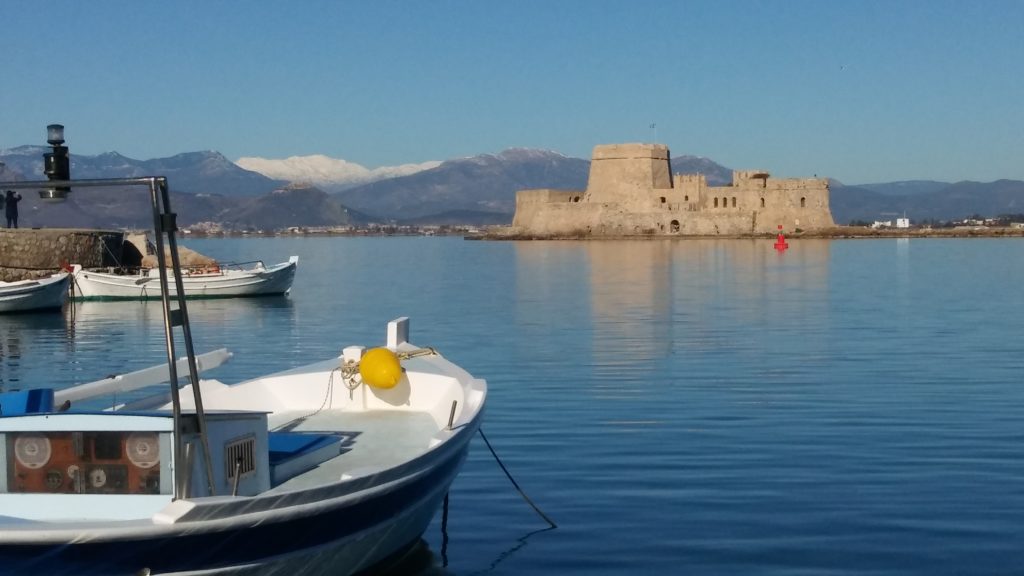
At the end of the promenade there is a tiny lighthouse, where visitors can have a closer view of Bourtzi and the castle of Argos in the distance. On the other side, the view is just as breathtaking:
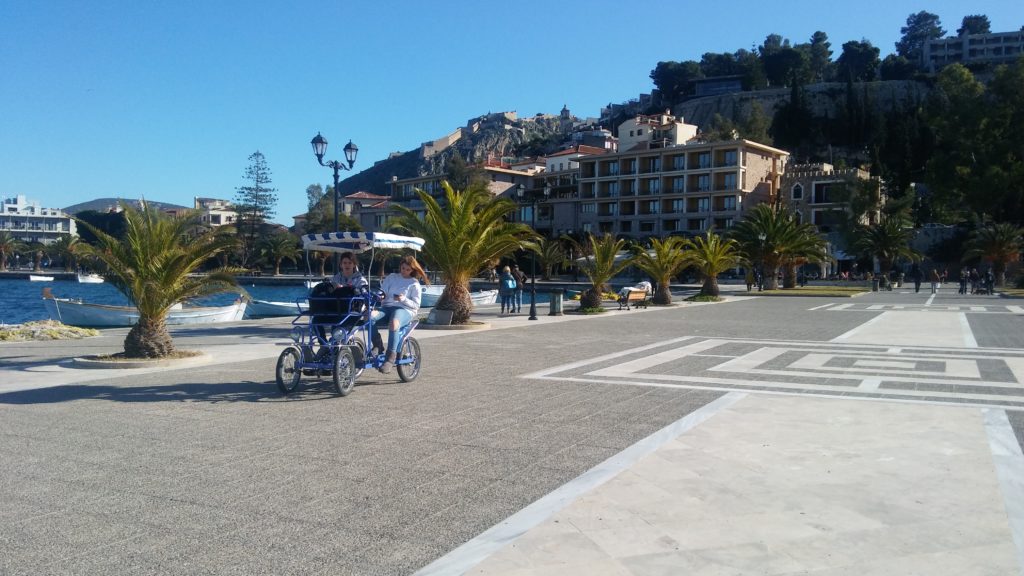
Palamidi and Akronafplia as viewed from the lighthouse
Palamidi castle and the lower hill of Akronafplia crown the old town to an enchanting effect. A visit to Akronafplia is a must, and the ascent on foot is nowhere near as laborious as the one to Palamidi. Actually, I wouldn’t recommend to brave the 999 steps to Palamidi unless you’re seriously fit! On the other hand, Akronafplia should be a peace of cake to get to on foot if you enjoy quiet, long walks.
Akronafplia offers spectacular views of the town and the beach of Arvanitia, as well as a couple of places of interest – the most interesting being the clock tower and the fort ruins. See the section ‘Suggested Walks’ later in this post for details and photos of Akronafplia.
Leaving the lighthouse, one can either head left towards the old town, or head right for a delightful walk to Arvanitia Beach (again, see ‘Suggested Walks’ later in this post for details and photos).
-
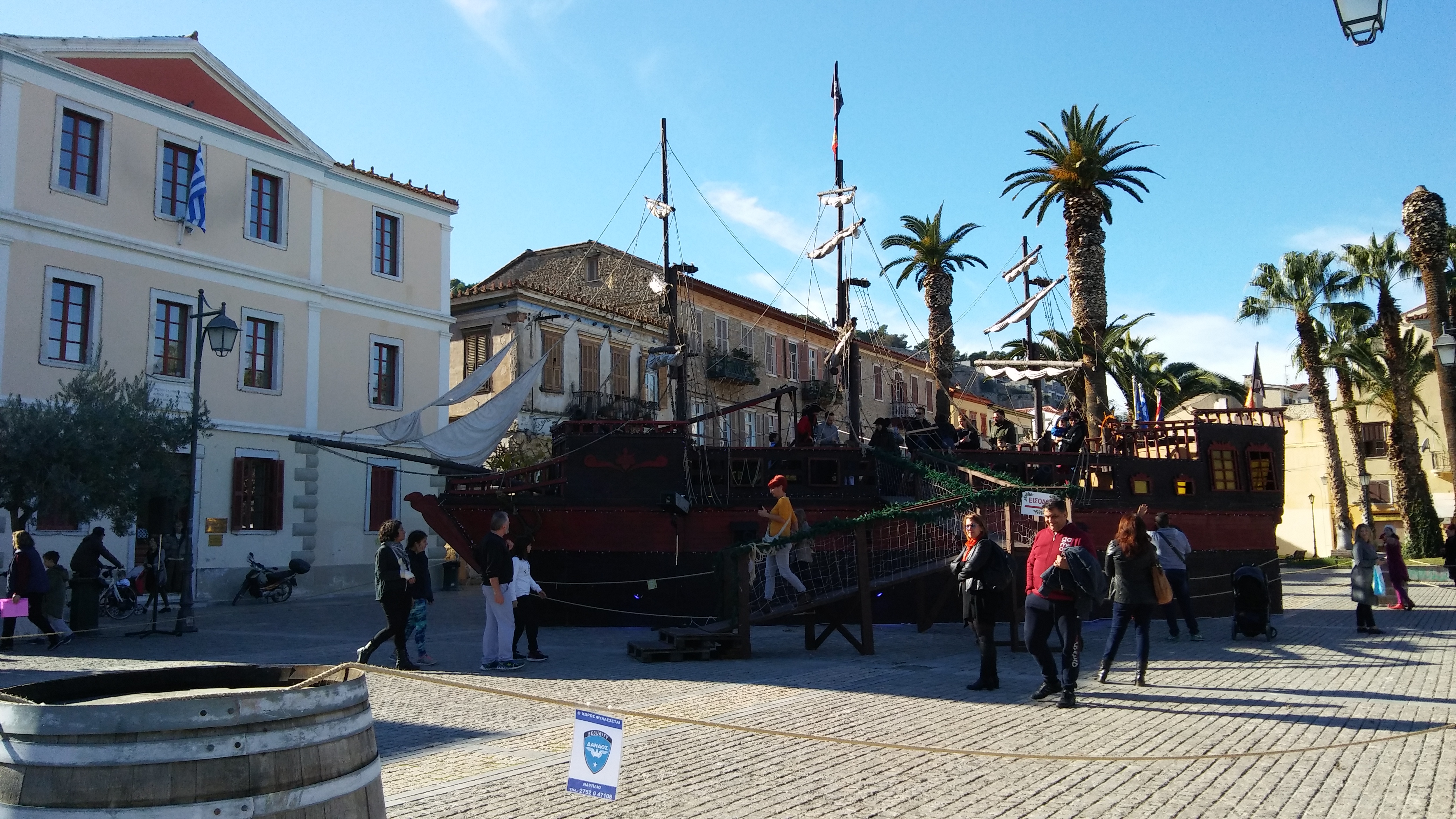
-
Trion Navarchon Square
-
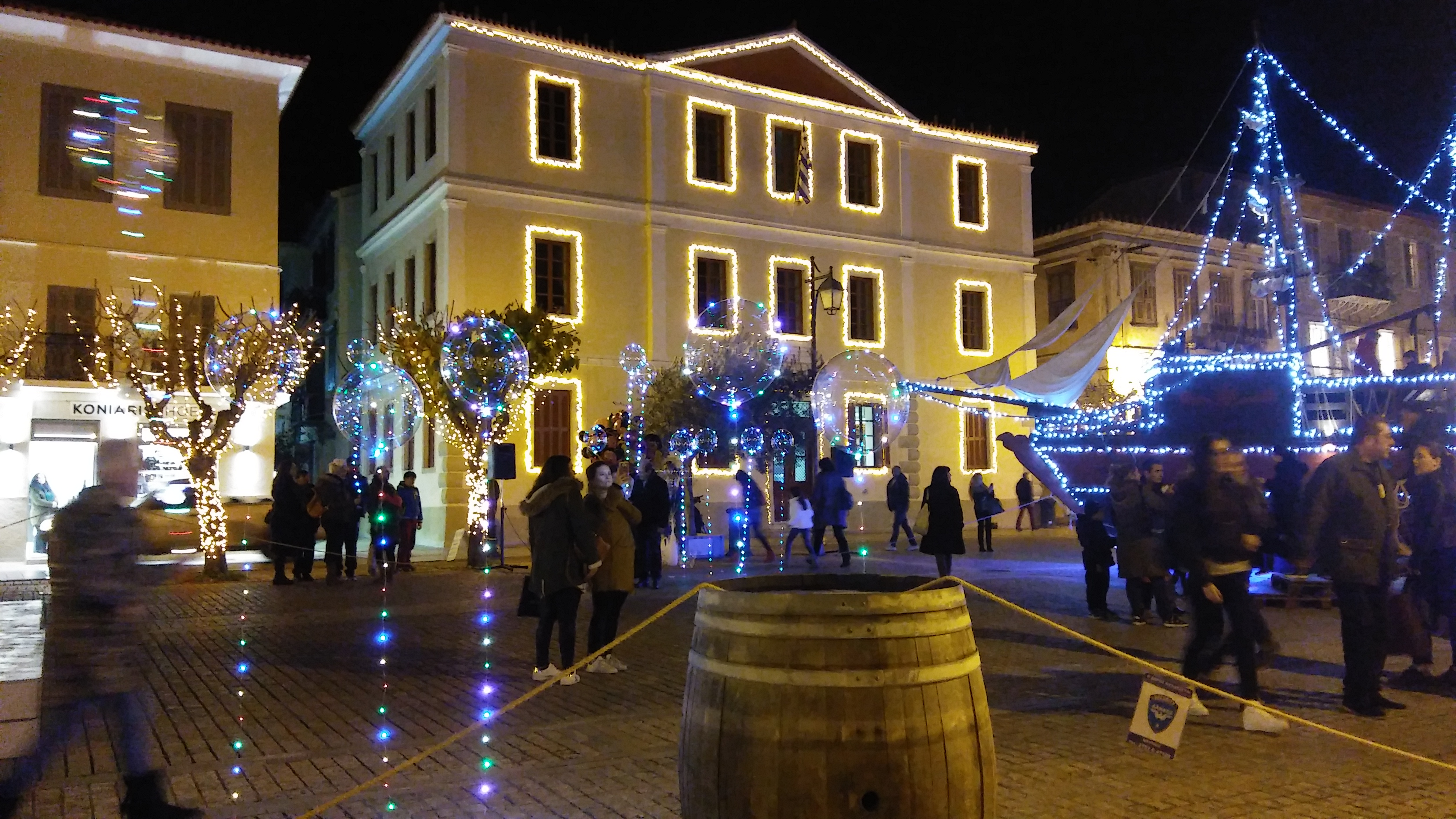
-
Trion Navarchon Square
The photos in this post were all taken around New Year’s Day. The city was decorated beautifully, and a pirate ship was put up in Trion Navarchon Square (Three Admirals). Children’s events took place there every day during our stay.
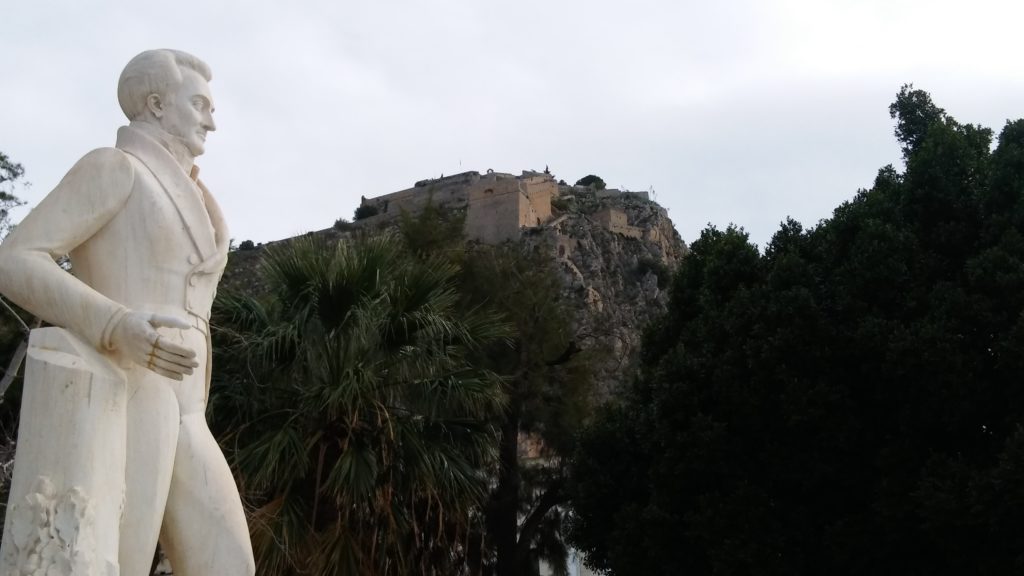
A view of Palamidi from Kapodistrias square. Kapodistrias was the first governor of Greece
The infamous Palamidi is visible from anywhere in Nafplio. To visit it, you can either drive along 25is Martiou Street, then up the hill to its main entrance or, if you dare the exertion, go up its 999 steps that begin from the old quarter near The Land Gate (Pyli Ksiras).
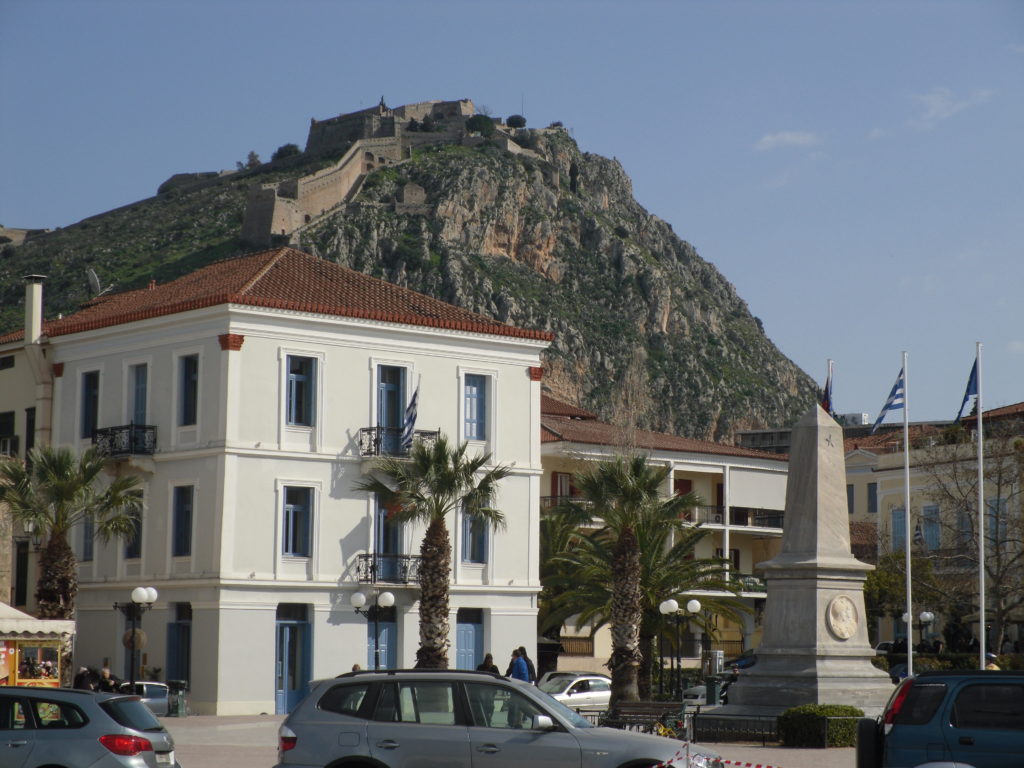
A view of Palamidi castle from Fillelinon (philellenes) square on the promenade
Legend has it that the 999 steps of Palamidi used to be 1,000 but the horse of the war hero Theodoros Kolokotronis broke the 1000th with its hooves. Kolokotronis was one of the prominent war generals of the 1820s who freed Nafplio as well as the town of Tripoli.
In Kolokotronis square in Nafplio, there is a magnificent statue that depicts him on his horse pointing towards Tripoli. A similar statue stands in Stadiou street, Athens, outside the Old Parliament building (now, the National Historical Museum).
Although he was a fervent supporter of Prince Otto of Bavaria and rooted for him to become the king of Greece, when Kolokotronis was an elderly man, and after Otto had become king, he wound up being charged with treason. Even more ironically, he then wound up in a humid, tiny prison in the castle of Palamidi, the very place he once entered as a victor and liberator. The prison is a tiny space carved in the rock and is a claustrophobic sightseeing spot on offer to the visitors of the castle.
Kolokotronis is among the most revered Greek heroes. His infamous love for Greece and his commitment to freedom from Othoman rule brim over in his legendary words – you’ll find them translated into English below to the best of my ability.

“Are you Greek? What are you bowing for? Stand up! We Greeks talk even to the Gods while standing tall!”
“Greece is what we want, and it doesn’t matter if it means we will be eating stones!”
His infamous red helmet is a remnant of his service as major in Zakynthos (Zante) in the British army. The helmet and his armor are on display in the National Historical Museum (Stadiou street, Athens). For more information on the life of this great Greek, go here
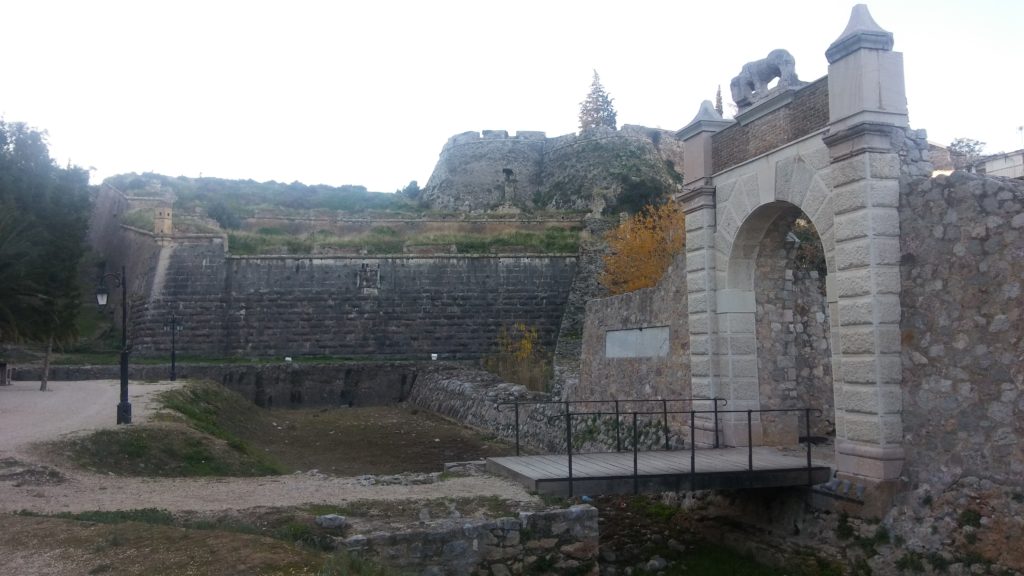
During Venetian rule, Nafplio had the name ‘Napoli di Romania’. The Venetians had fortified the city and had built a single gate one could enter or exit through (1687). A reconstructed version of it survives today and it is called The Land Gate (Pyli Ksiras).
The Venetians had built a canal that ran past the gate and allowed small boats to come in from the sea and moor outside. The gate closed at sun down. Anyone who arrived after that, would have no choice but to spend the night outside. There was a military camp behind the gate – soldiers guarded it and monitored who came and went.
The first king of Greece, King Otto from Bavaria, was offered the key to Nafplio in front of the Land Gate when he was only eighteen years old (in 1833).
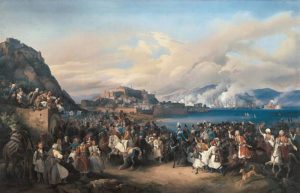
This painting by Peter Von Hess from 1835 depicts the entry of King Otto to the city of Nafplio. The Land Gate is visible in the distance. All three timeless forts of Nafplio are also depicted.
The Land Gate was demolished around 1894 and the canal was gradually filled with soil. Today, it stands reconstructed with the original lion of St Mark on its top, but sadly without its head, wings and tail.
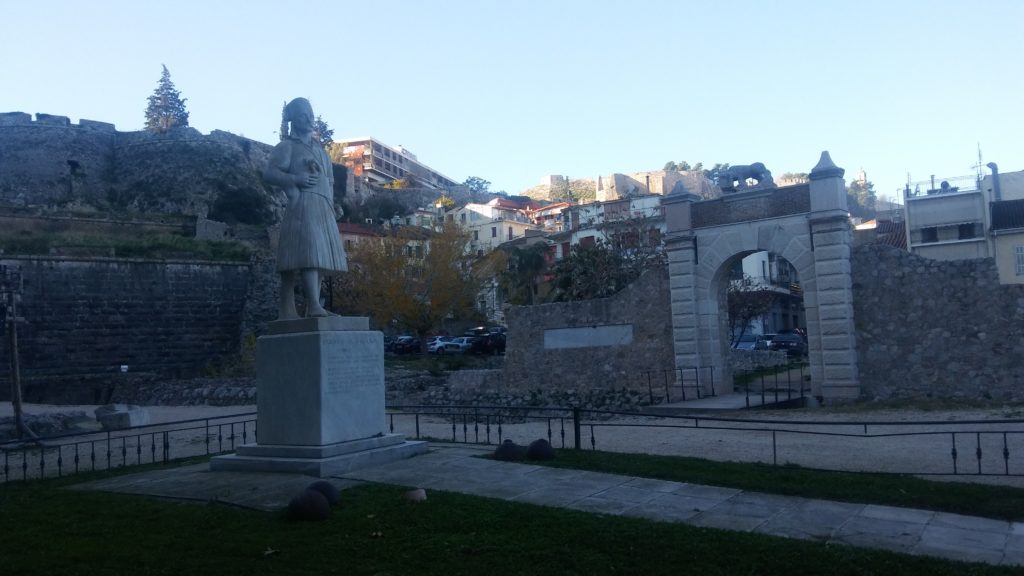
Before the gate stands a monument to a local hero of Nafplio, Staikos Staikopoulos, who freed the fort of Palamidi during the Greek War of Independence.
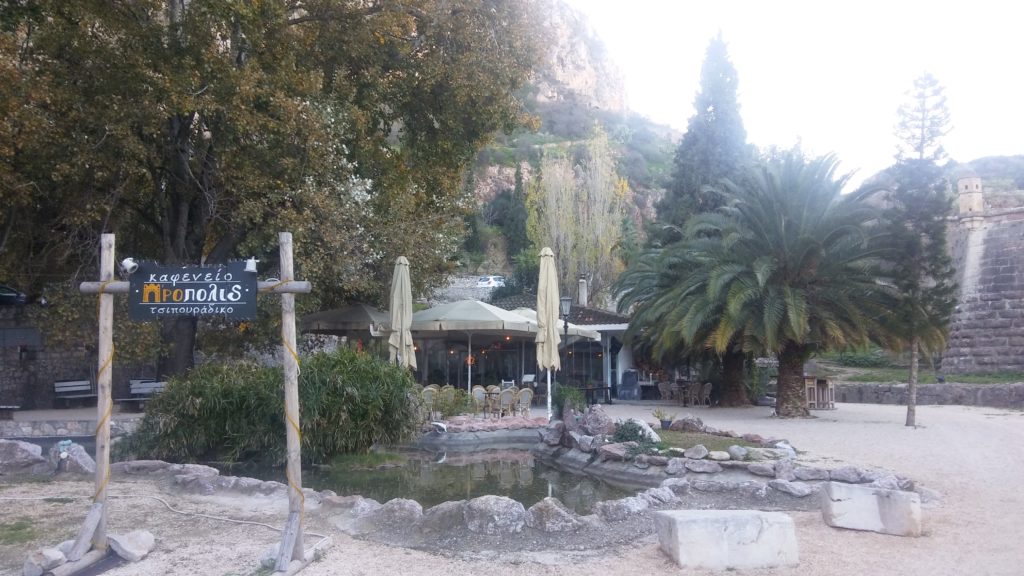
WHERE TO GO FROM THE LAND GATE?
Next to the aforementioned statue is a cafe with artificial waterfalls and a pond. Behind it there are some steps. If you go up to the road from here you can either take the steps to Palamidi (if you dare!!), or bear to the right and carry on uphill to Akronafplia (to the clock tower and the fort ruins) or, where the road divides into two, head down to Arvanitia beach. No matter what you choose, you’re in for unforgettable sea views and scenery (see ‘Suggested Walks’ later in this post for details and photos).
-
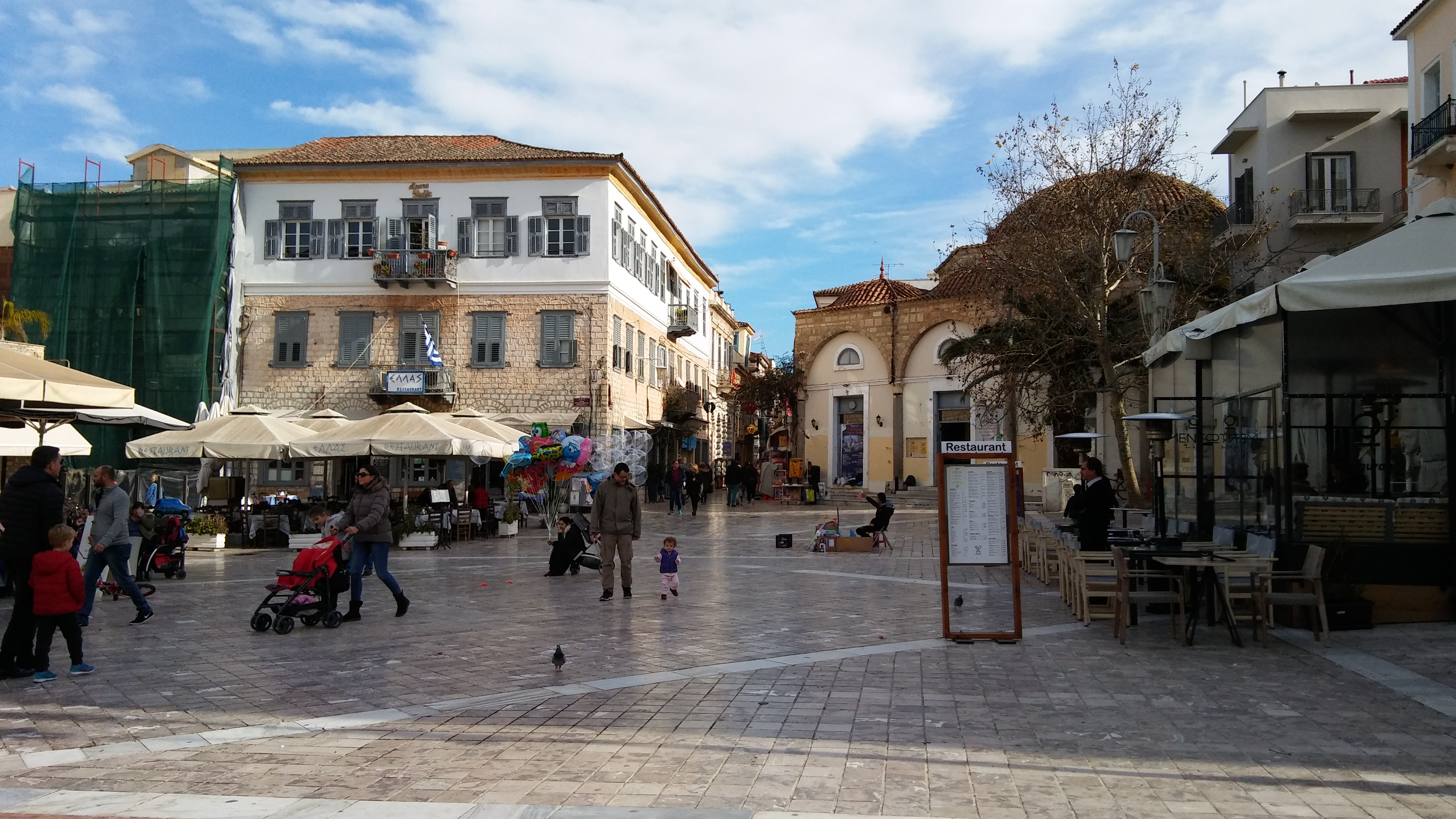
-
Syntagma Square
-
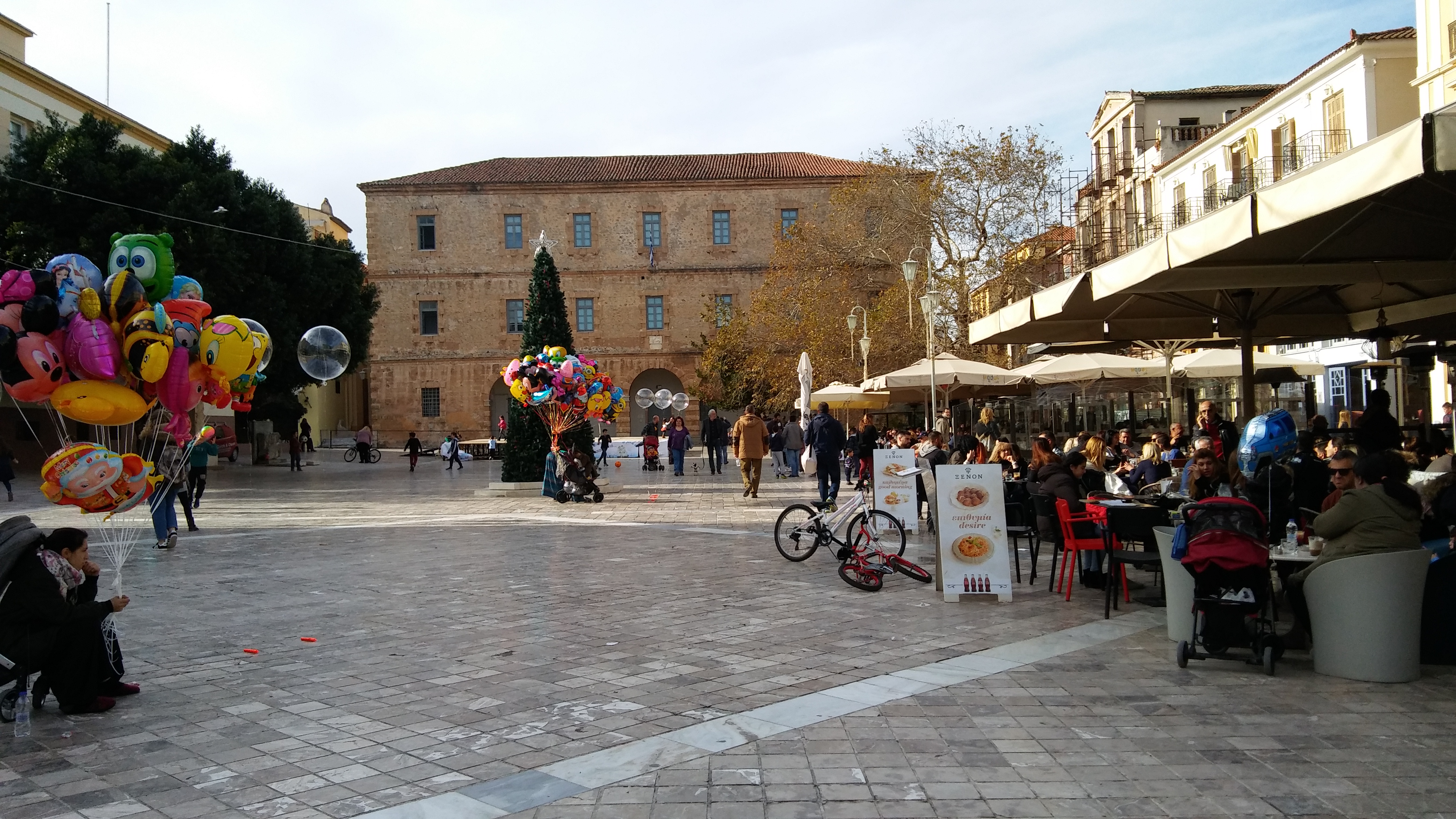
-
The Archeological Museum on Syntagma square
Constitution Square, mentioned earlier for its bustling cafes, is surrounded by magnificent neoclassical buildings, as well as two prominent landmarks: the Archeological museum and the old Mosque (Vouleftikon) with its beautiful dome. The latter was initially a Turkish mosque but when Greece was liberated it housed the first parliament of the newly formed state.
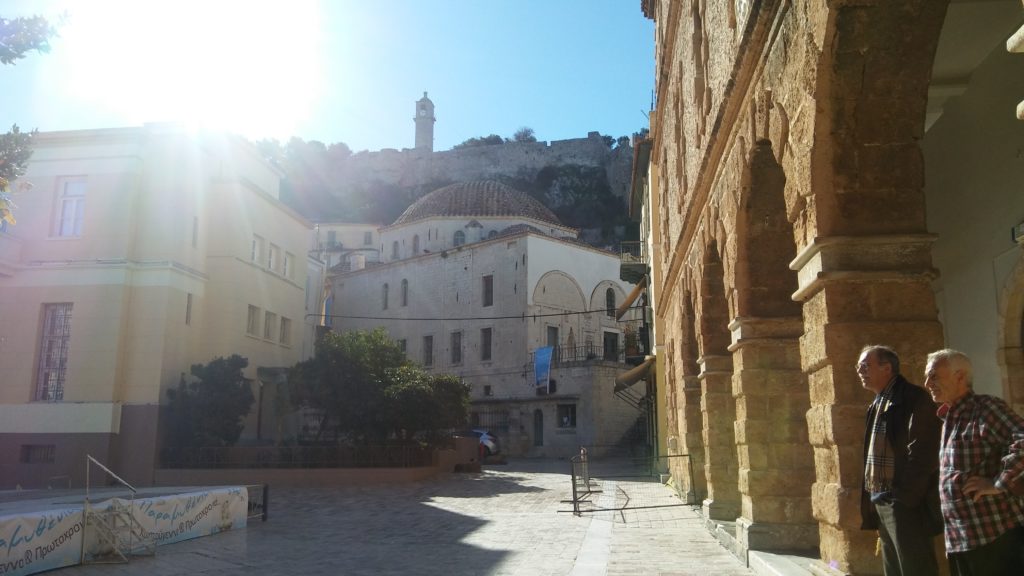
The mosque, which housed the first parliament of Greece, and the old clock on Akronafplia above (picture taken from the facade of the Archeological Museum)
-

-
War museum
-
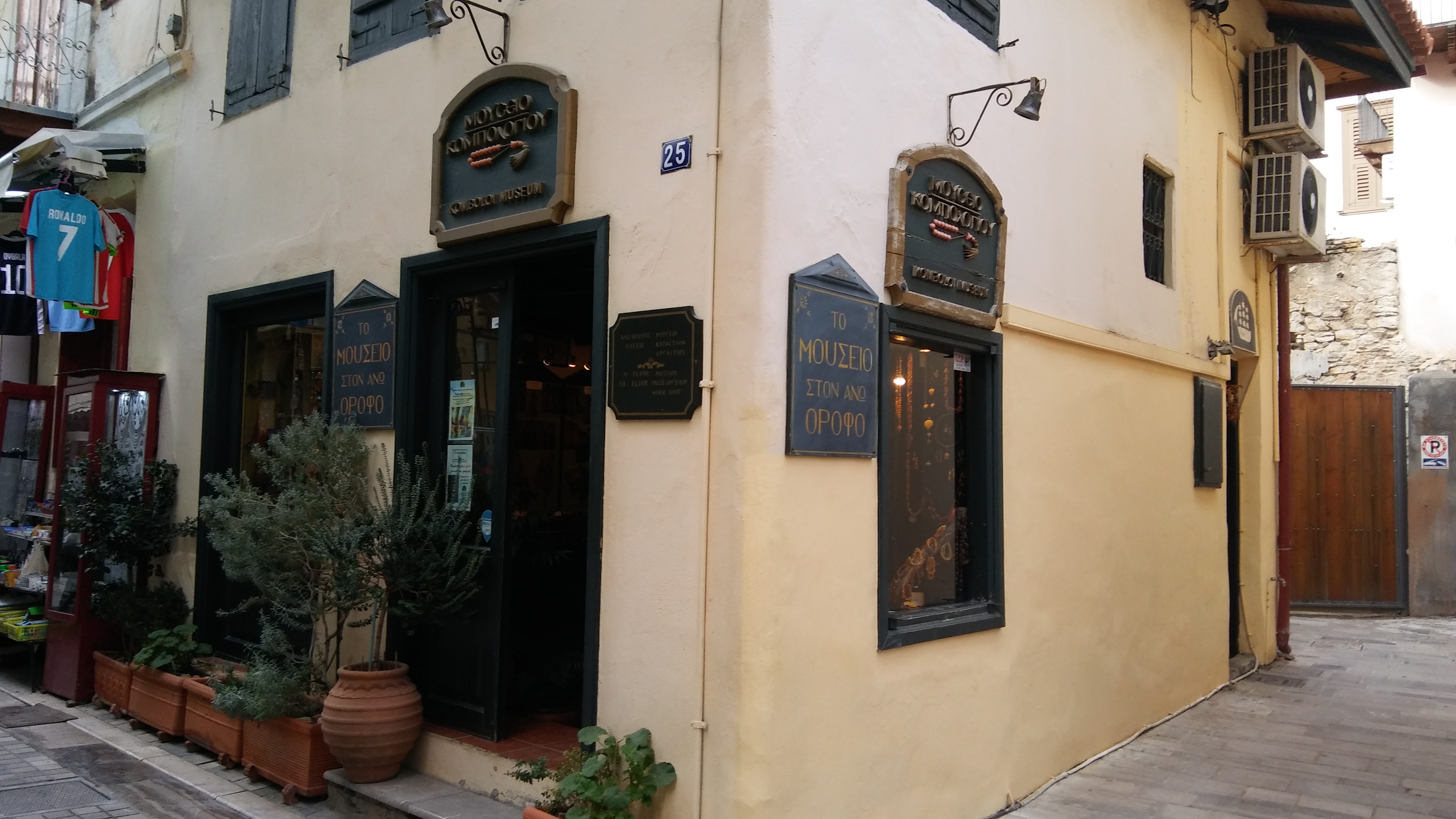
-
Koboloi Museum
Other museums worth visiting are the War Museum and the Koboloi (worry beads) Museum. Both are situated near Trion Navarchon Square.
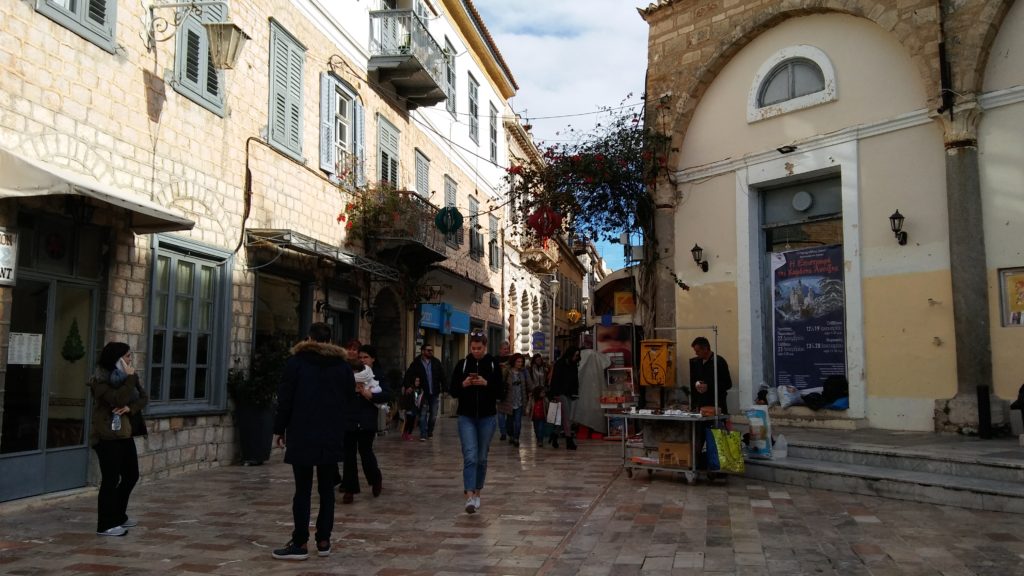
Walking around Nafplio’s lanes is a pleasure in itself. There are many curio shops and wonderful eateries on offer.
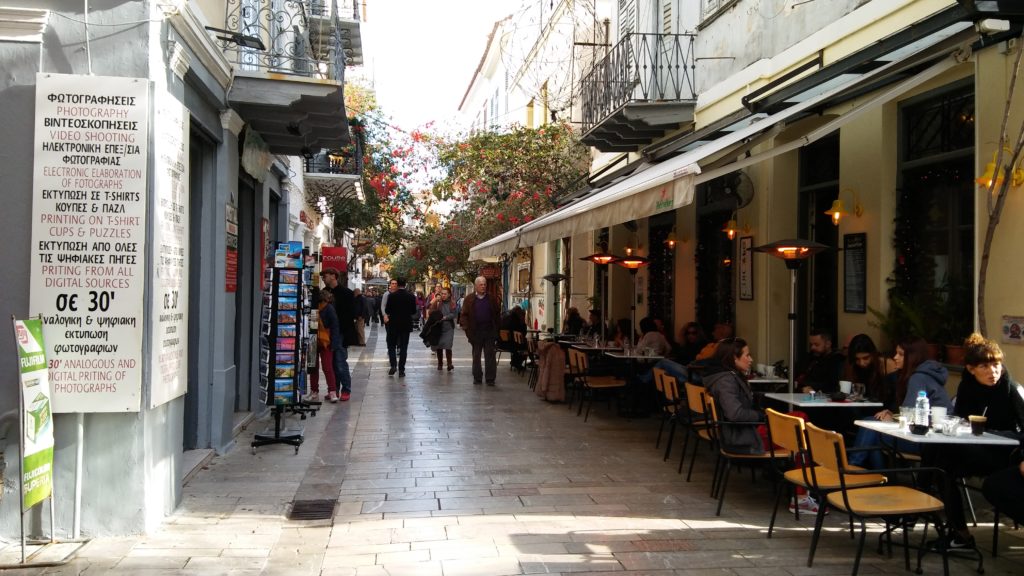
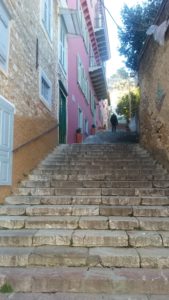
The stepped street of Potamianou near St Spyridon leads to the Catholic church and Akronafplia (clock tower and fort ruins of Its Kale)
Many streets have steps and are so enchanting they simply beg for the amateur photographer to take a snap. These steps on Potamianou Street are situated a little after the infamous St. Spyridon Church (see a little later in this post for the church’s harrowing story!)
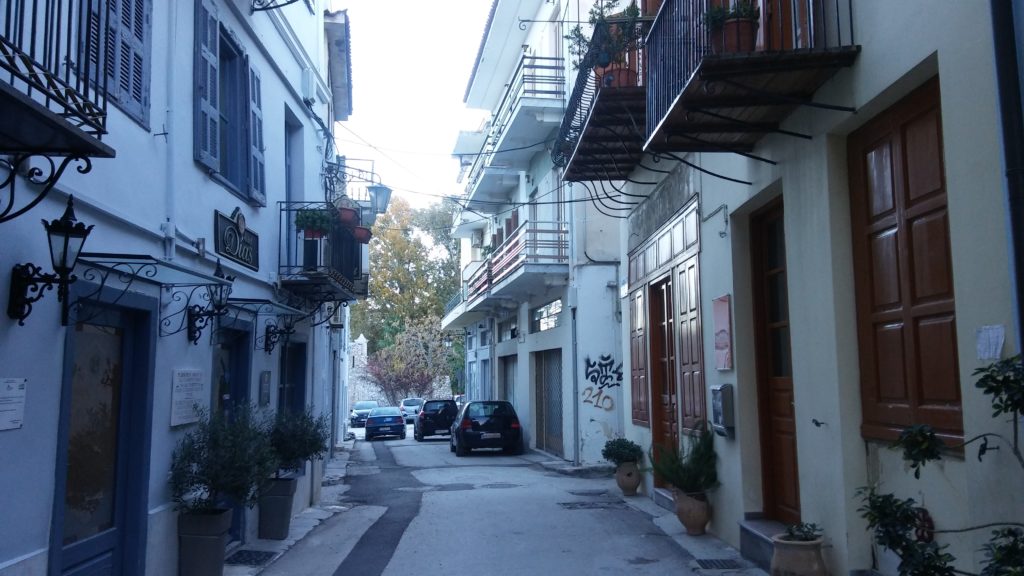
It may not look like much at first glance, but this particular corner (just before you get to the Land Gate from St Spyridon’s Church) gave me goosebumps. The signs on the opposite walls informed me that the house on the left, now Dias hotel, was once the home of Alexander Ypsilantis. Across the street, the one with the brown doors and windows used to be the home of Manto Mavrogenous. To think I was standing on the doorsteps of two legends of the Greek War of Independence left me glued to the spot. I just stood and marveled at the facades, reduced to silence for a while, taking it all in.
-

-
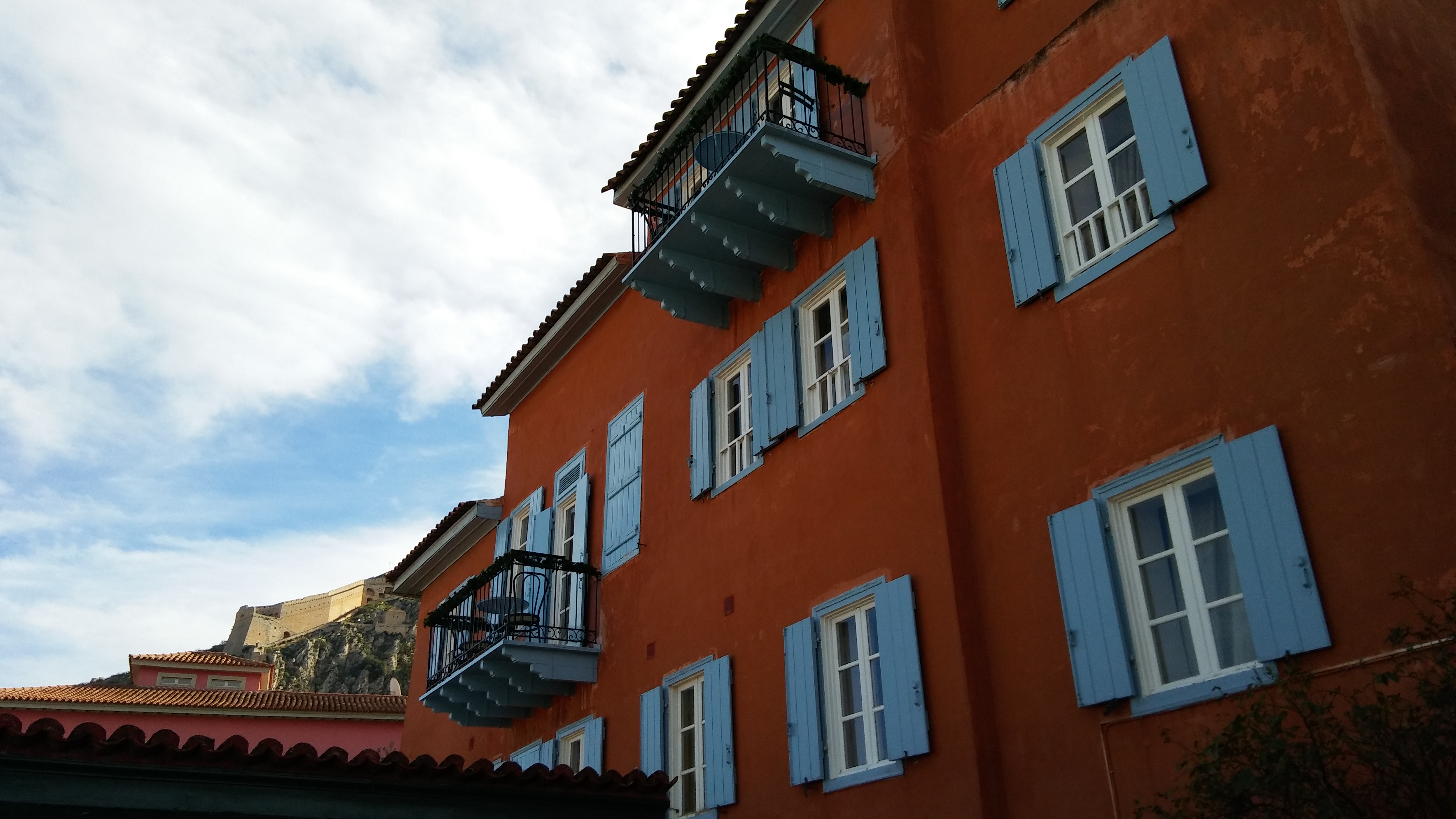
All the quaint streets on higher ground from the busy shops and eateries await to take you back in time, and the antiquated buildings, draped with bougainvillea, take your breath away. This time, I chose to stay at the heart of this district and I am so glad I did. My hotel, Byron Hotel, was the perfect choice and it consists of two old buildings: The one on higher ground (light blue windows) used to be a stately home, then converted into homes for poor families. The owner offered the information that each family would occupy only one room, and the one I stayed in was quite small (albeit uniquely quaint!). It made me very sad to imagine a whole family once had such a tiny space to themselves!
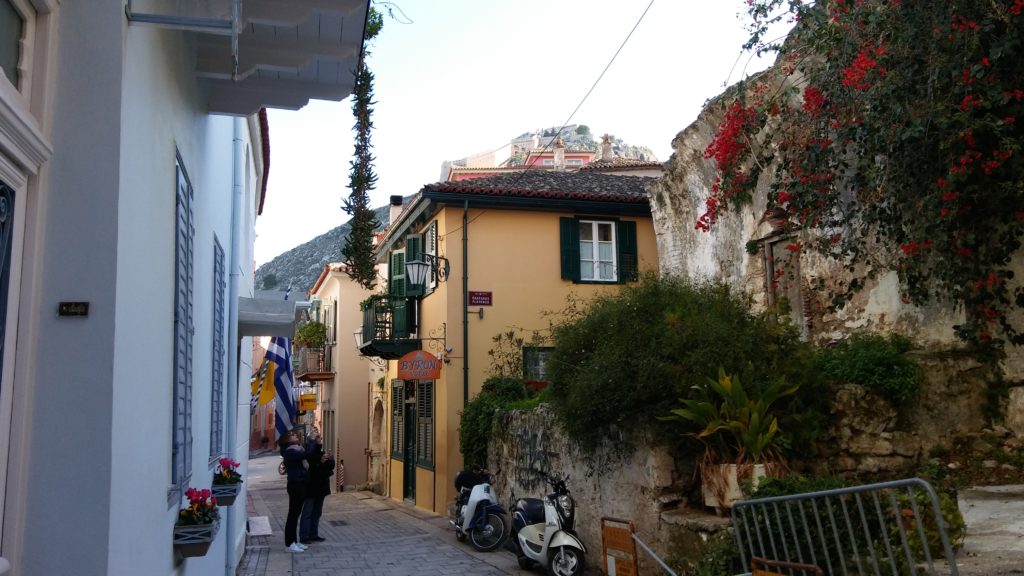
The church of St Spyridon stands opposite the part of Byron Hotel that used to be The French Embassy. After murdering Kapodistrias at the church’s entrance, Mavromichalis found refuge inside the Embassy.
The part of the hotel that stands on street level as well as the church across the street are harrowing parts of Nafplion’s history…
The church of St Spyridon is tiny yet beautiful. Plus, its doorstep has a huge historical value. Kapodistrias, the first governor of Greece, was once murdered at the threshold on his way in to attend mass by two members of a defiant clan of Mani: Konstantin Mavromichalis attacked with a gun and his son Georgios with a dagger. Konstantin was shot on the spot by a witness, and Georgios hid in the French Embassy across the street (Byron Hotel today). He later surrendered and was sent to the firing squad. For a detailed account of Kapodistrias’ assassination, go here
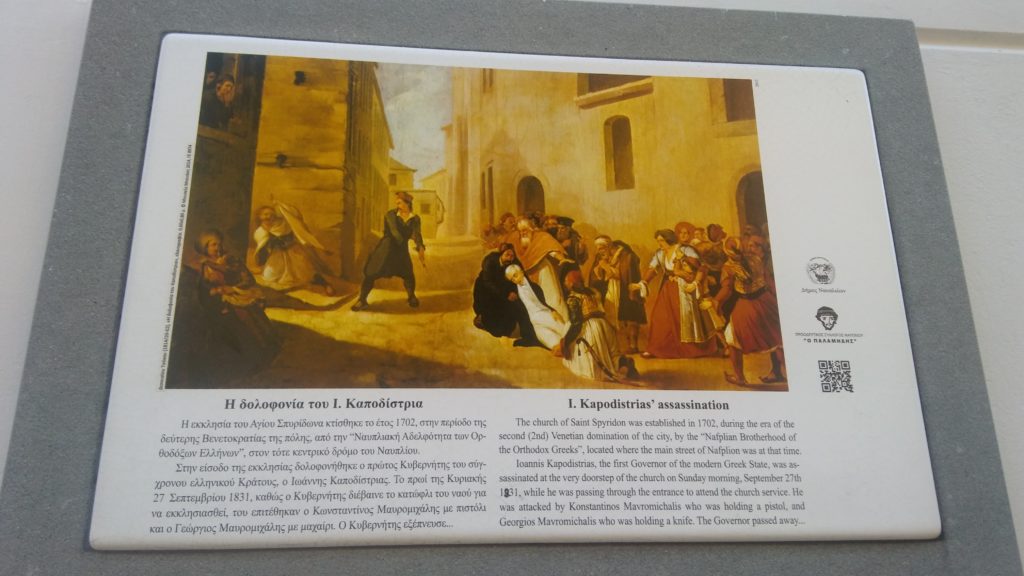
A plaque on the wall near the entry of St Spyridon tells the tale of Kapodistrias’s murder.
Fellow lovers of all things Corfu may recognize Kapodistrias from his statue in Corfu town (as well as from the Kapodistrias Museum in Evropouli, Corfu). Kapodistrias was born in Corfu, and he was a count. After serving in Russia as the Foreign Minister, he came to Greece and was elected the first head of state when the country was liberated from the Ottoman Empire. Highly educated, an able diplomat and a clever man, he is renowned for his trick that got the locals in Nafplio to eat potato!
Kapodistrias brought potatoes to Greece hoping to feed the starving populace but the locals of Nafplio, who’d never heard of them before, were reluctant to try them. As a result, tons of potatoes began to rot in the stores. This is when Kapodistrias assigned men to unload the potatoes on the Nafplion docks and to guard them night and day, while ordering the men to turn a blind eye should the locals attempt to steal. In a very short time, now realizing they were missing on something that had high value, the locals raided the goods and soon there was nothing left!
As serendipity would have it, I was watching a documentary about Paris the other day, and it mentioned a French pharmacist called Parmentier who used exactly the same trick in Paris (way before the Greek incident with Kapodistrias). The Parisians even thought the potato was the work of the devil, but Parmentier’s ploy, with the use of guards, was a success. I chuckled no end, and now think it’s quite probable that Kapodistrias, well-read as he was, may have taken a leaf from the French man’s book 😛
Living in Byron Hotel made it so easy to imagine the bygone era of the 1800’s… the decoration made sure of that, and the total energy of the place did too. Everyone among the staff was hospitable and eager to help. We loved the generous breakfast in the indoor sitting area, and especially the bookshelf! Being typical bookworms, Andy and I always chose to sit by it during breakfast (and in the evening for a gratuitous cup of tea) so we could browse at the books.
We both felt we should return in the summer, if only to sample the quaint outside sitting area too. It’s on the terrace of a derelict building next door that once housed Turkish baths.
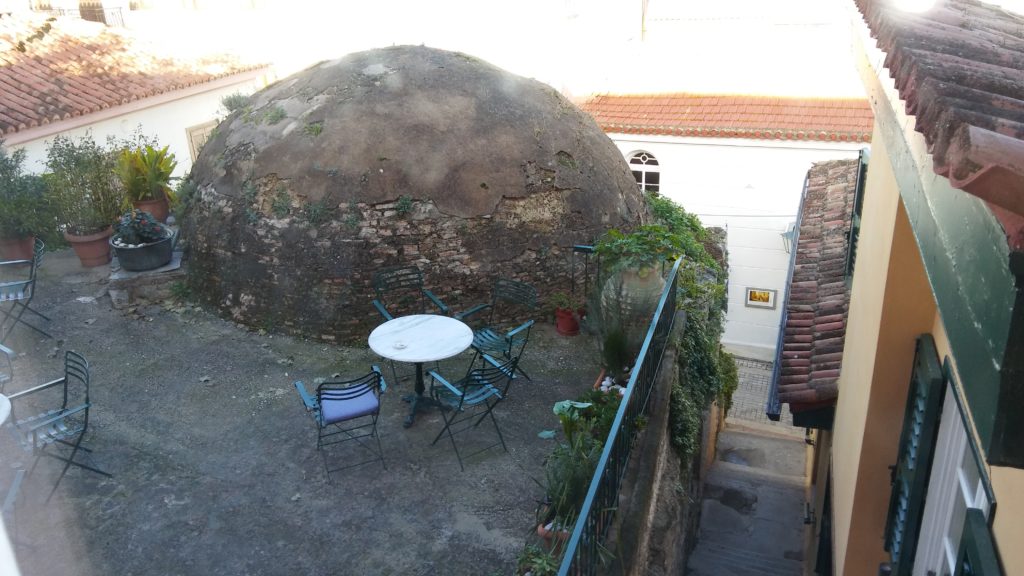
Guests at Byron Hotel can sit out in the summer on the terrace of a derelict building that used to house Turkish baths
SUGGESTED WALKS
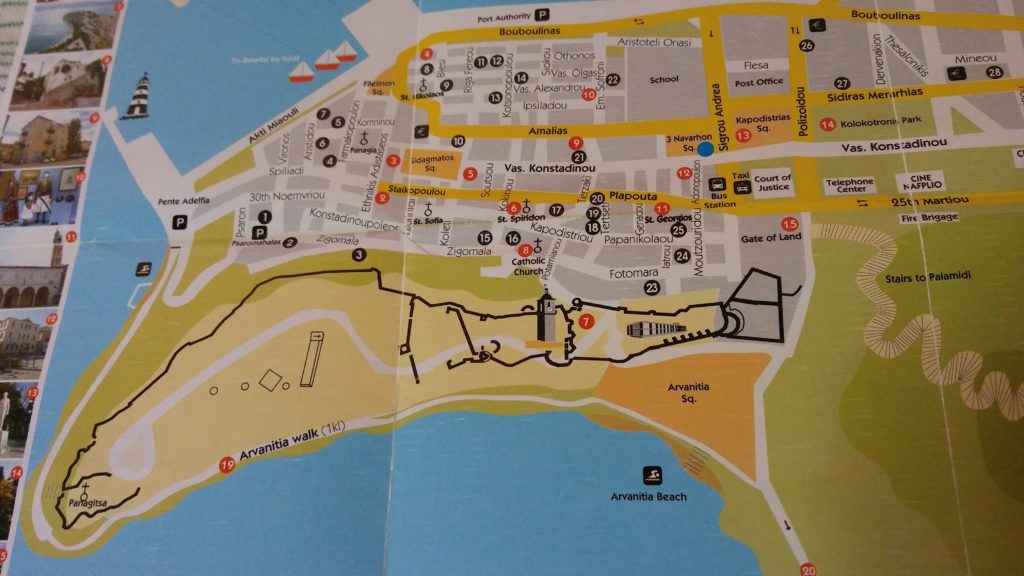
A WALK TO AKRONAFPLIA (AND ARVANITIA BEACH), STARTING FROM THE LAND GATE
In the above map, the squiggly line on the right represents the 999 steps to Palamidi. The Land Gate stands across from it (‘Gate of Land’ on this map). From there, if you walk alongside the old fortress wall on the right, around the bend the road splits into two (at Arvanitia Sq). From here you can either go left (downhill) to Arvanitia beach, or take the road right (uphill) that leads to Akronafplia (clock tower and the fort ruins of ‘Its Kale’). Arvanitia Square is very plain – just an open asphalted space. See later in this section for the easiest way to go to Arvanitia beach from there as this is not clearly shown on the map.
If you take the uphill road to Akronafplia, you are soon rewarded with spectacular sea views…
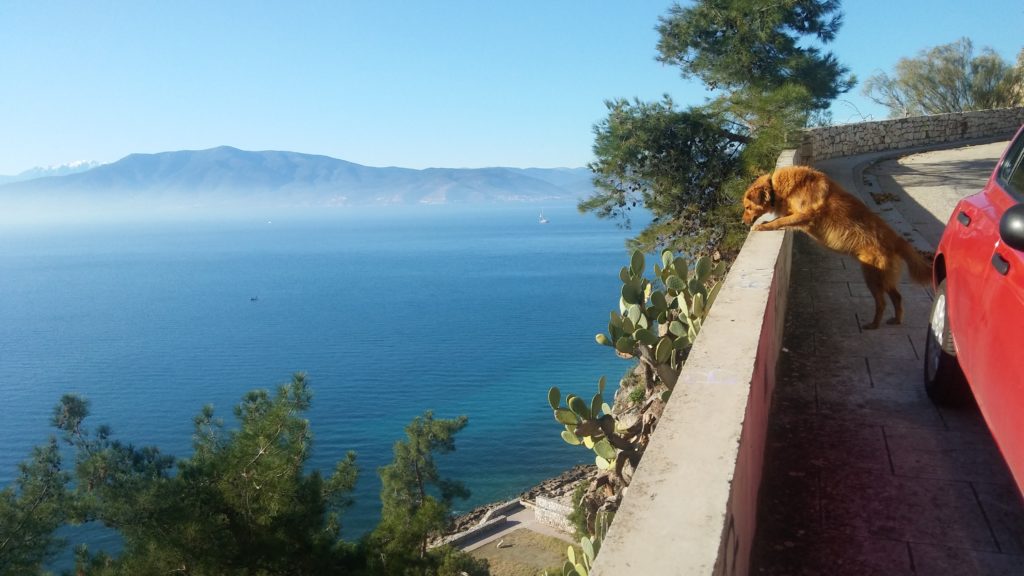
Behind you, the view to Palamidi is just as stunning – a magical place to be!
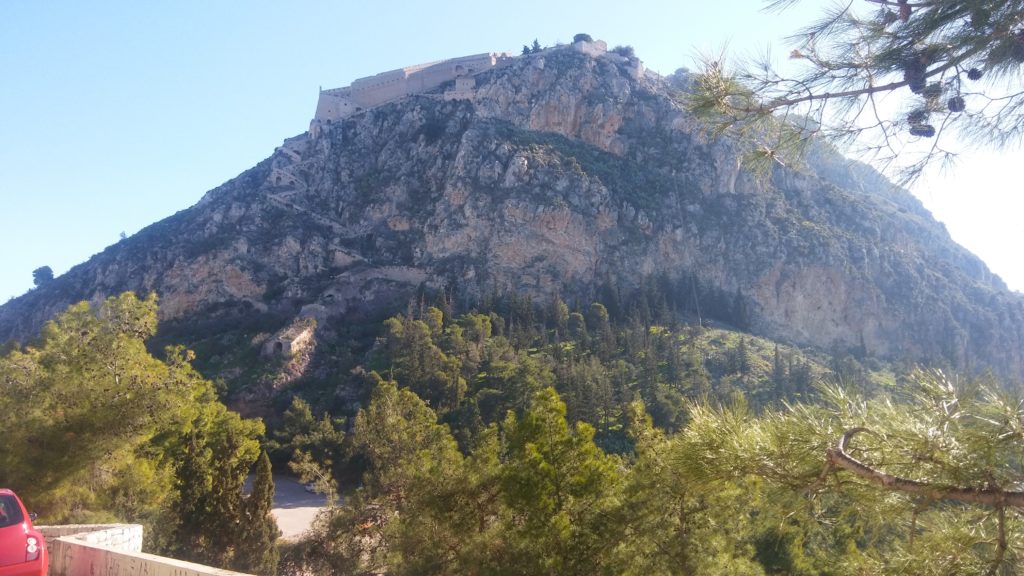
Go past the derelict hotel, and you’ll soon enter the old fortress area. The road is paved here, and your transportation back in time begins…
The fort of Akronafplia (or, Its Kale – ‘inner castle’ – as the Turks called it) has housed armies of various countries over time. Originally built by the Romans and Byzantines, it once housed the city itself. Later, Venetian, Turkish, and Greek armies used it, the Turks conquering it twice. The fort even housed Bavarian soldiers at some point; they were appointed here as the guard of King Otto. When they died during a typhoid epidemic, a cemetery was created for them in town and a beautiful Bavarian Lion was sculpted in the rock at the burial site to honor their memory.
NOTE: The lion still survives today and the old burial site is now a park (the remains of the Bavarian soldiers are now kept in the Catholic Church). To see the lion sculpture, get to 25is Martiou Street, and turn left to Mihail Iatrou Street. The Bavarian lion is past the church of Agion Panton. For pictures and more information about the lion, go here. For a map, go here (marked as ‘sleeping lion’).
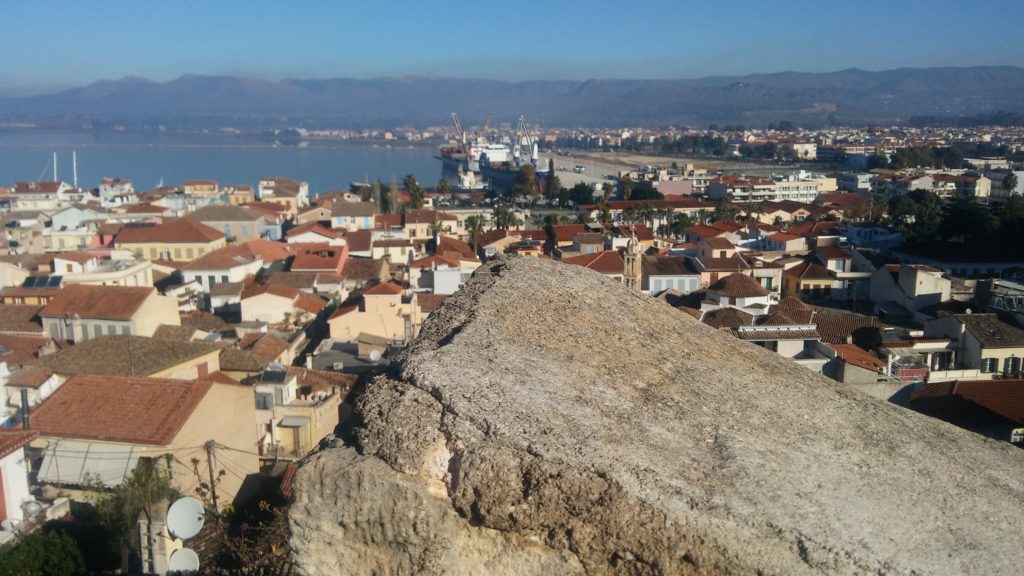
As you continue your uphill climb past the fort ruins of Akronafplia, you’ll soon begin to find spots with breathtaking views to the city. This is also the case when you reach the clock tower.
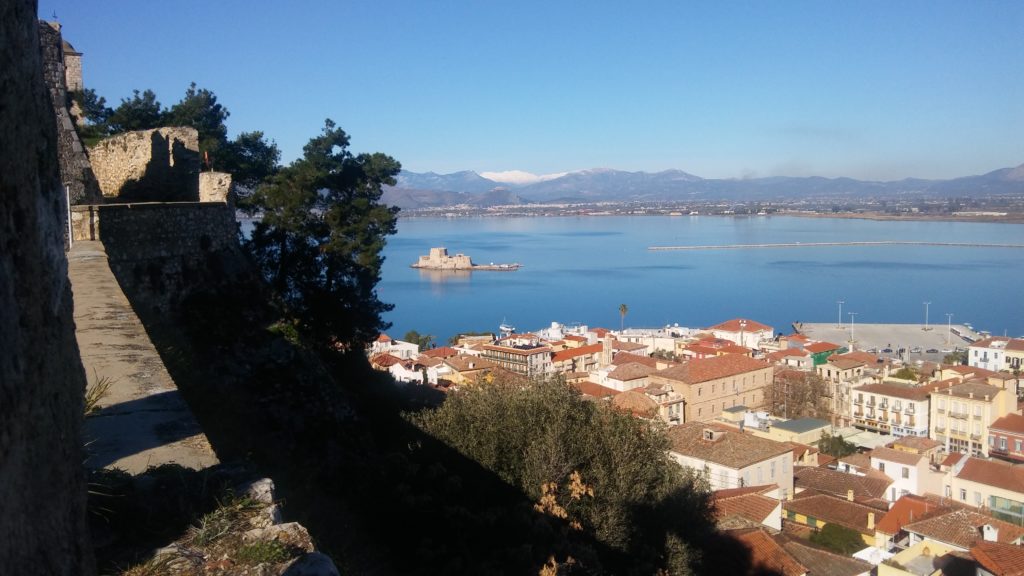
The clock tower is a wonderful spot to enjoy the sunset from. The clock and its original tower were placed here during the rule of King Otto. In 1944 the German Army blasted the tower as it stood in the way of their artillery guns. The locals saved the clock from destruction and Greek poet Terzakis wrote a wonderful poem that spoke of a day of freedom where the precious clock of the city would sound again. That day came to be in 1949 when a new tower was constructed in the same place and the old clock took pride of place upon it.
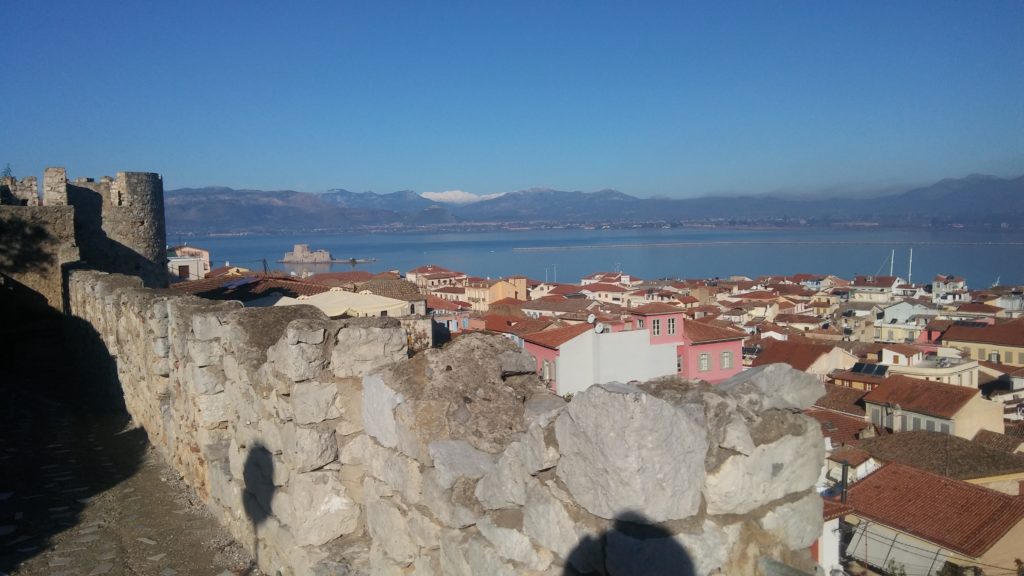
Leaving the clock behind, you soon get to a point where you can either continue downhill (bungalow roofs of a hotel are visible in that direction) or turn left. I suggest you go left. It’s a very short walk from there to the helipad where the road ends. This spot offers, in my opinion, the best views of Akronafplia:
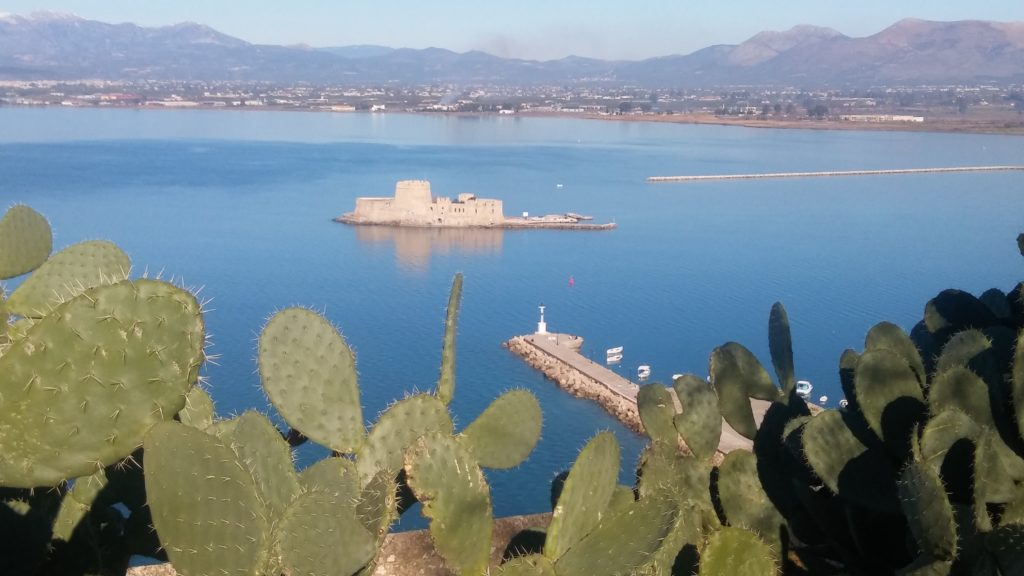
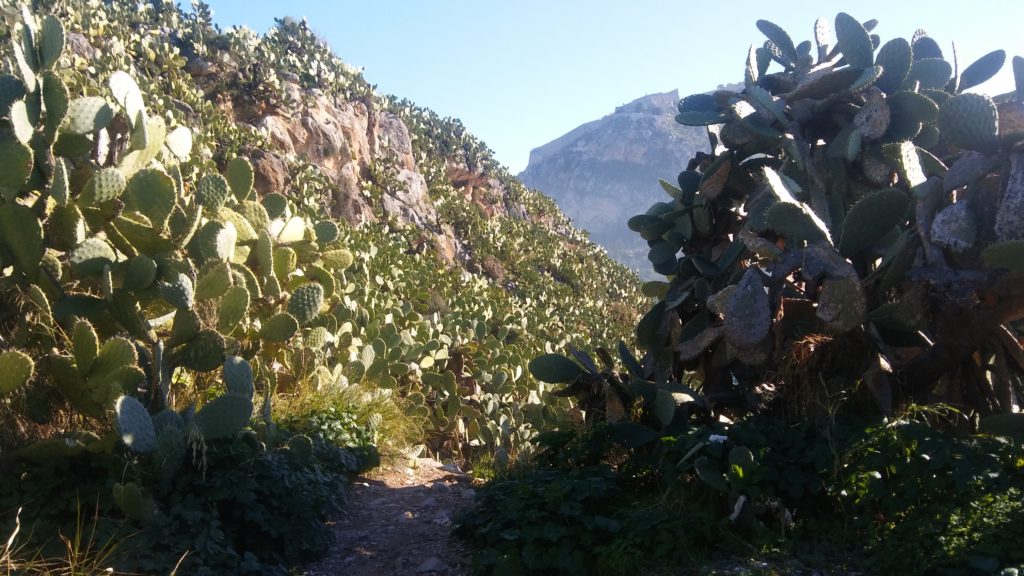
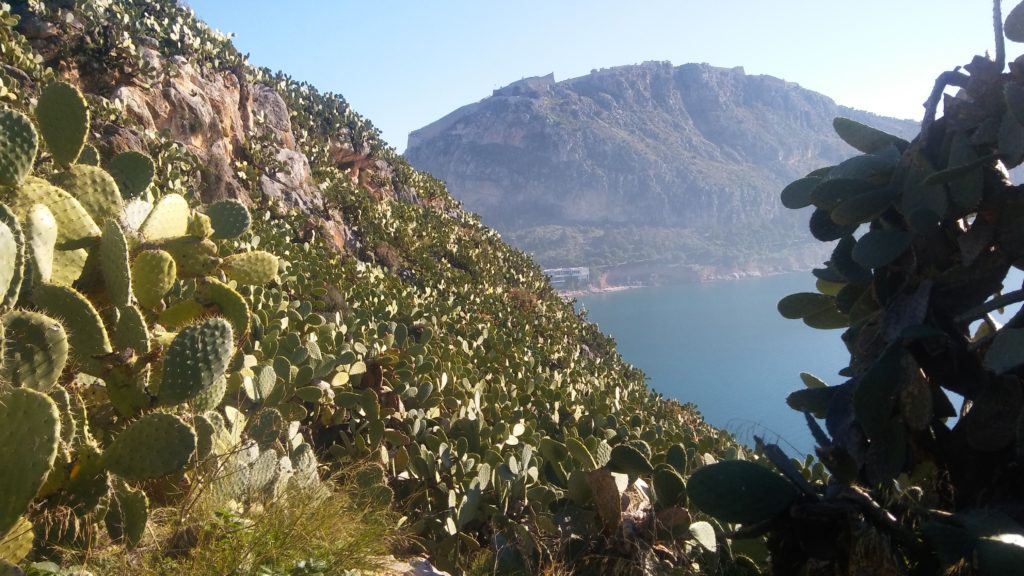
Palamidi as seen from the helipad on the top of Akronafplia
This view of the slope covered by ‘Fragosykies’ (Opuntia ficus-indica) with the Palamidi in the background rendered me mesmerized. I hope the pictures can convey some of its beauty. The plants were laden with ripe fruit, but I doubt anyone would ever dare venturing down that perilous slope to get them! I risked just a few steps in that direction, enough to admire the view, and it left me truly breathless.
Head back down the same way you went…
NOTE: Another way to enter the fort of Its Kale (instead of starting your walk from the Land Gate) is to enter through its original gateway that survives today, complete with a Venetian lion emblem. You will find it as you go up the steps of Potamianou Street past the Catholic church (earlier in this post I included a photo of this stepped street that’s near St Spyridon Church).
If you fancy a quick descend down to the beach, go to Arvanitias Sq (see map) and find the path through the trees on the very right of the square.
Most people would be quite tired by this point (I know I was!) so I don’t recommend heading back to town along the beach past the lighthouse (see map – it’s about 1 km away). I suggest therefore that you go back to the Land Gate (a very short walk) where you can sit at a cafe to relax with a drink.
By all means, if you have the stamina to keep going, here’s the way to get to the lighthouse from the beach: Go down to the rocks by the water’s edge and head right (you can walk easily on the flat rock surfaces but comfortable/non slippy shoes are a must). At some point you will find a few steps that will take you to a coastal road. The walk from here to the lighthouse is very picturesque – I share it with pictures in the next section.
A WALK TO ARVANITIA BEACH STARTING FROM THE LIGHTHOUSE


From the lighthouse, turn right (to a quiet coastal road) to get to Arvanitia beach.
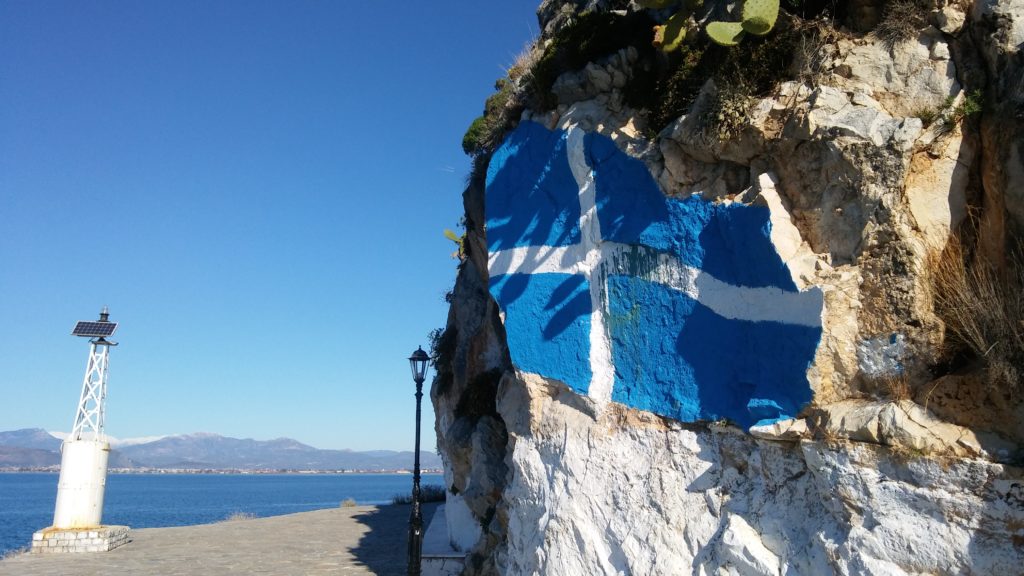
Around the bend, beautiful corners will start to make you smile…

Just like on the top of Akronafplia, the slope here is covered with ‘fragosykies’ too (prickly pear or ‘opuntia ficus-indica’, in Latin). They were laden with fruit during my last visit.
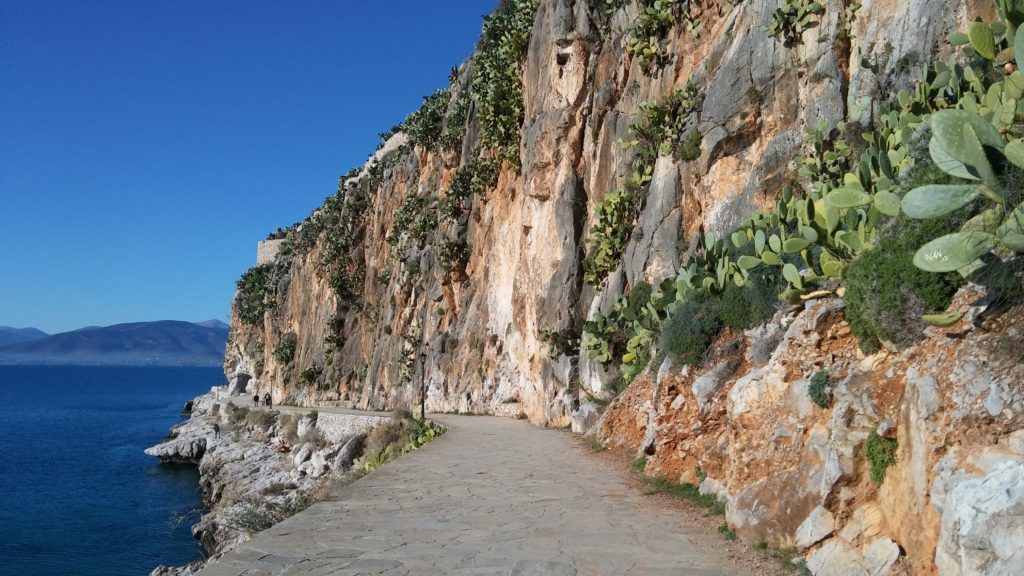
Visitors have carved initials and dates on the plant leaves all over the place so, chances are, they will attract your attention too. If you’re not familiar with this plant, do not attempt to touch its fruit or cut it off. It’s not called a prickly pear for nothing 😛
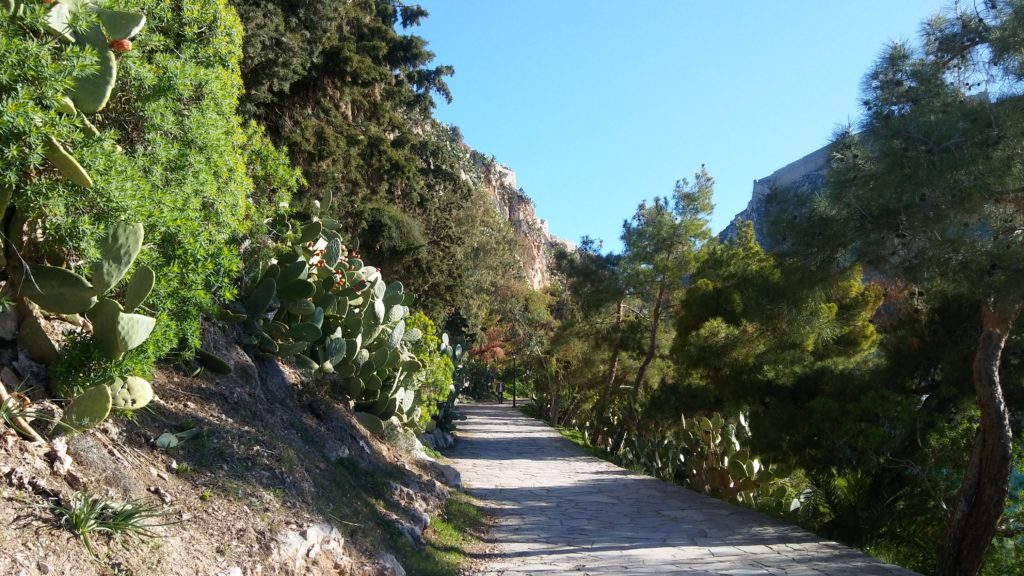
This is quite a short walk that you can enjoy leisurely on an even slope throughout. Before you know it you will be on the beach. It is frequented by swimmers throughout the year and you’re bound to spot at least one!

WHERE TO EAT IN NAFPLIO
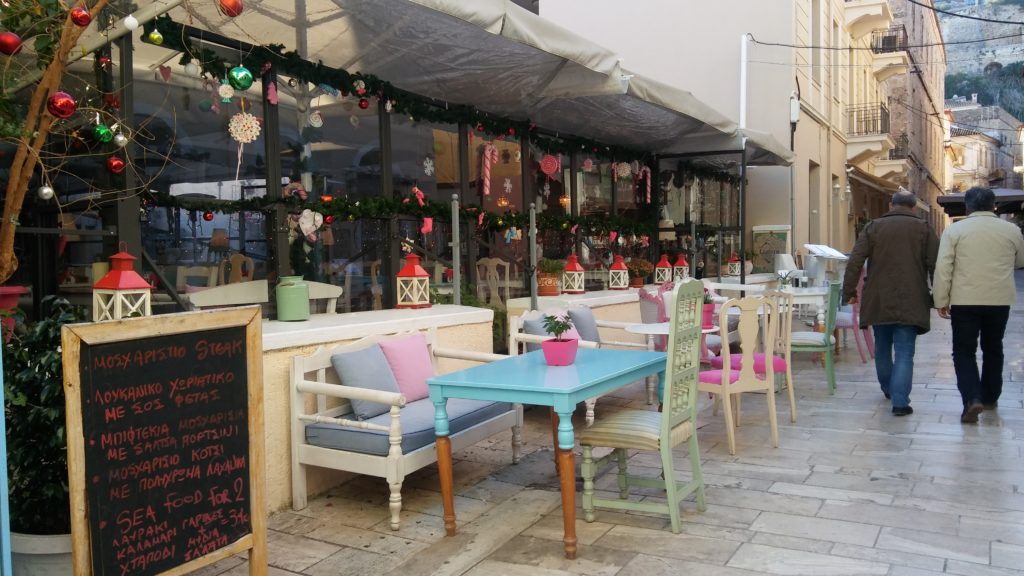
I must start with my favorite – Liatero! It is a new restaurant that brims over with doll-like quaintness. Its pastel colors are bound to catch your eye! The added bonuses are the attentive, courteous stuff and the food that’s out of this world yummy. Try the linguine with sun-dried tomato and rocket, or the hand-made ravioli with spinach and sweet myzithra cheese from Naxos – then you’ll know what I mean! They also serve meat, fish, and seafood dishes.
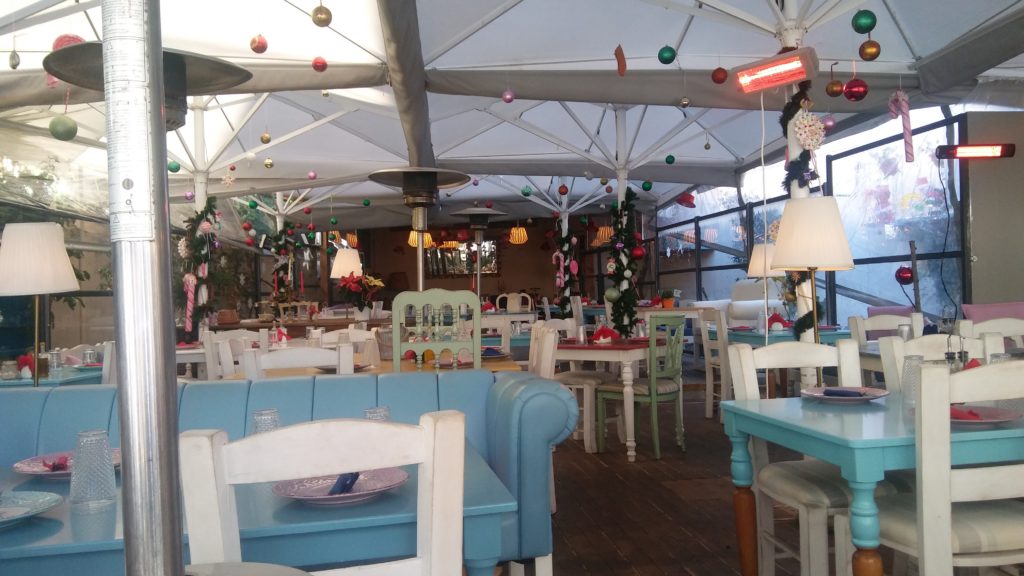
To get to Liatero, leave Syntagma square past the right side of the Archeological Museum and turn right towards the promenade. You will see it in that lane – can’t miss it.
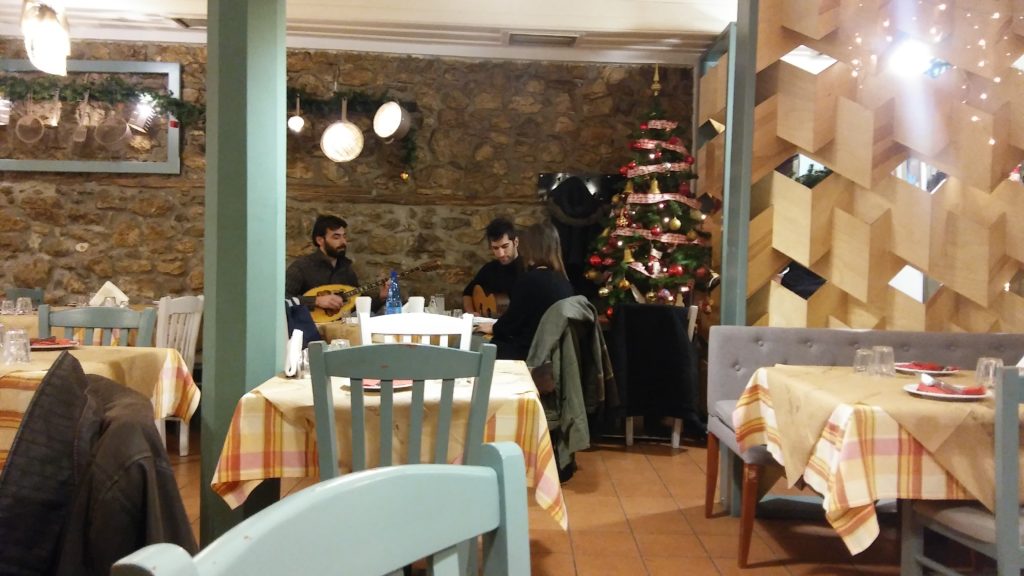
We enjoyed dinner in Vasilis taverna with live laiko and rebetiko music – a wonderful dining experience.
OTHER RECOMMENDED EATERIES:
VASILIS: Family taverna, traditional Greek food. Live music on some nights (Staikopoulou street)
CHRISTOFOROS: Family taverna, traditional Greek food (Staikopoulou street)
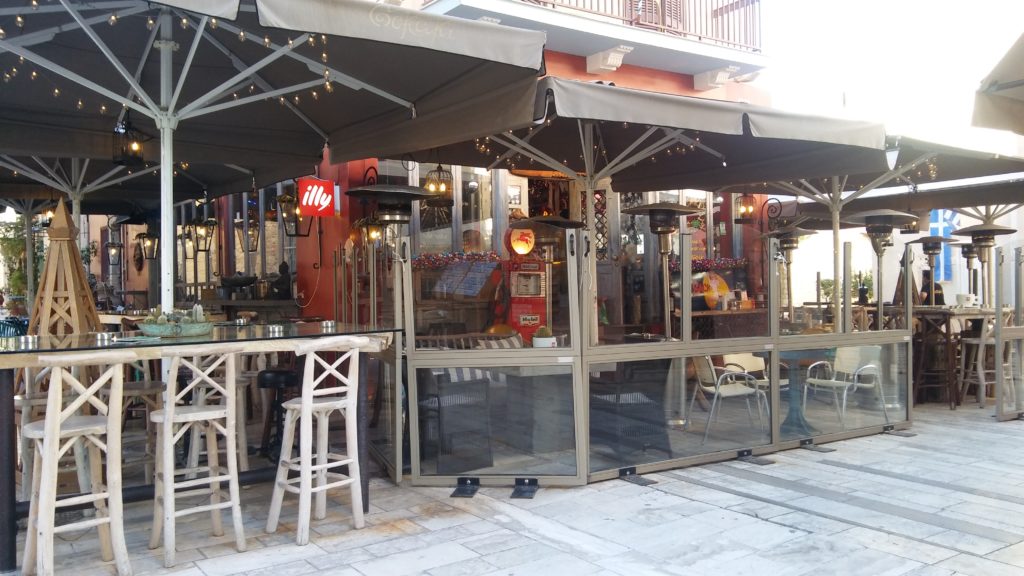
Sokaki cafe/restaurant. Venture inside for its impressive decorative features!
SOKAKI: (Cafe/restaurant) Salads, crepes, quiche lorraine, burgers other dishes. Great indoor decoration. To find it, leave Syntagma square from the right side of the Archeological Museum (as you head to the promenade). You will see it in front of you, standing in a corner.
ARAPAKOS: Family taverna, traditional Greek food – live music on some nights (Bouboulinas Street, on the promenade)
KAKANARAKIS: Housed in the former King Otto Stables (Vasilissis Olgas Street)
GYROKOMEIO GRILL: Souvlaki and other cheap eats. Good value for money! (Sidiras Merarheias street)
SOUVLOMAGIES: Souvlaki and traditional Greek food. Behind the Kapodistrias statue (in Kapodistrias Sq.) is a park. This is the old train station site (OSE company). On the other side of the green you will find the taverna on the left side of the road.
RECOMMENDED CAFES

Relax in the shade with the sound of running water delighting your ears in ‘Propolis’ (meaning, ‘before the city’) by the Land Gate
PROPOLIS: Coffee, tsipouro and meze. Waterfall scenery and sounds – situated by the Land Gate
CAFE STATHMOS: 25is Martiou Street, in the old train station site (OSE company)
NAPOLI DI ROMANIA: Akti Miaouli, on the promenade. Highly recommended. Word of warning: Not all the cafes in the promenade are good value for money (I had the displeasure to visit another, a stone’s throw away from this one, that was way more expensive and offered much lesser value)
XENION: At Syntagma square. Try ‘loukoumades me merenda’ (deep fried dough balls soaked in syrup and covered with hazelnut paste)
HOT TIPS FOR MOTORISTS
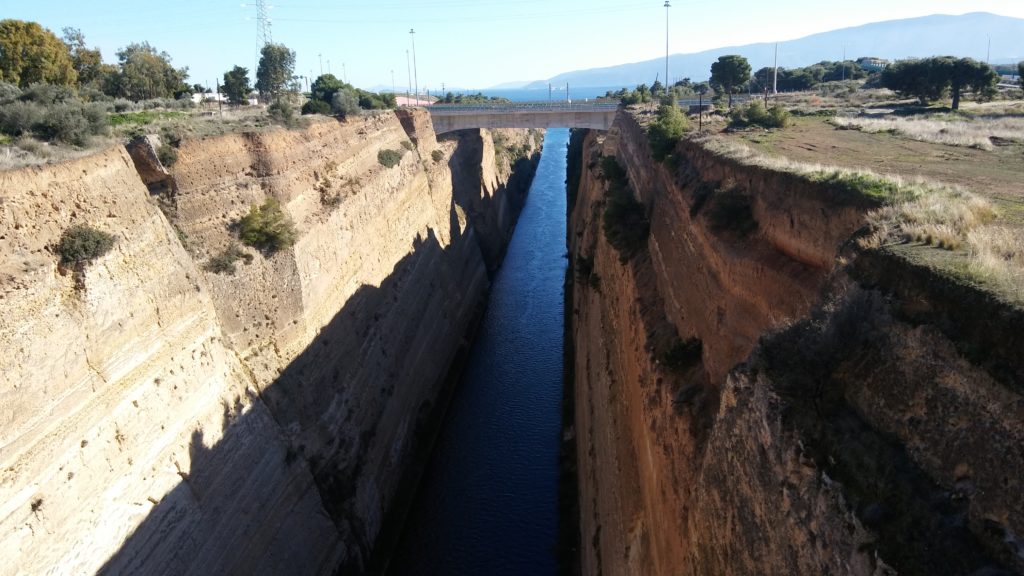
If you’re visiting Nafplio by car from Athens, a little diversion from your route to see the Corinth Canal (Isthmos Korinthou) is well worth your trouble! Just follow signs to ‘Isthmos’ or ‘Loutraki’. Here’s a post about an exciting little cruise I’ve had across the canal that’ll tell you all you need to know if you’d like to experience it too!
Places of interest near Nafplio include the seaside town of Tolo and the ancient theatre (and the museum) of Epidavros (Epidaurus). If you’re traveling by car, you can drive back to Athens via Epidavros and the village of Ligourio (Lygourio), that is, if you don’t mind an old scenic route as opposed to the new highways.
Ligourio is before (and close to) the ancient theatre of Epidavros as you leave Nafplio – many visitors stop there for lunch. Plenty of fine tavernas on offer.
If you have more days to explore, the ancient sites of Mykenae and Tiryns are great choices for the archeology enthusiasts.
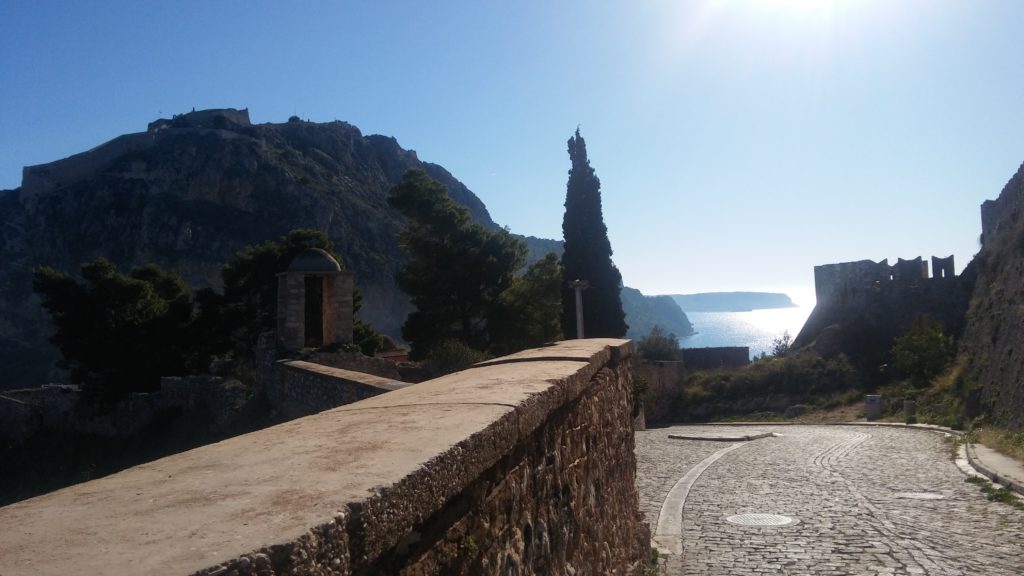
Have you visited Nafplio? Would you like to offer a tip, share a memory, or ask a question? I look forward to your comments!
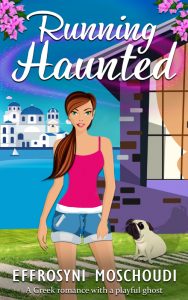
My supernatural rom com, Running Haunted, is set in Nafplio. Kelly ran a marathon and wind up running a house. With a ghost in it! Check it out on Amazon US UK
SPREAD THE WORD WITH A TWEET:
3 FREE books for you! Sign up below to receive them instantly!


For my delicious Greek recipes, go here.
